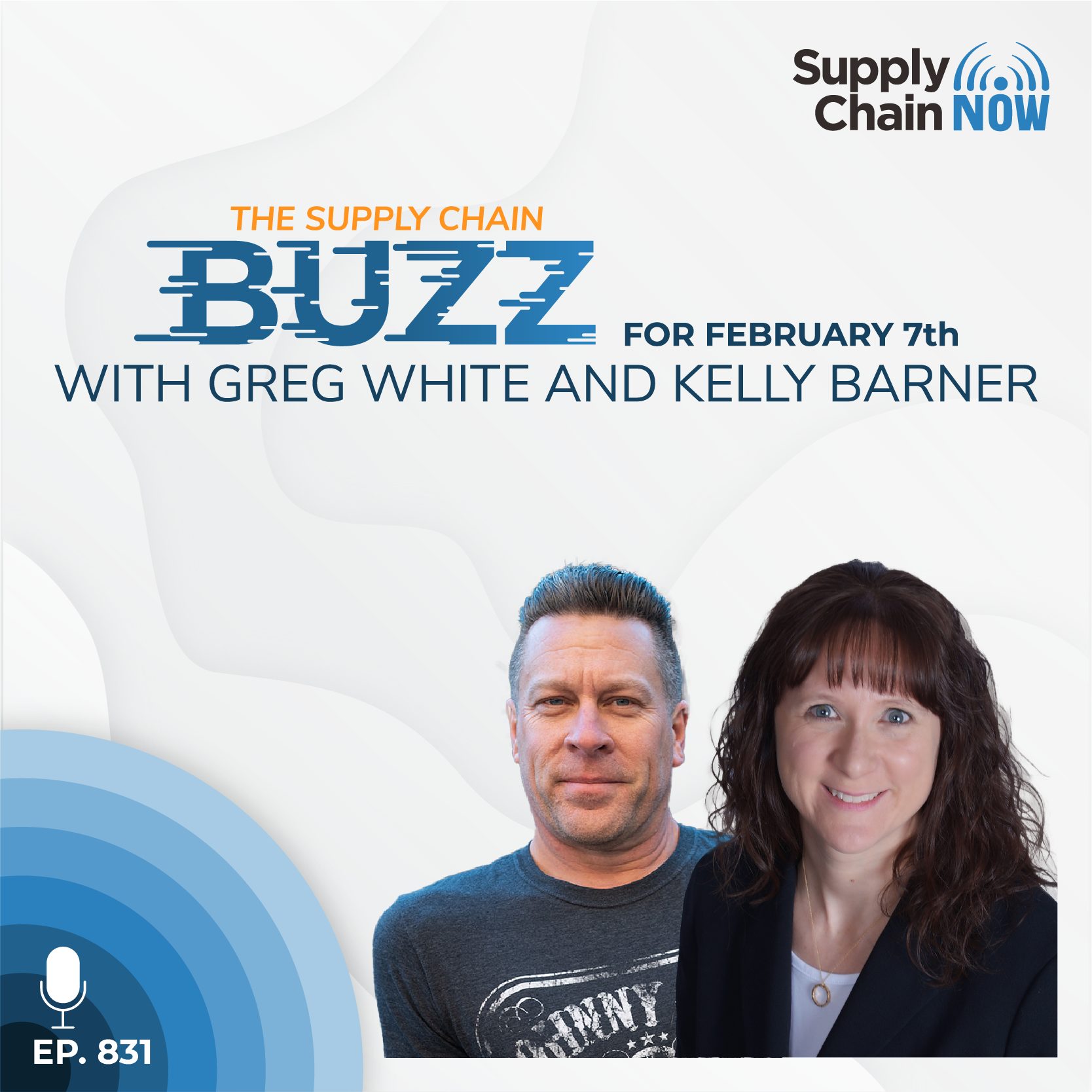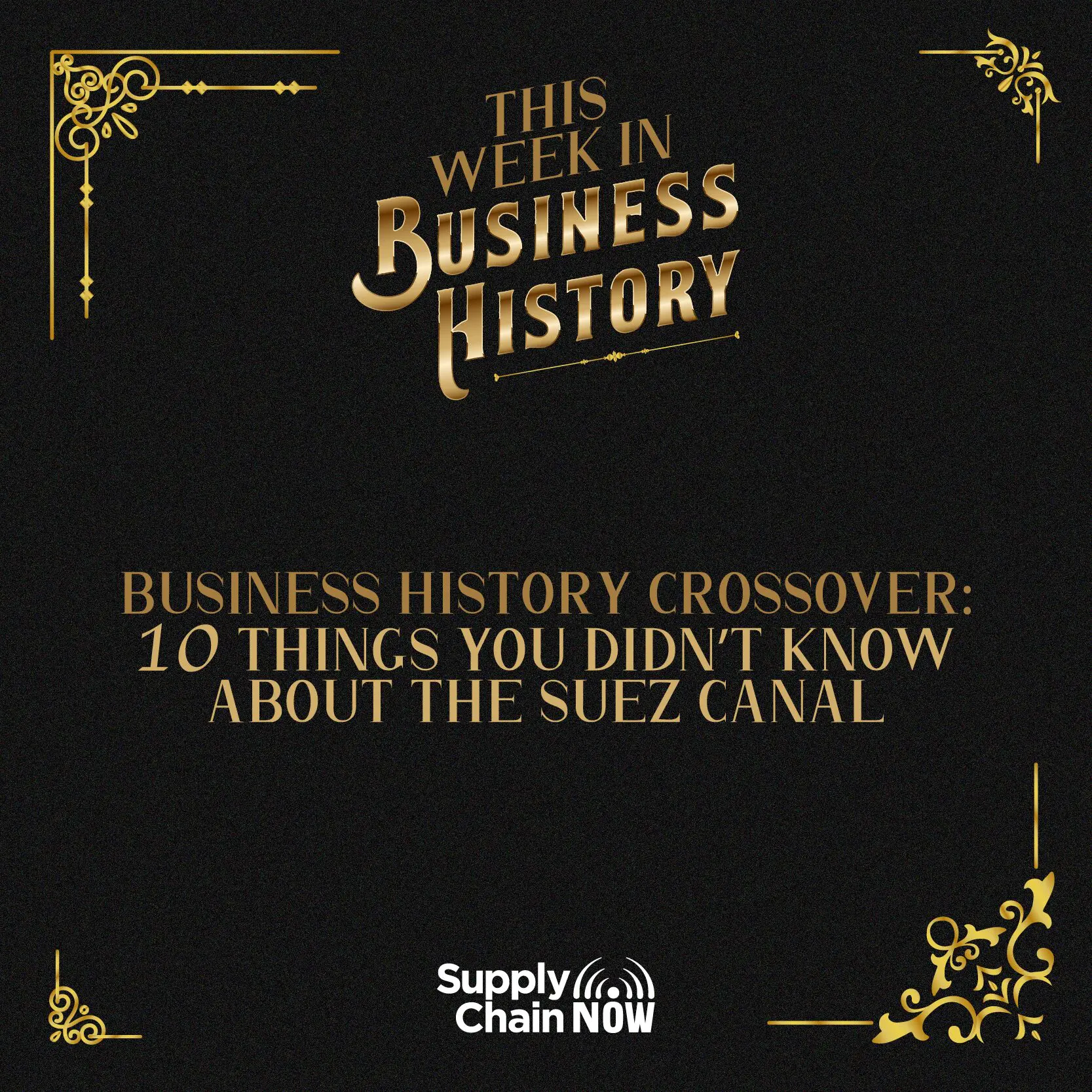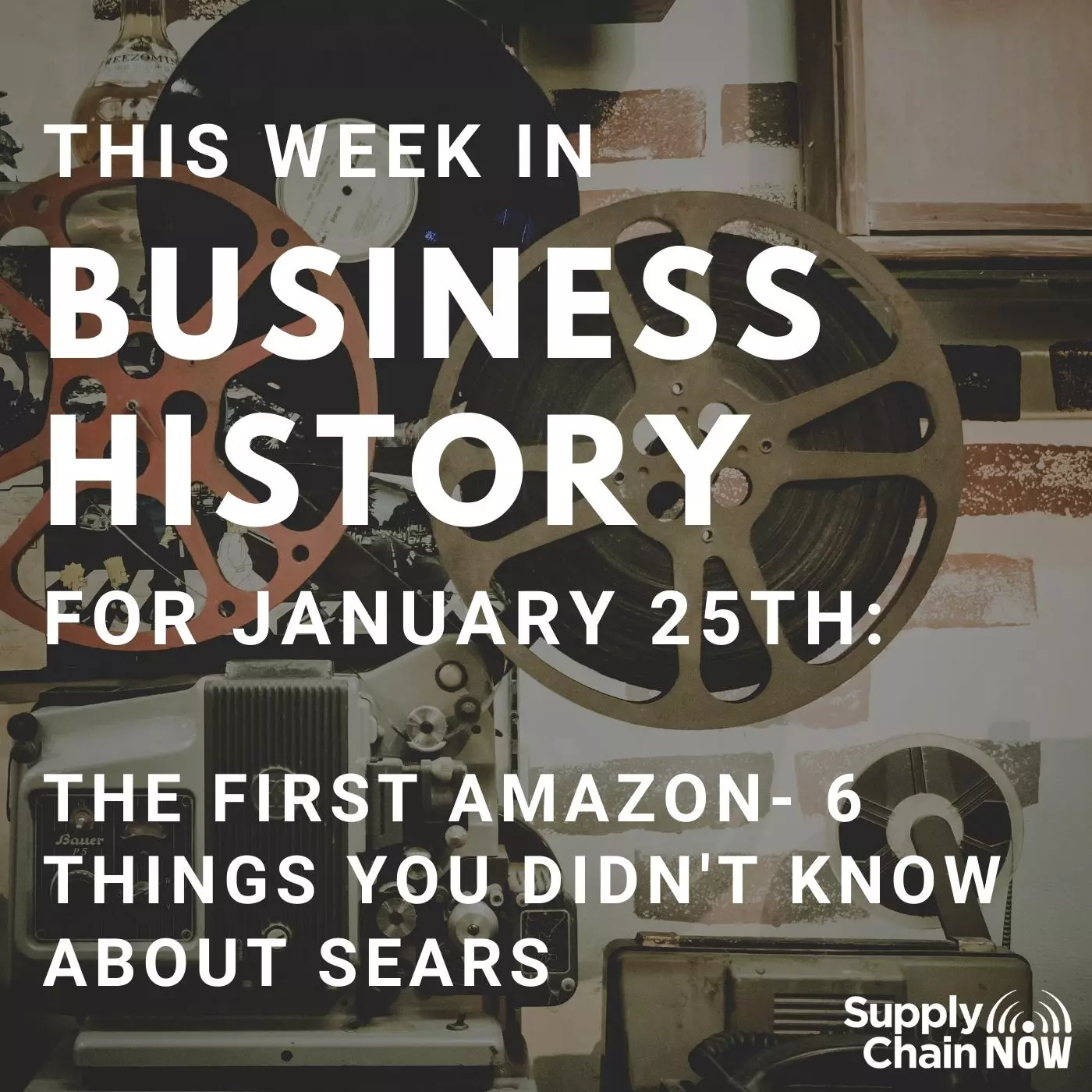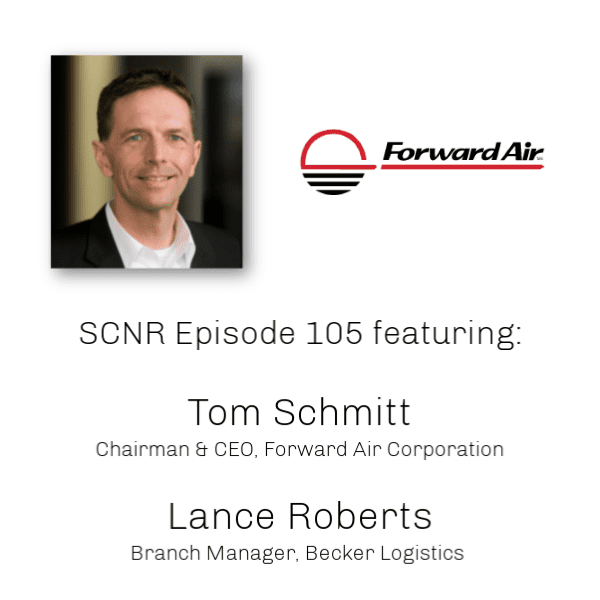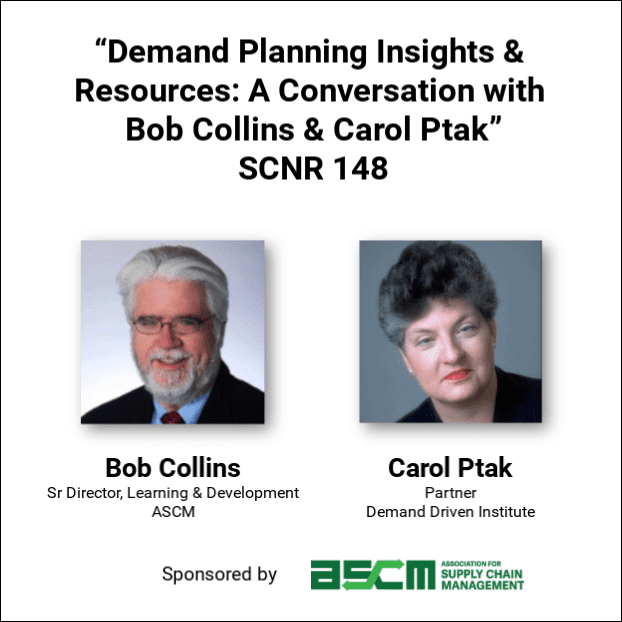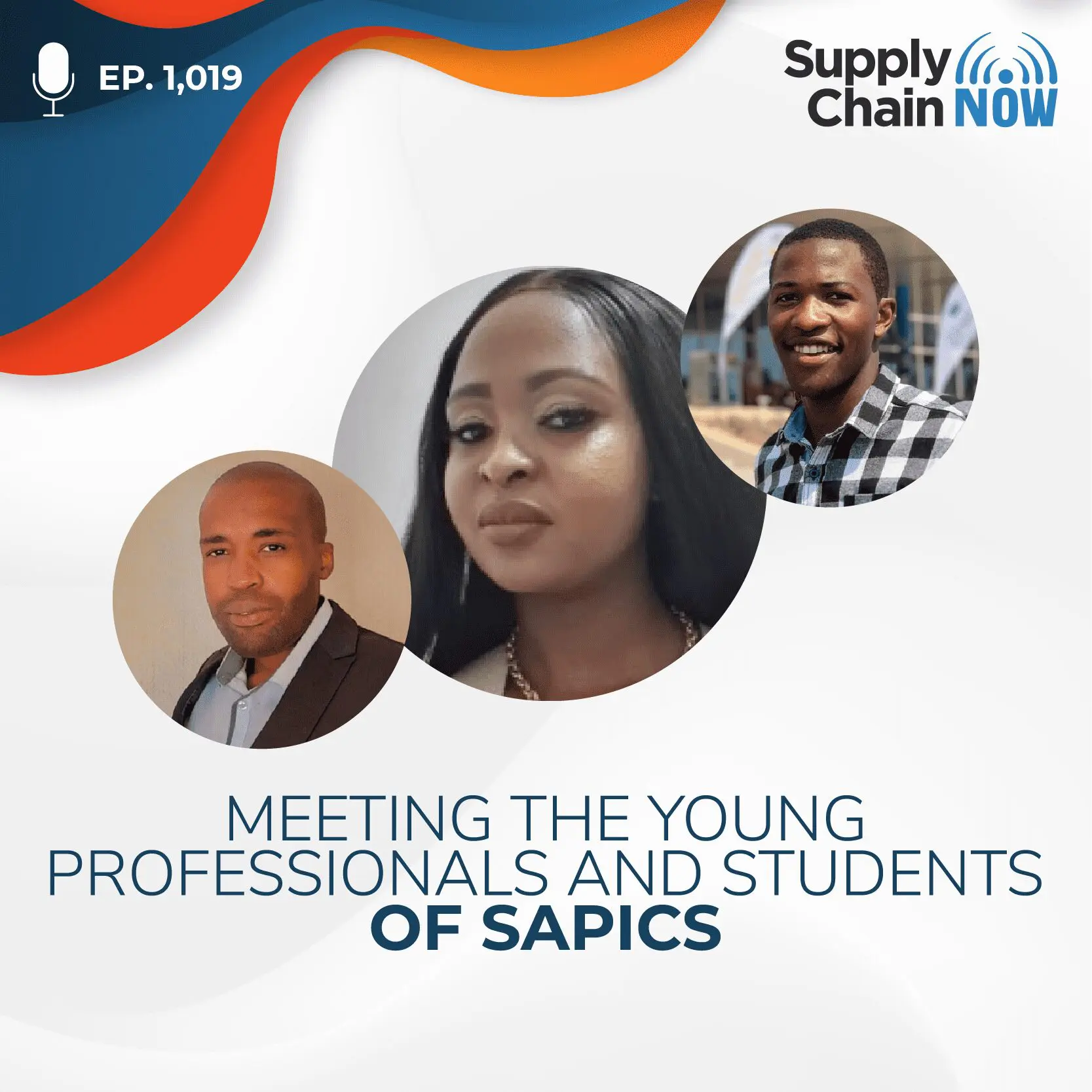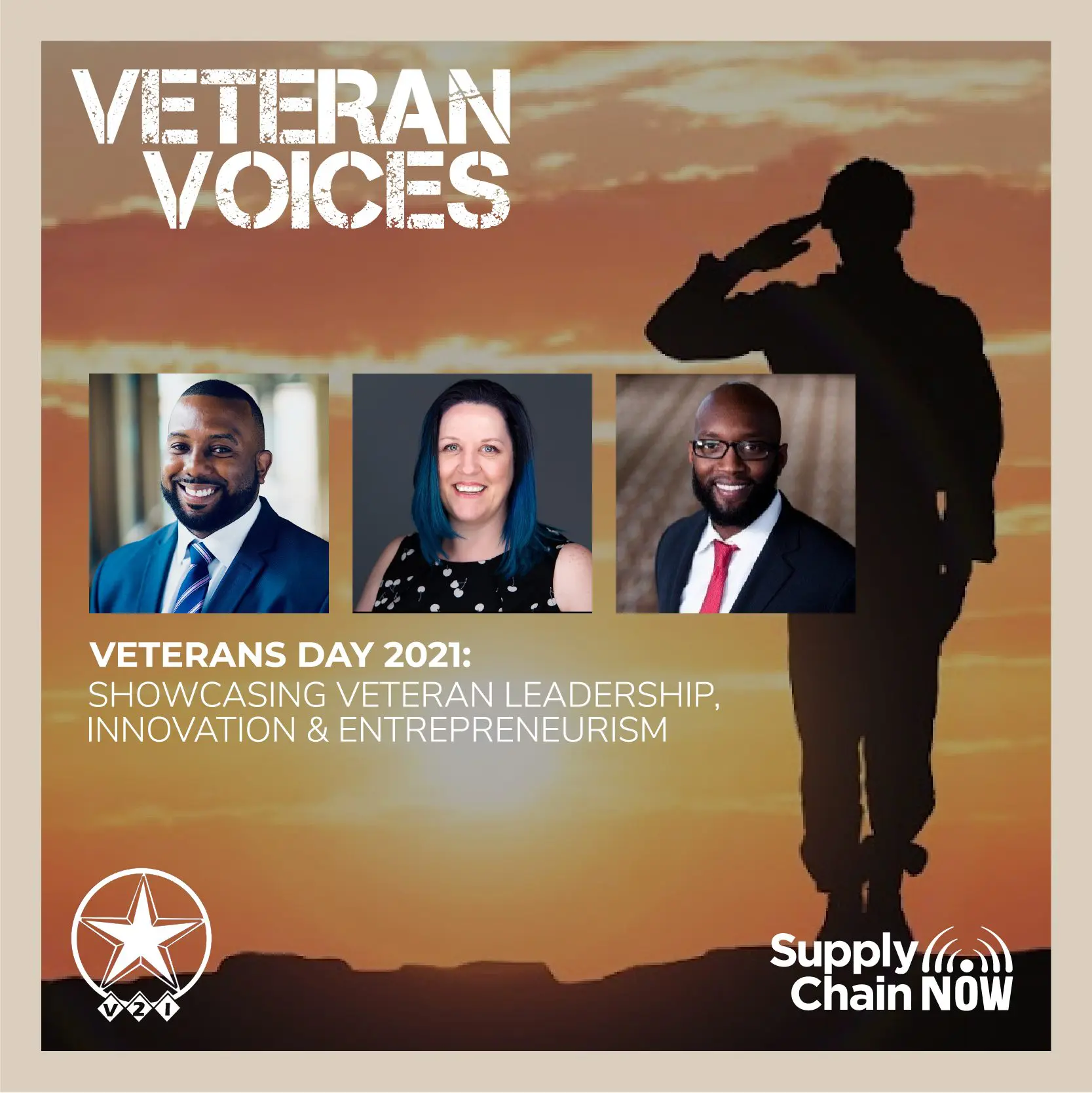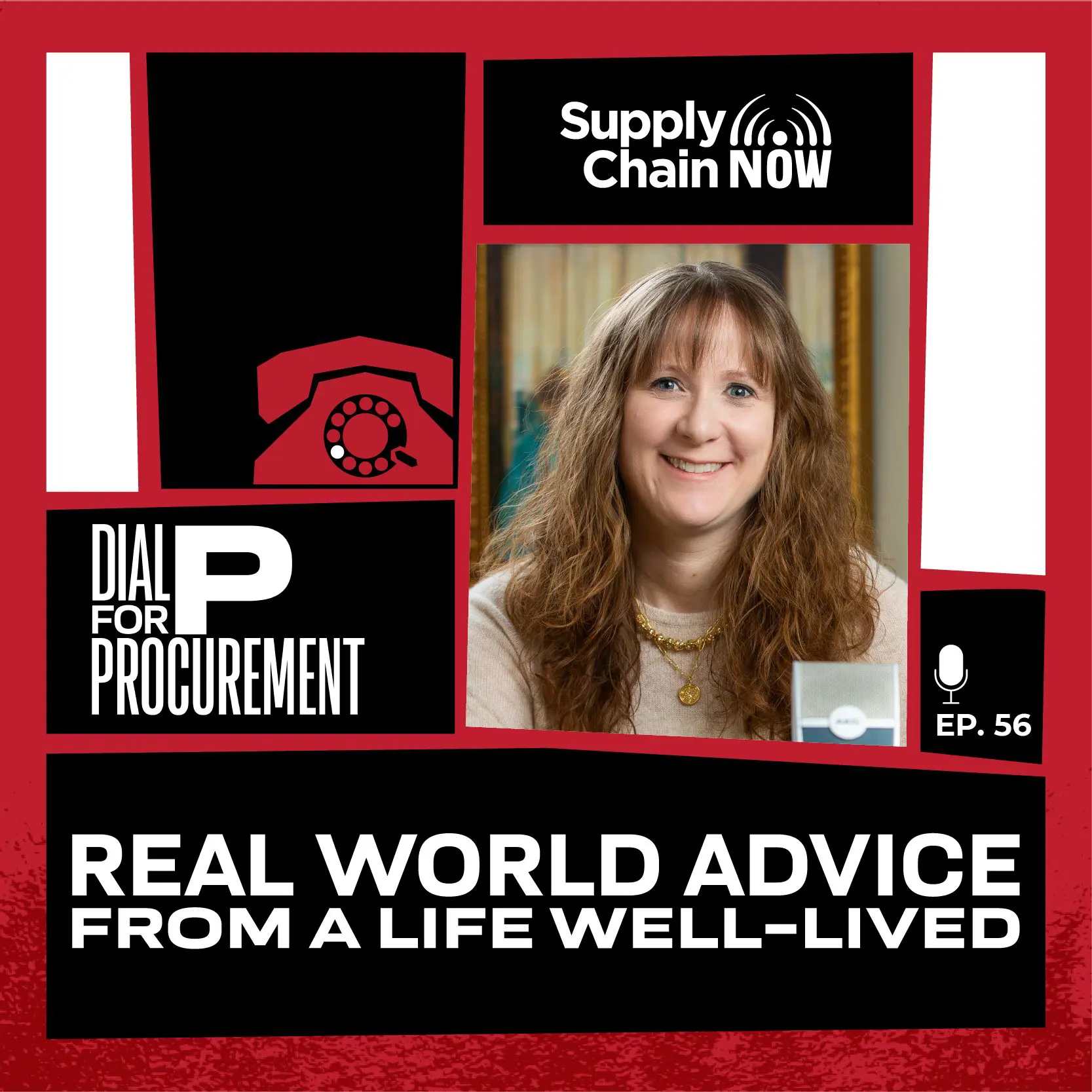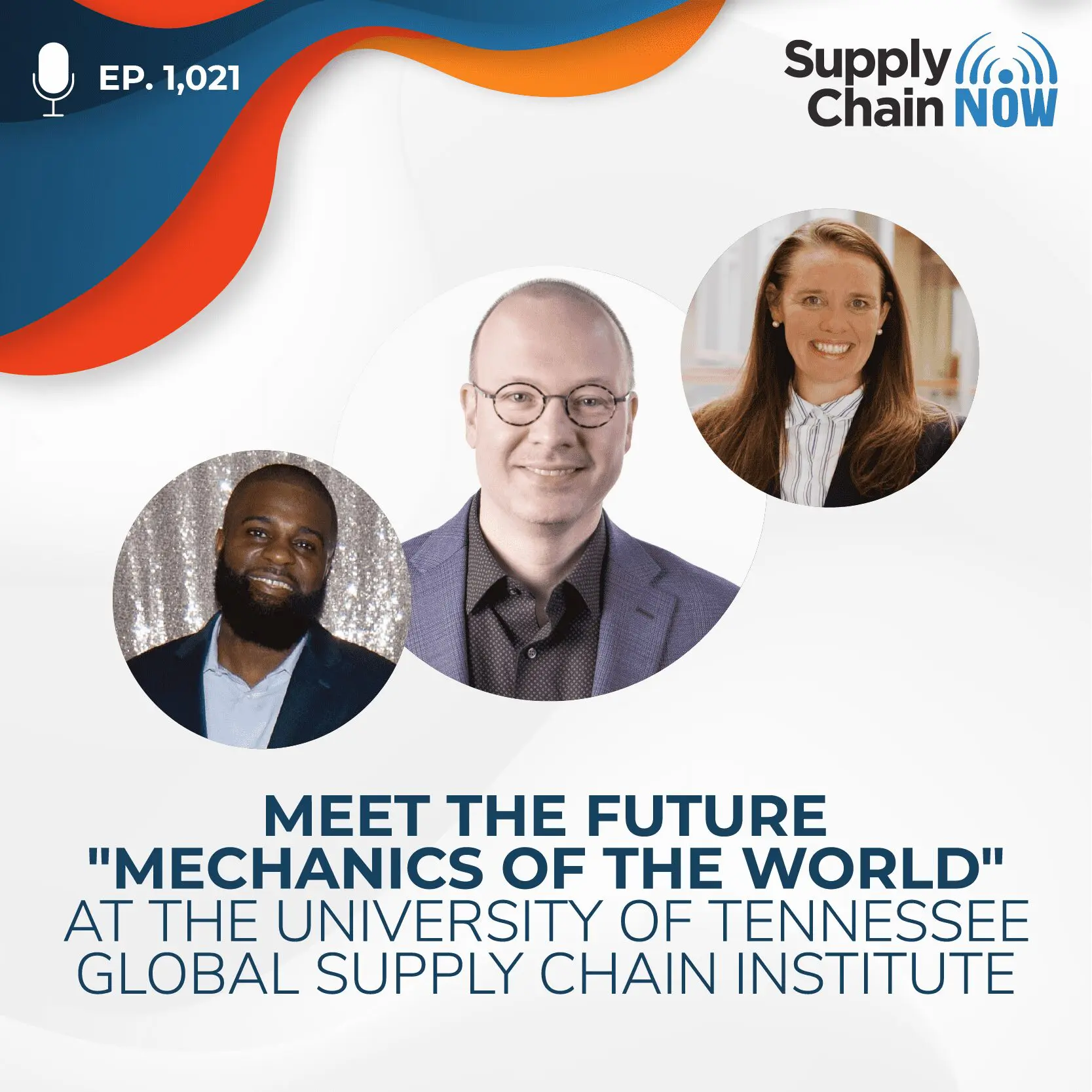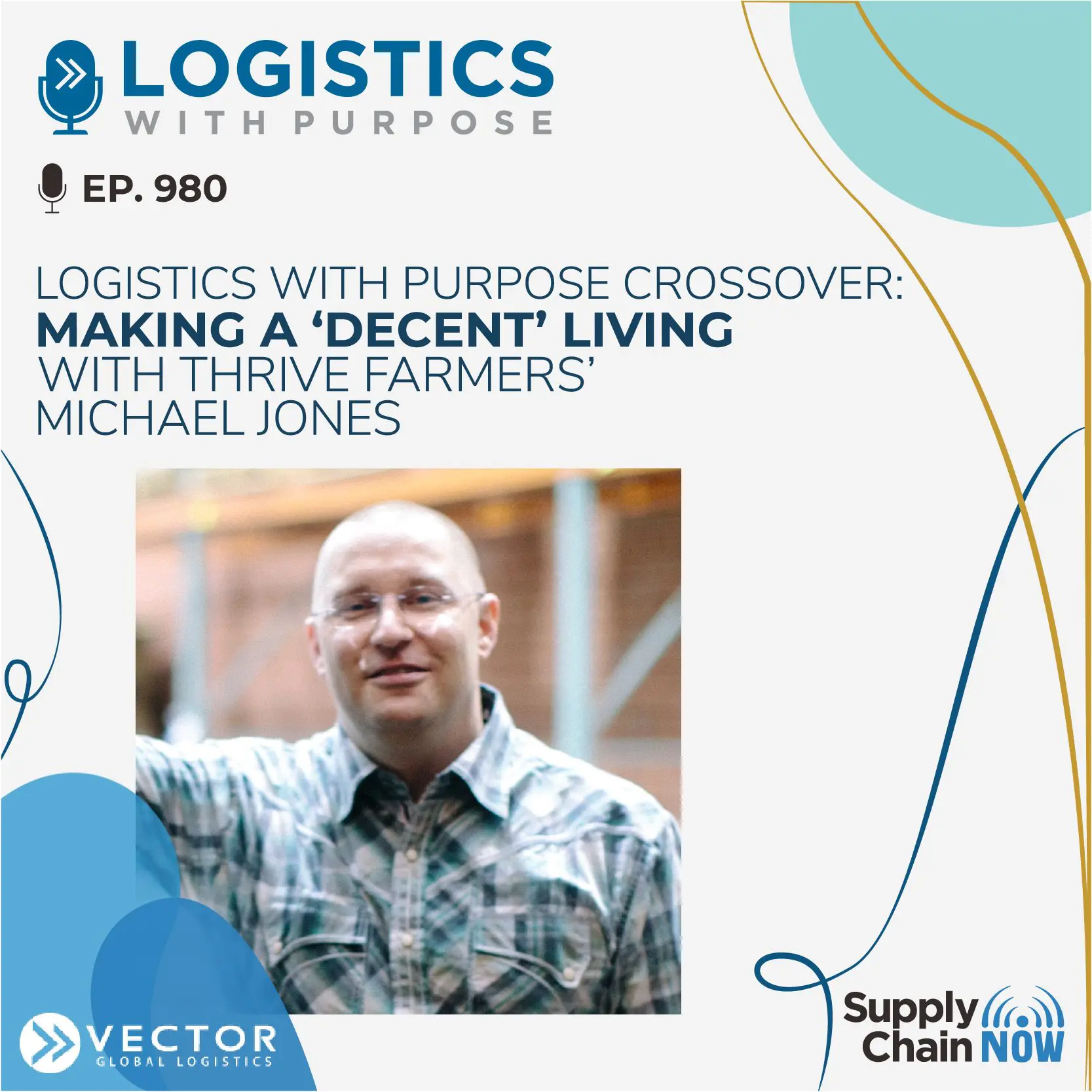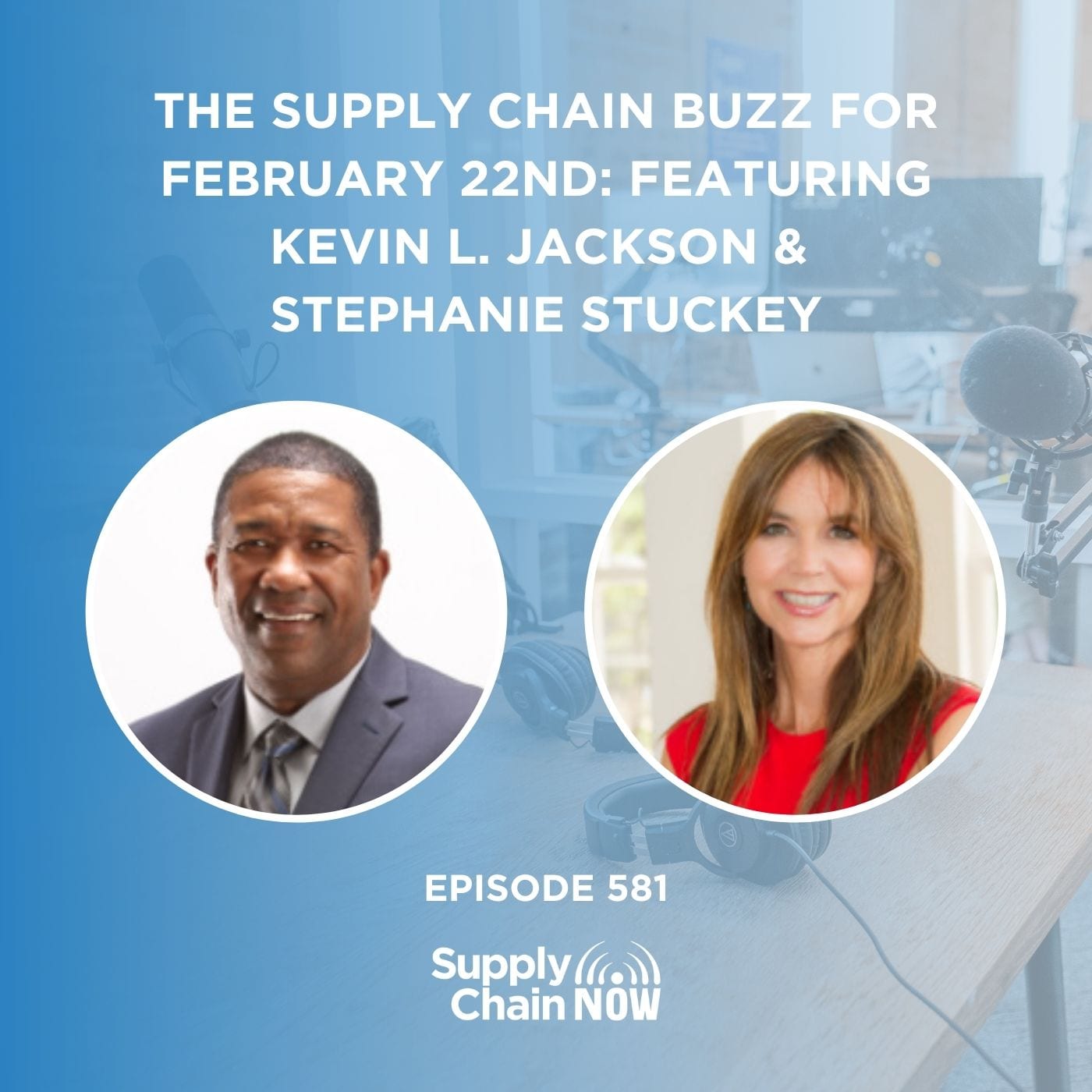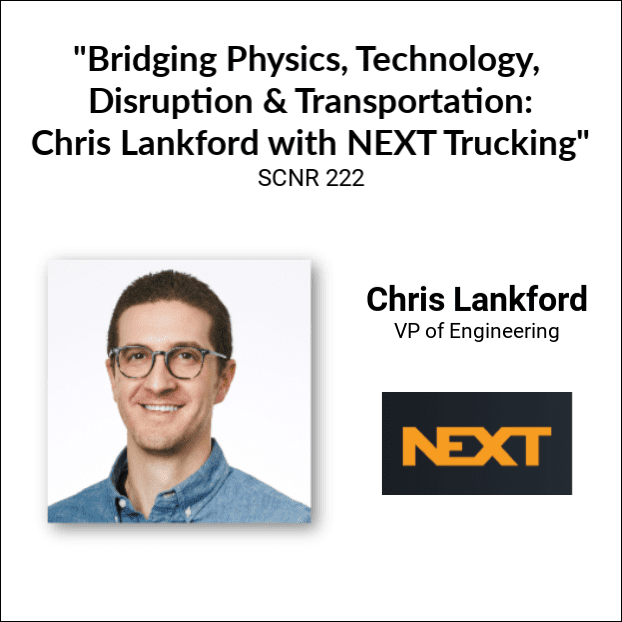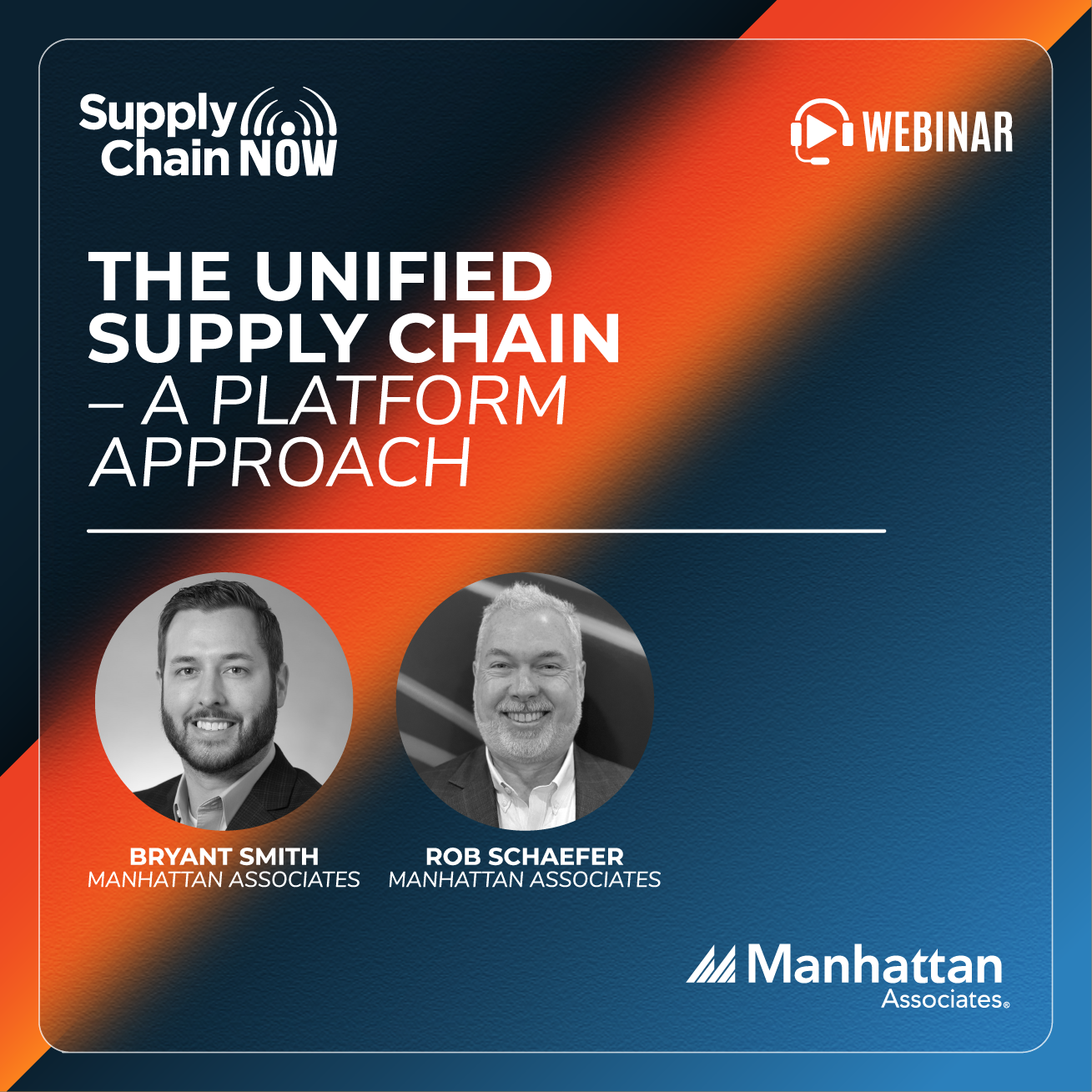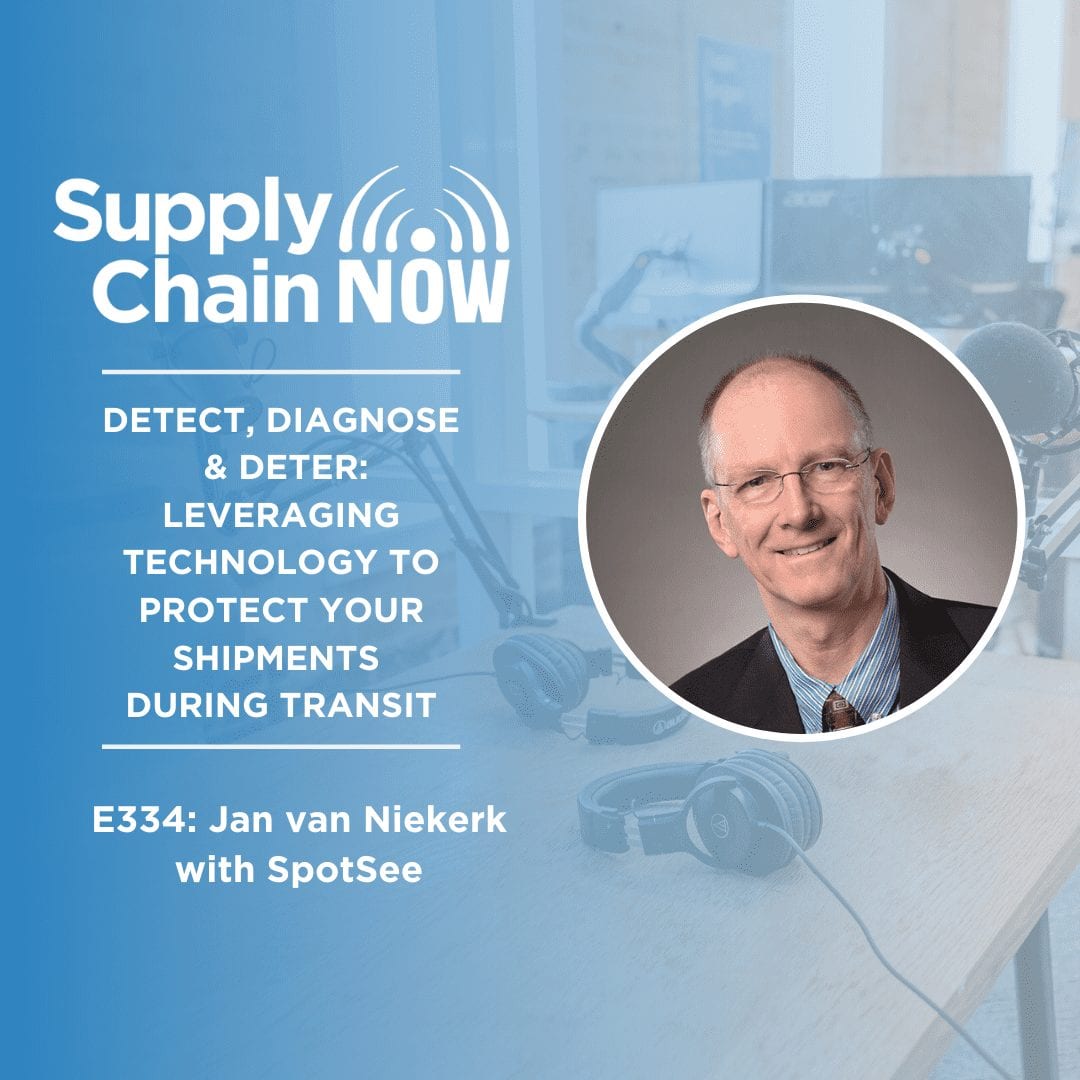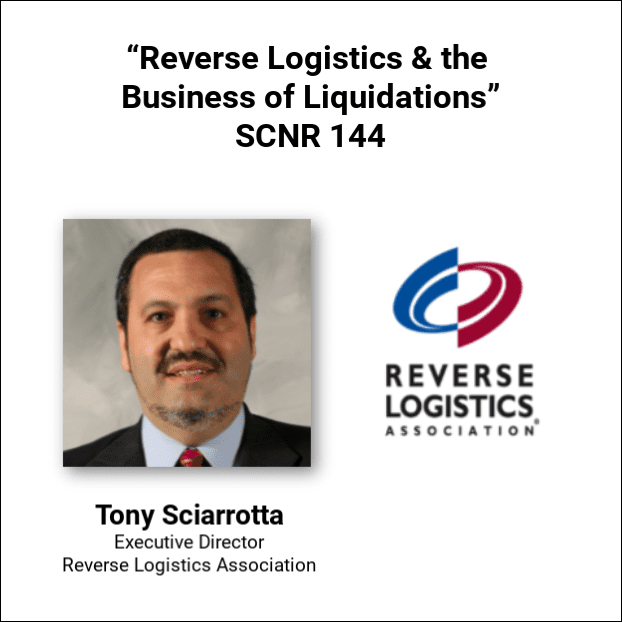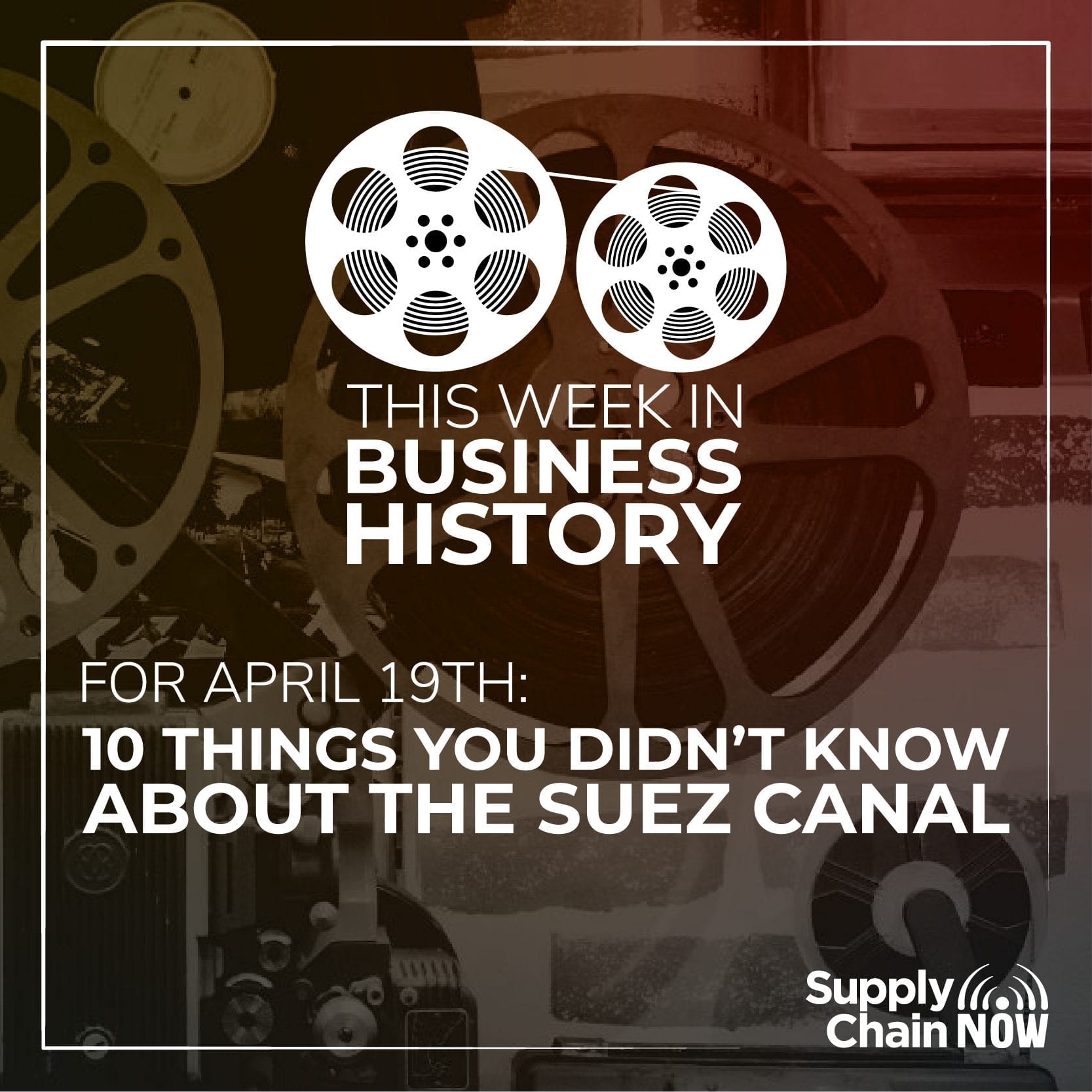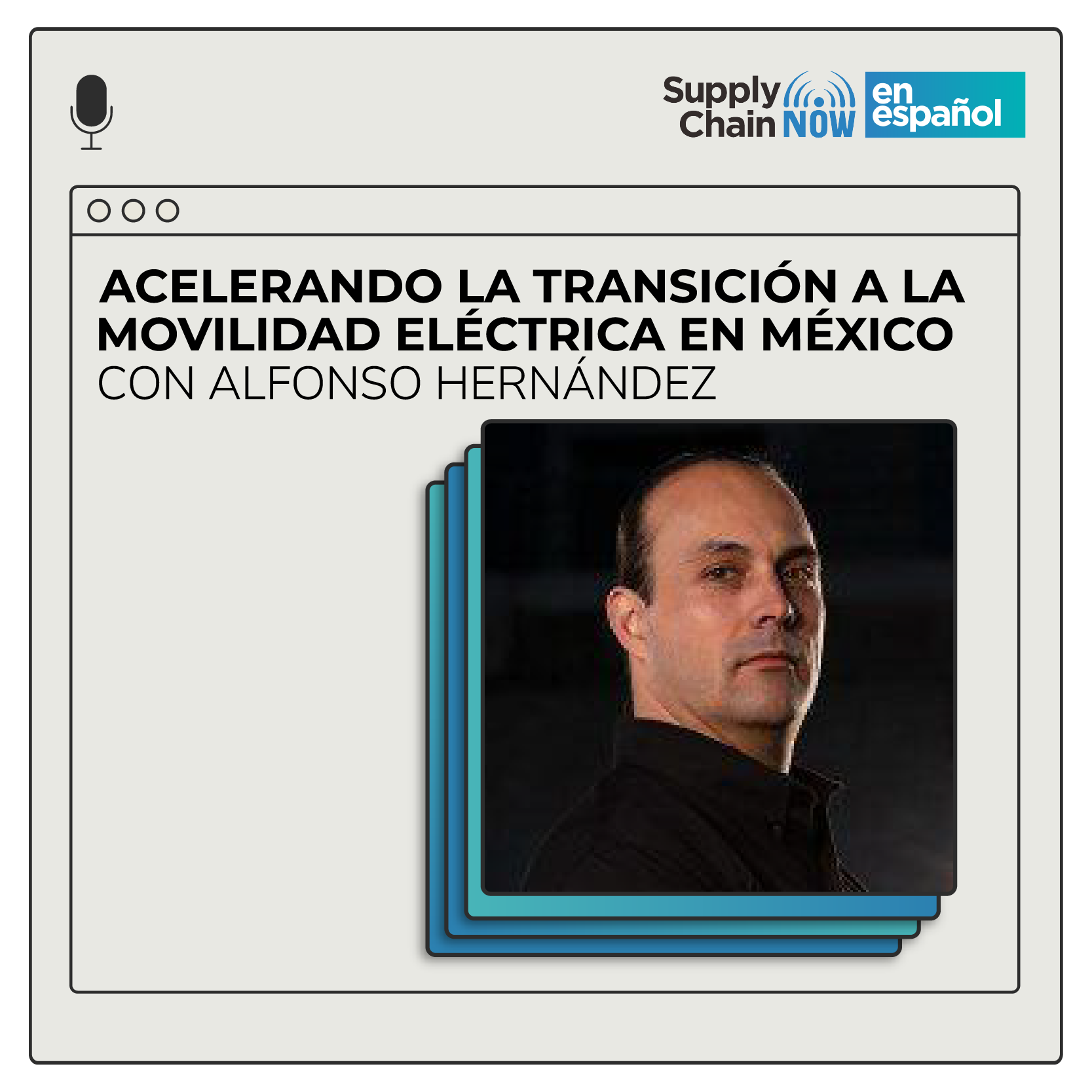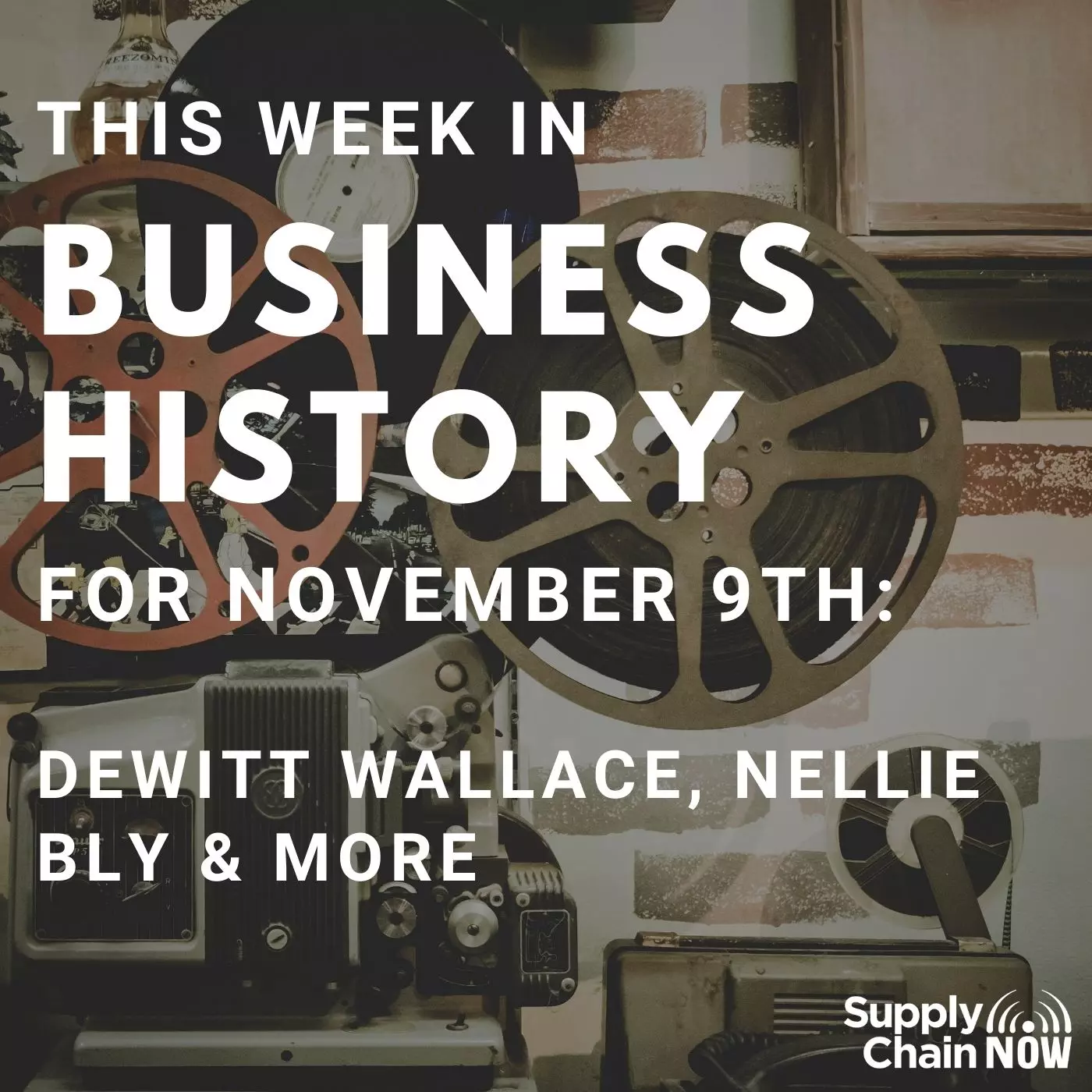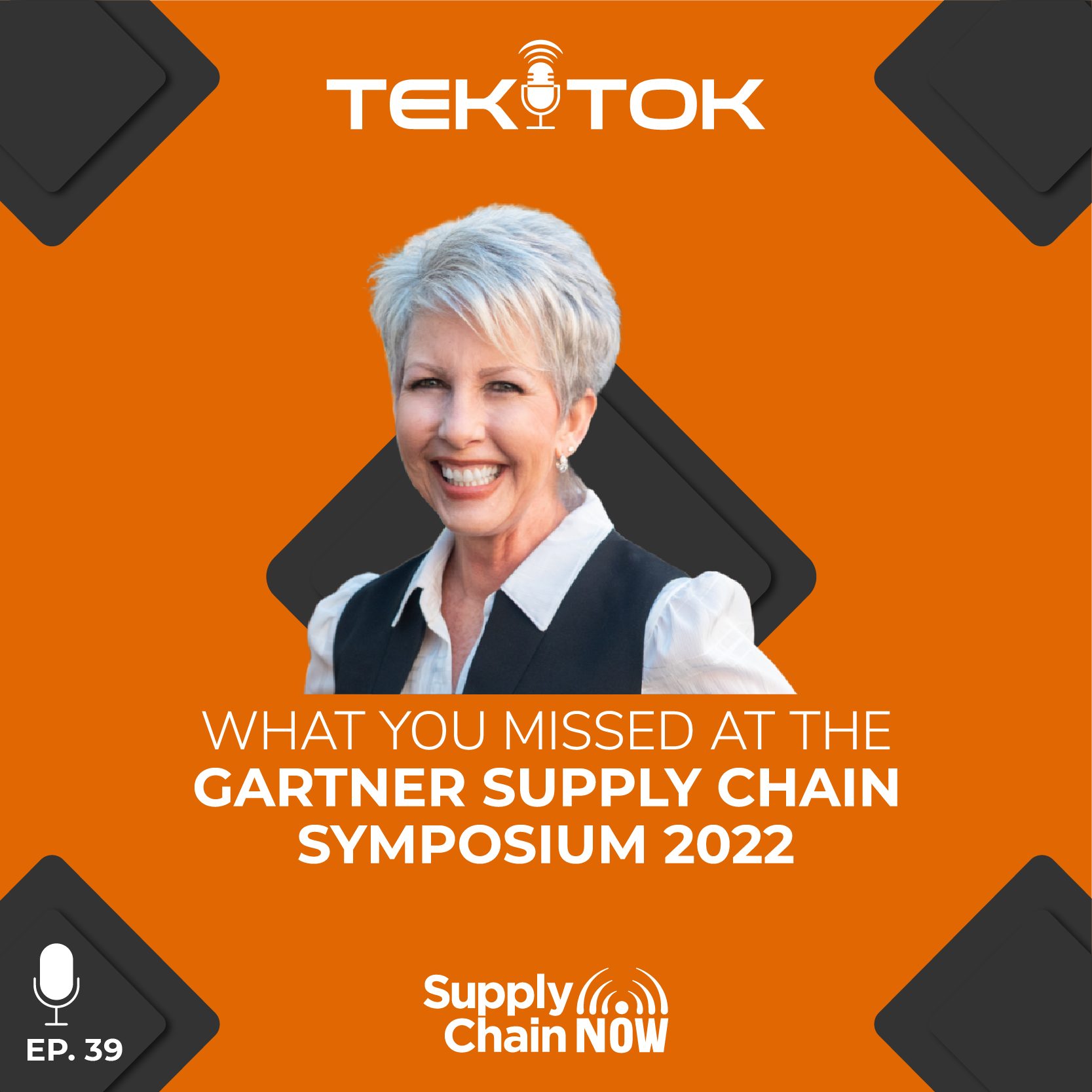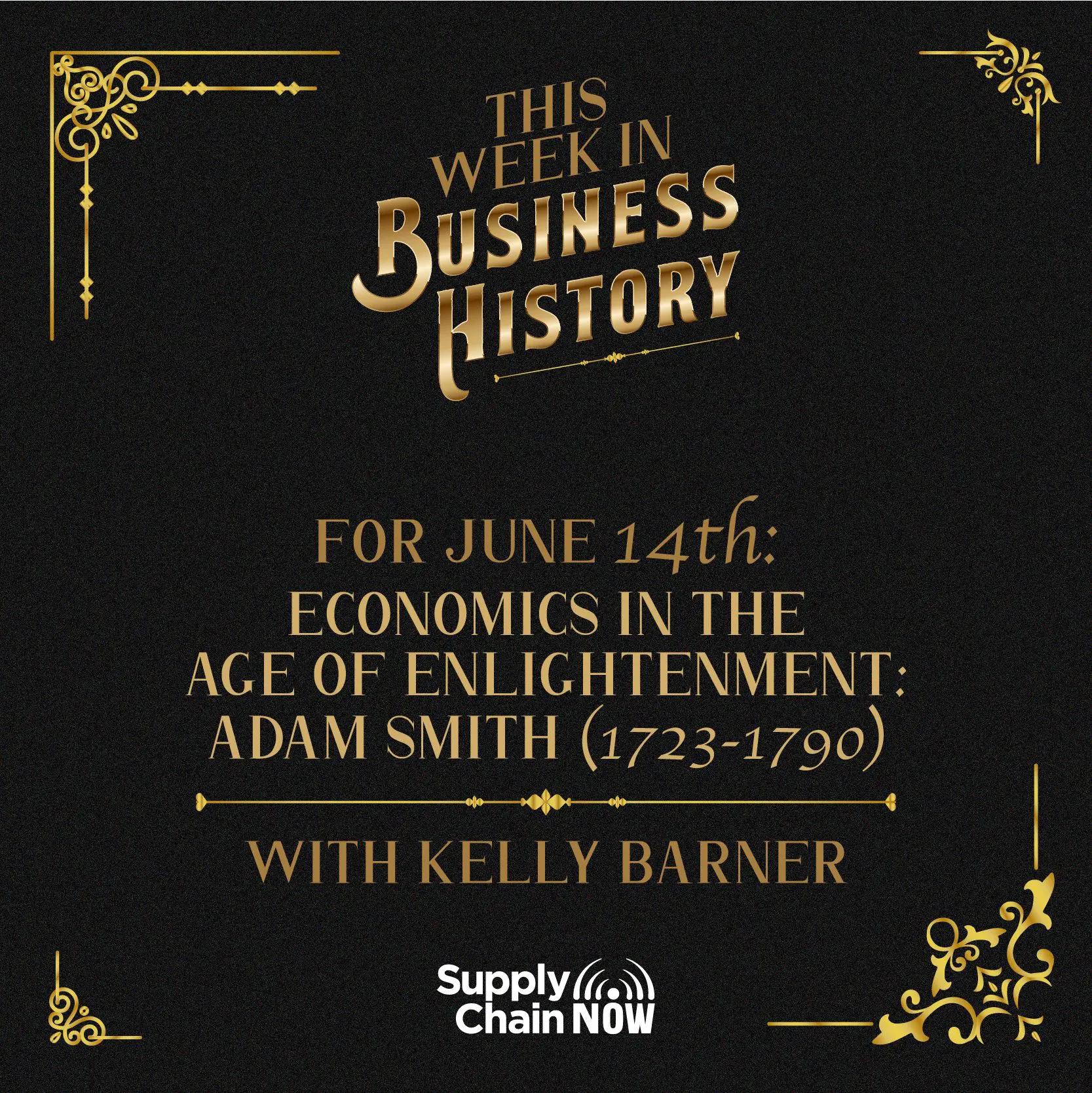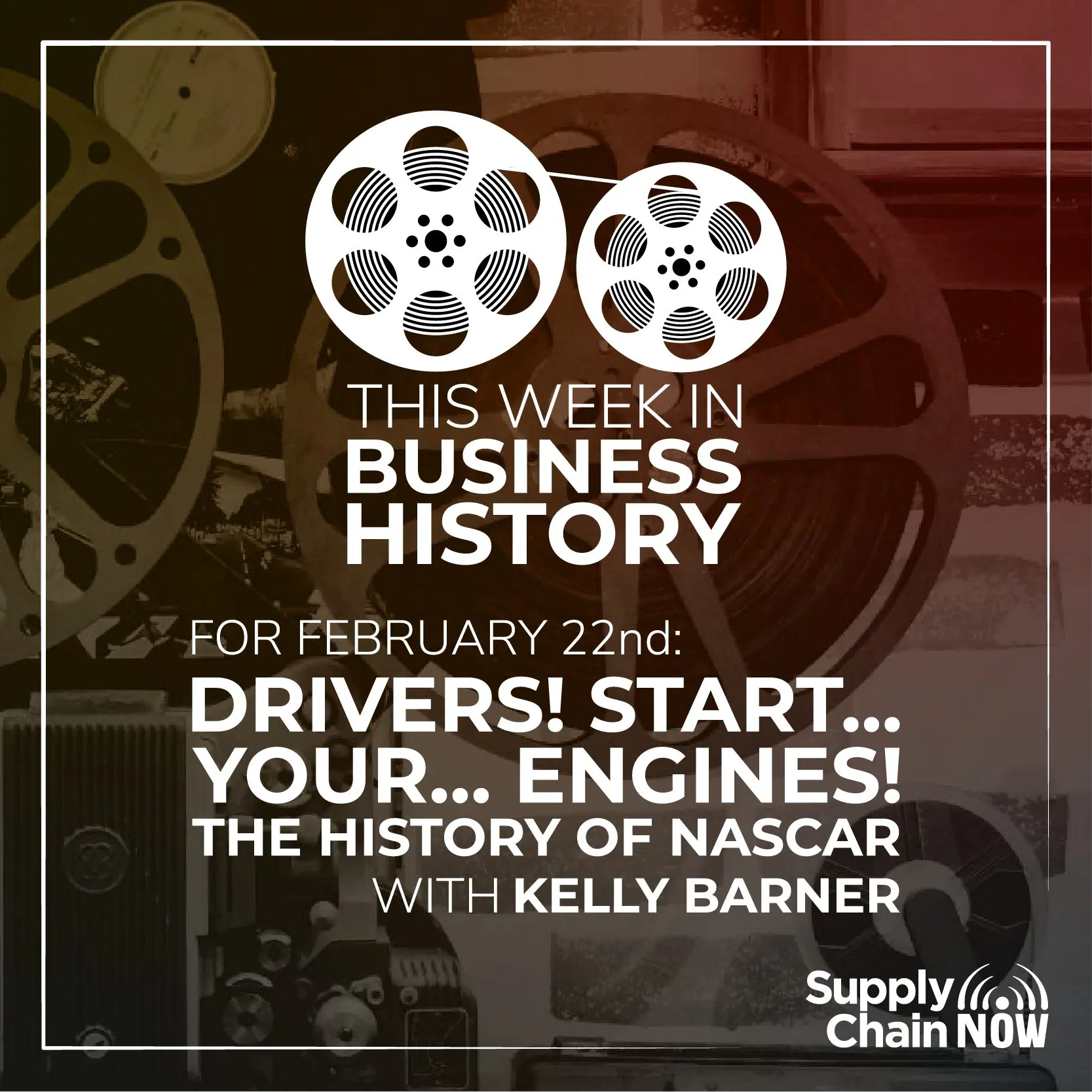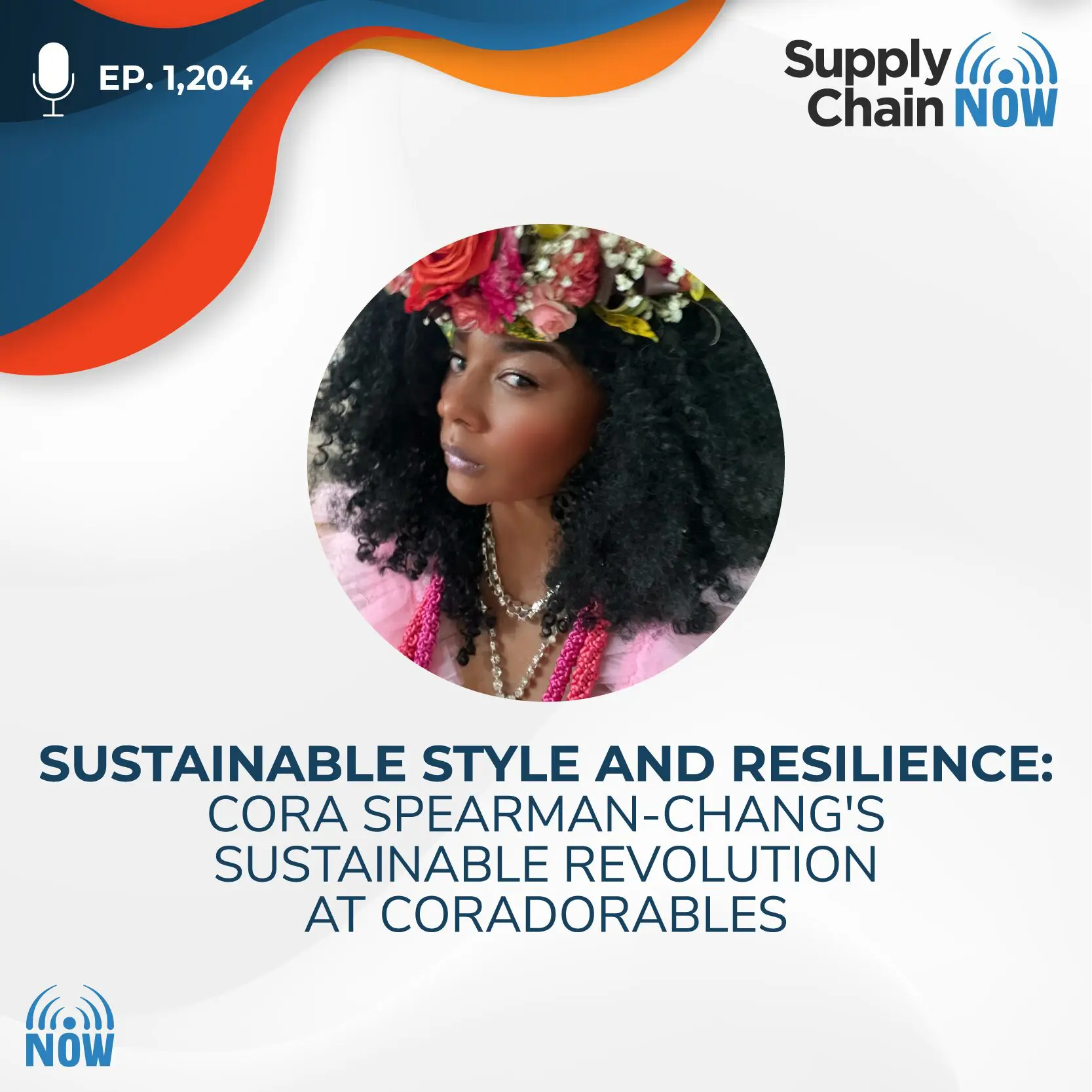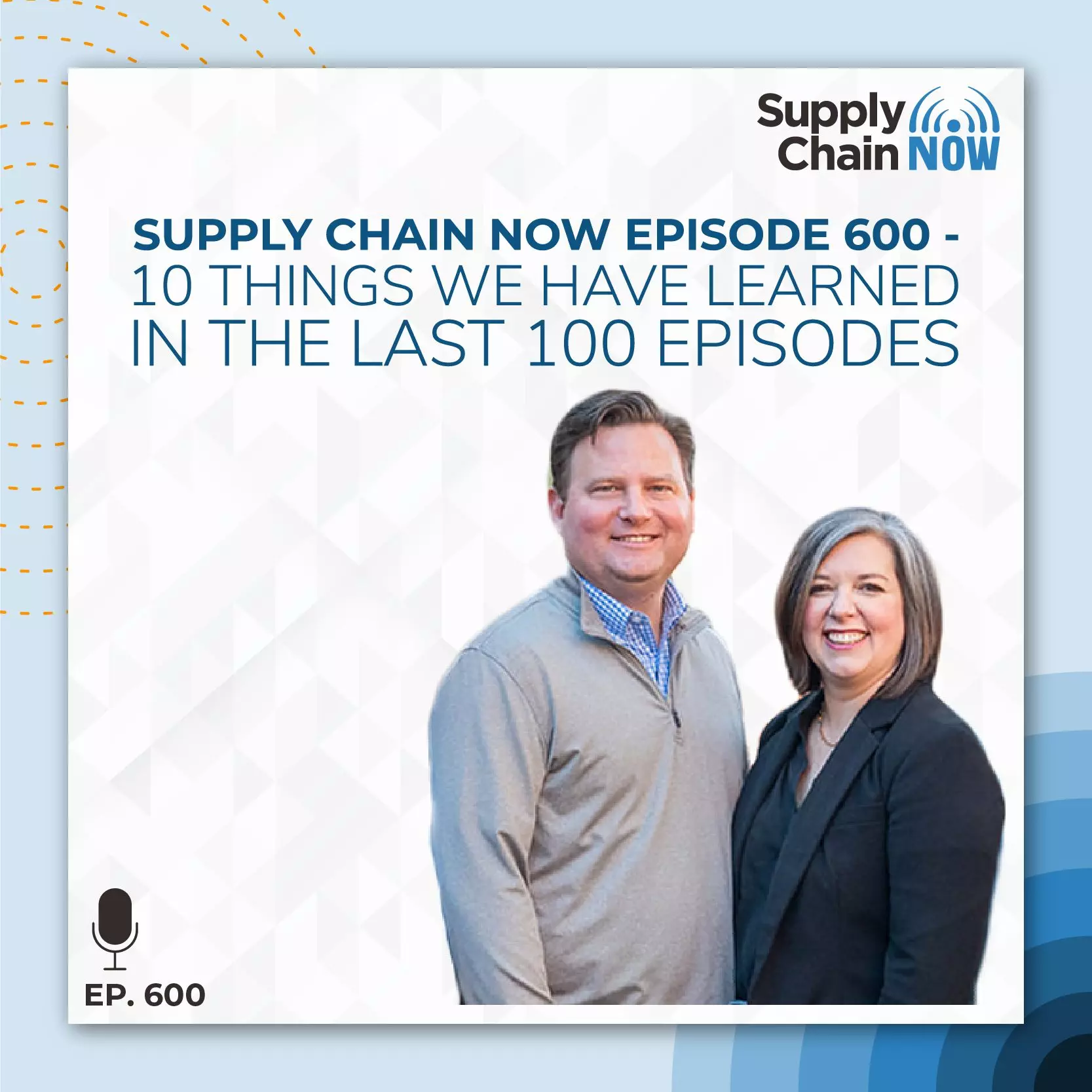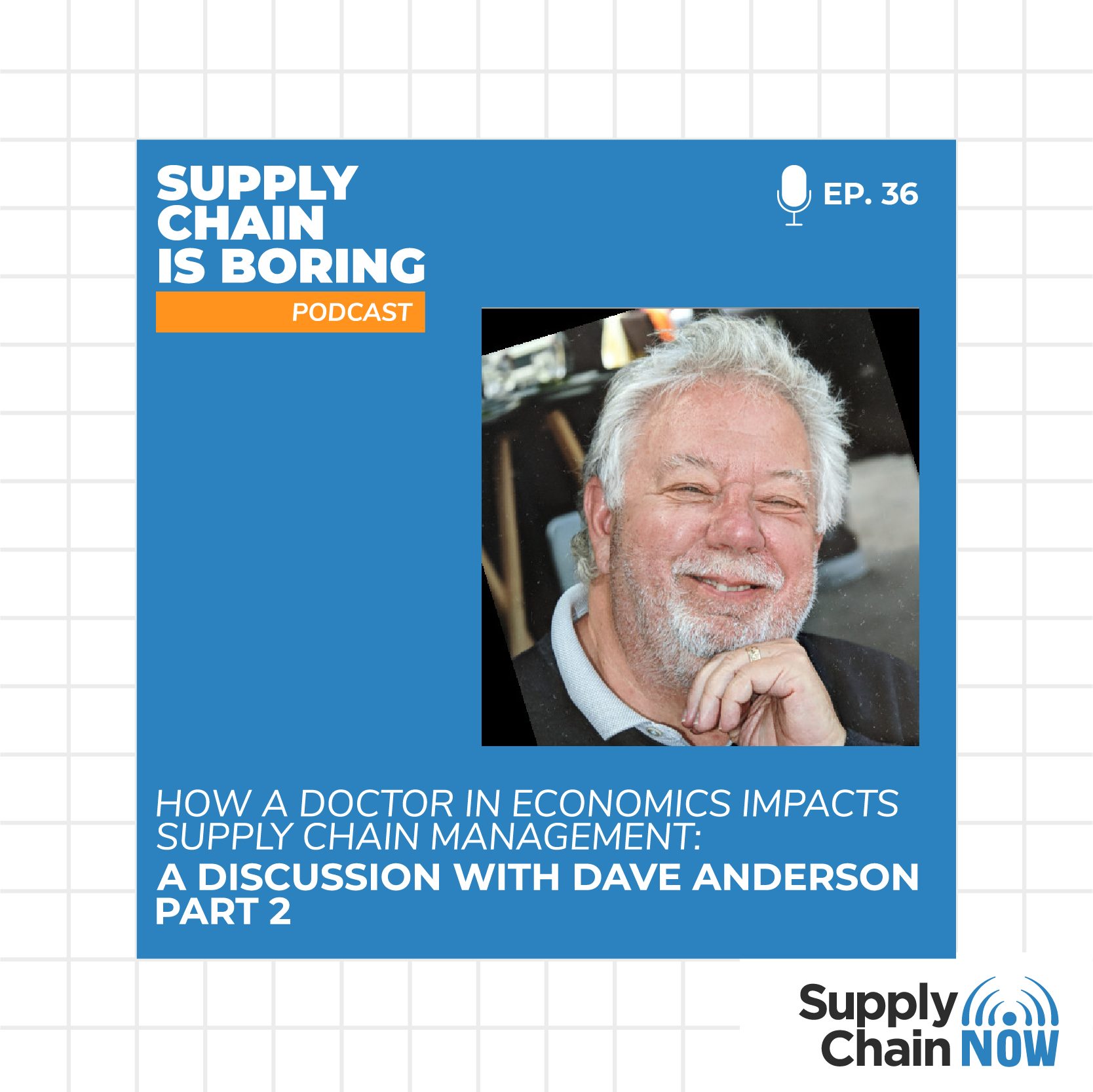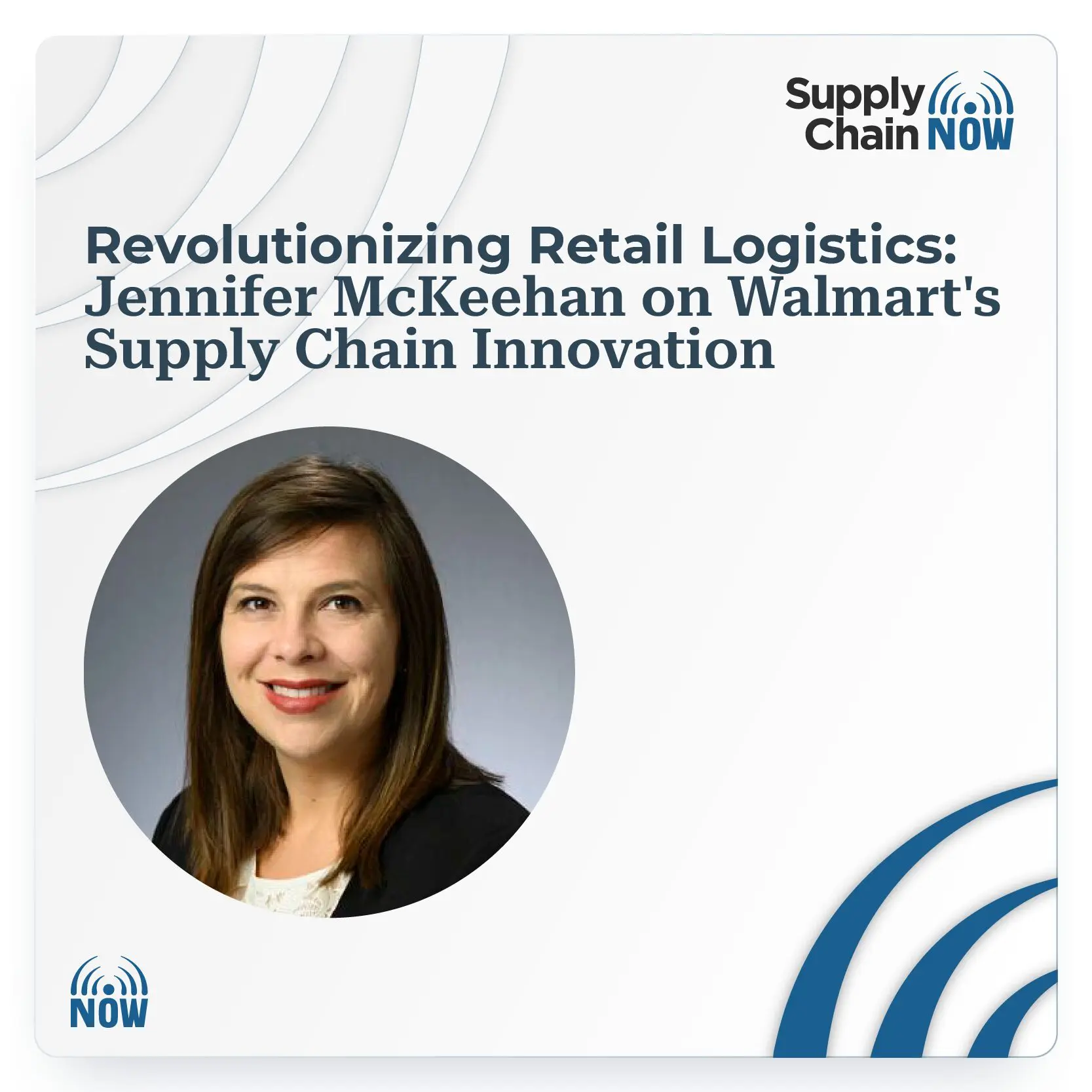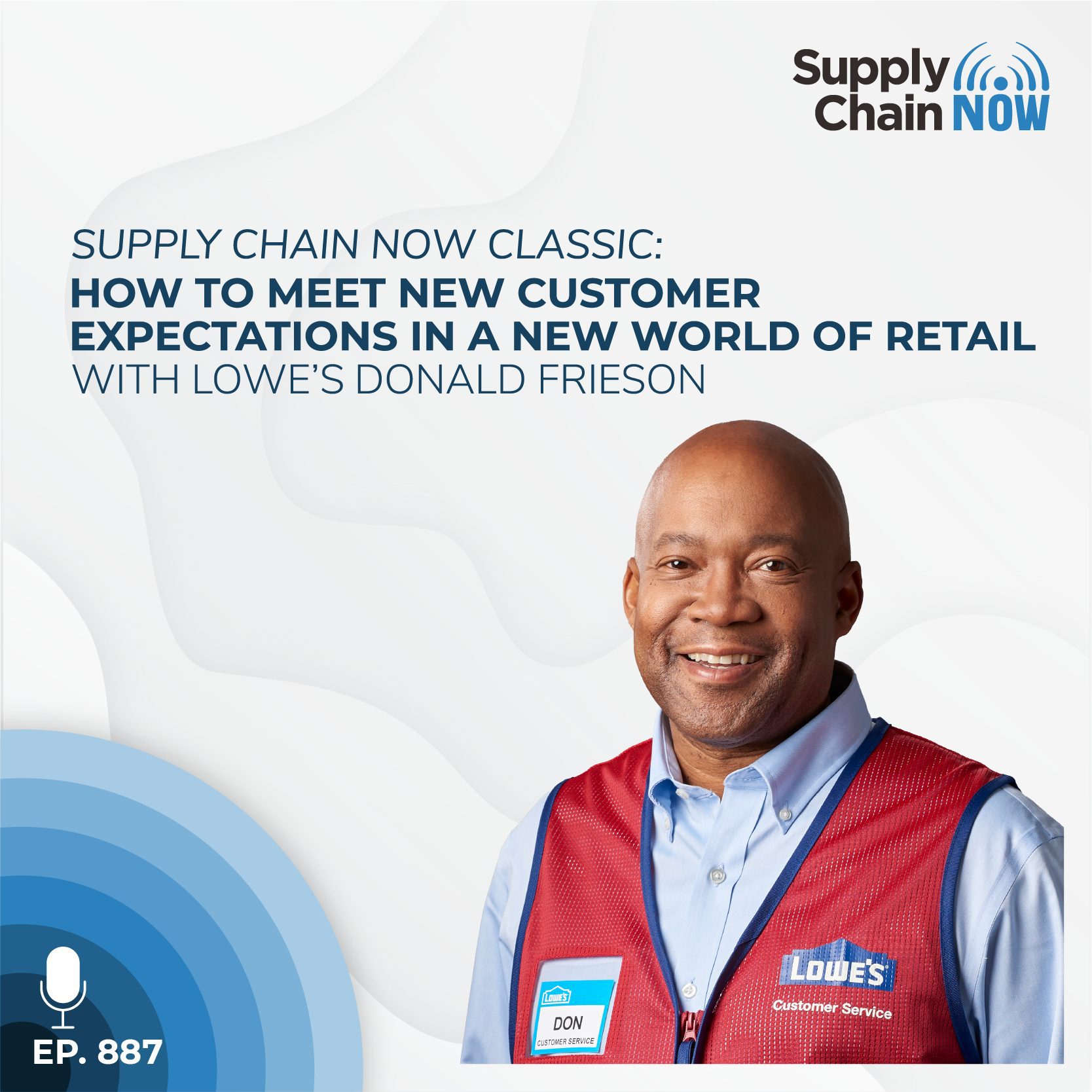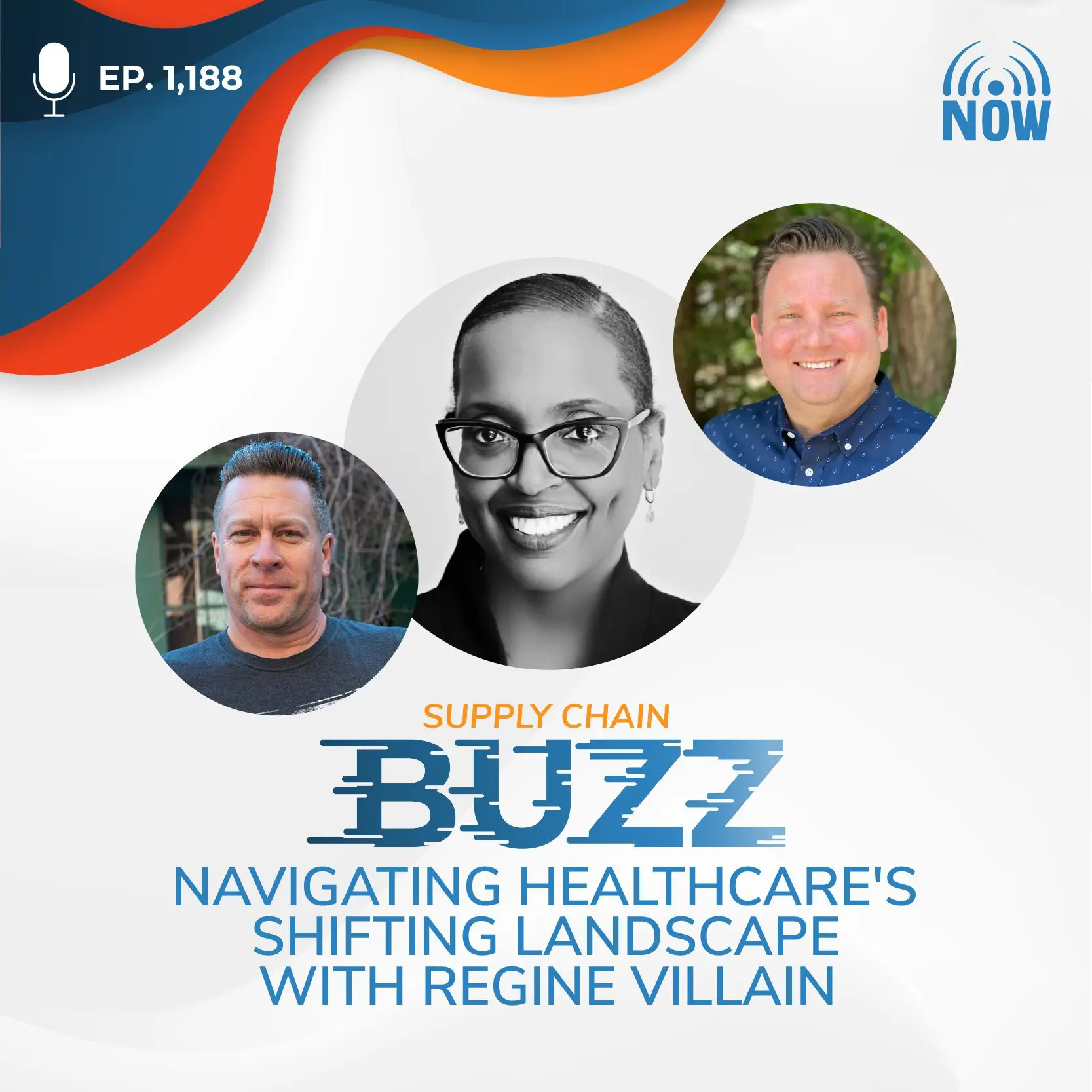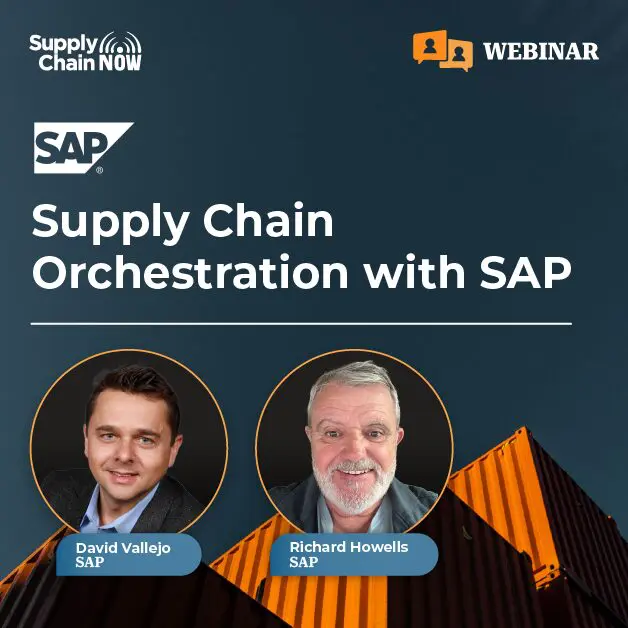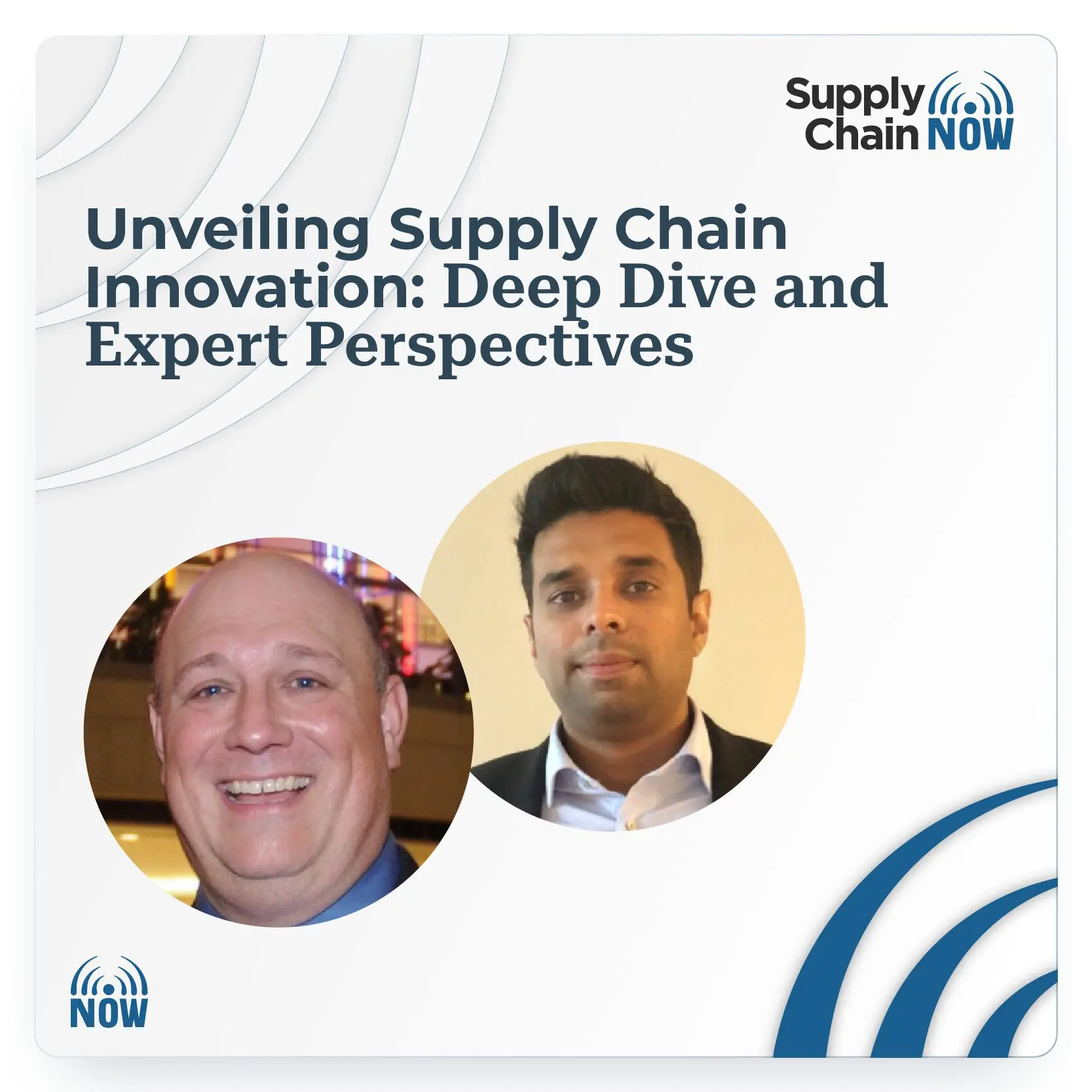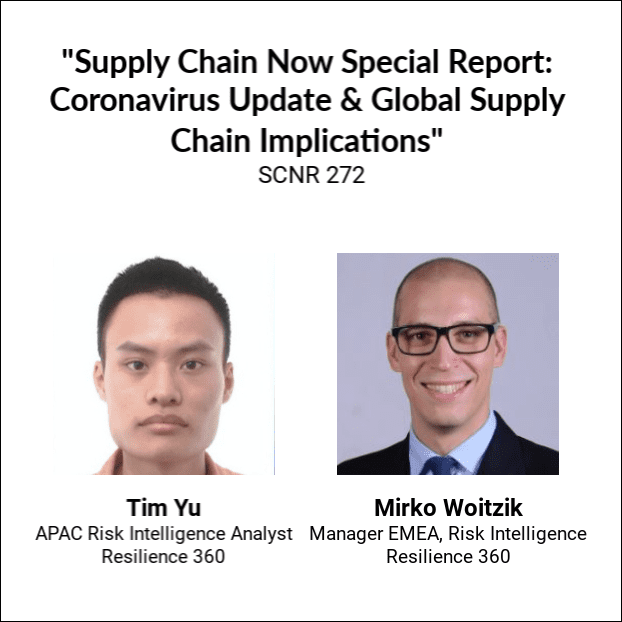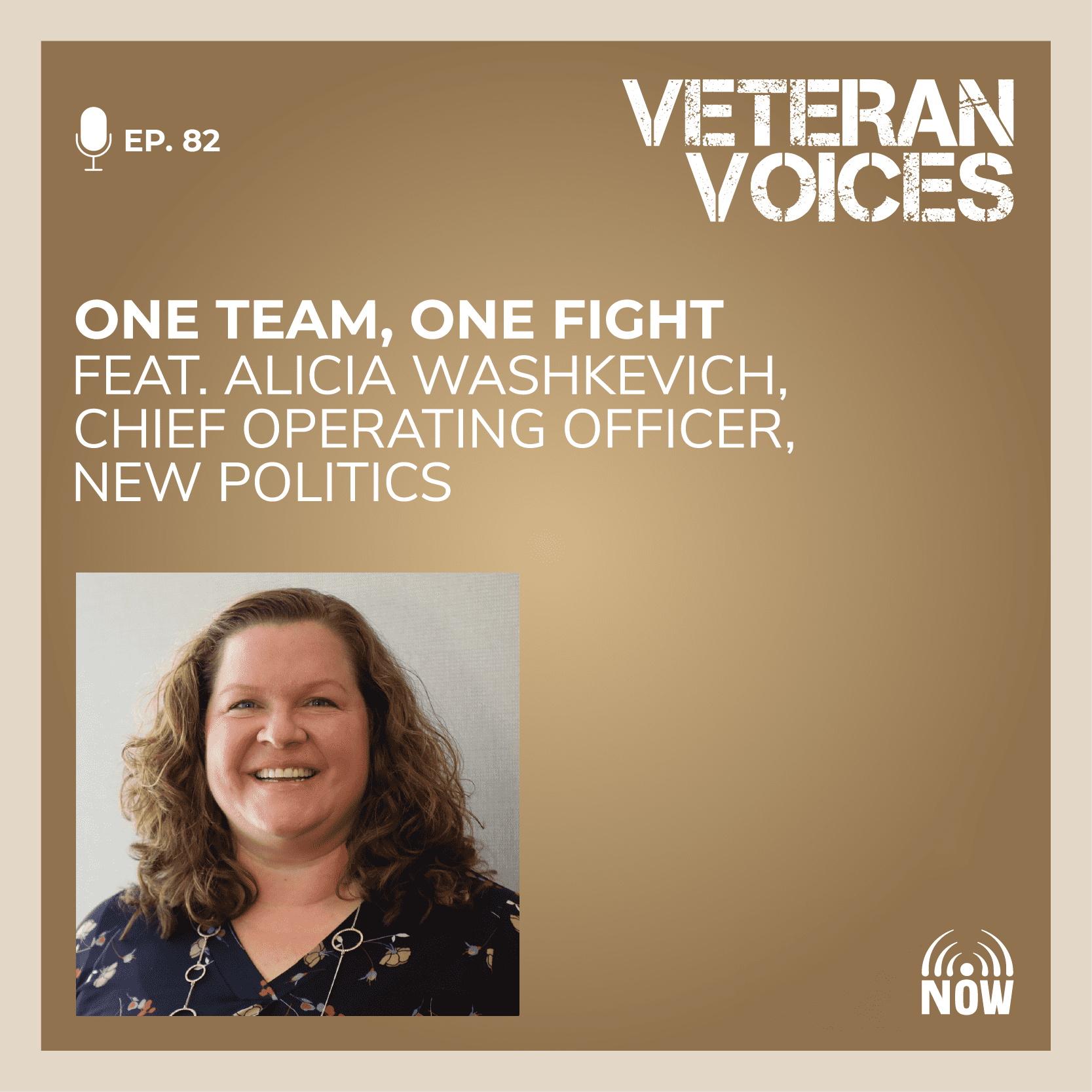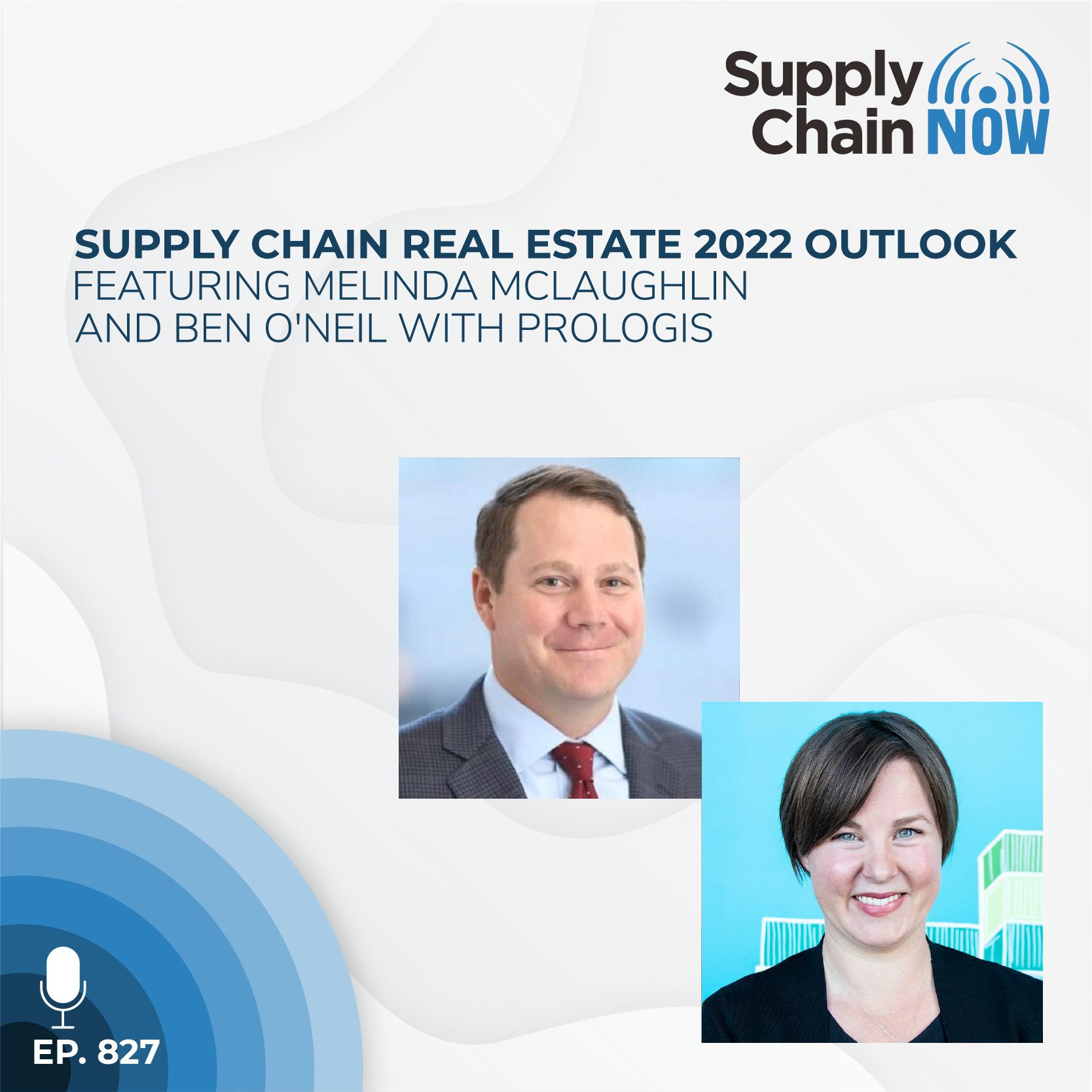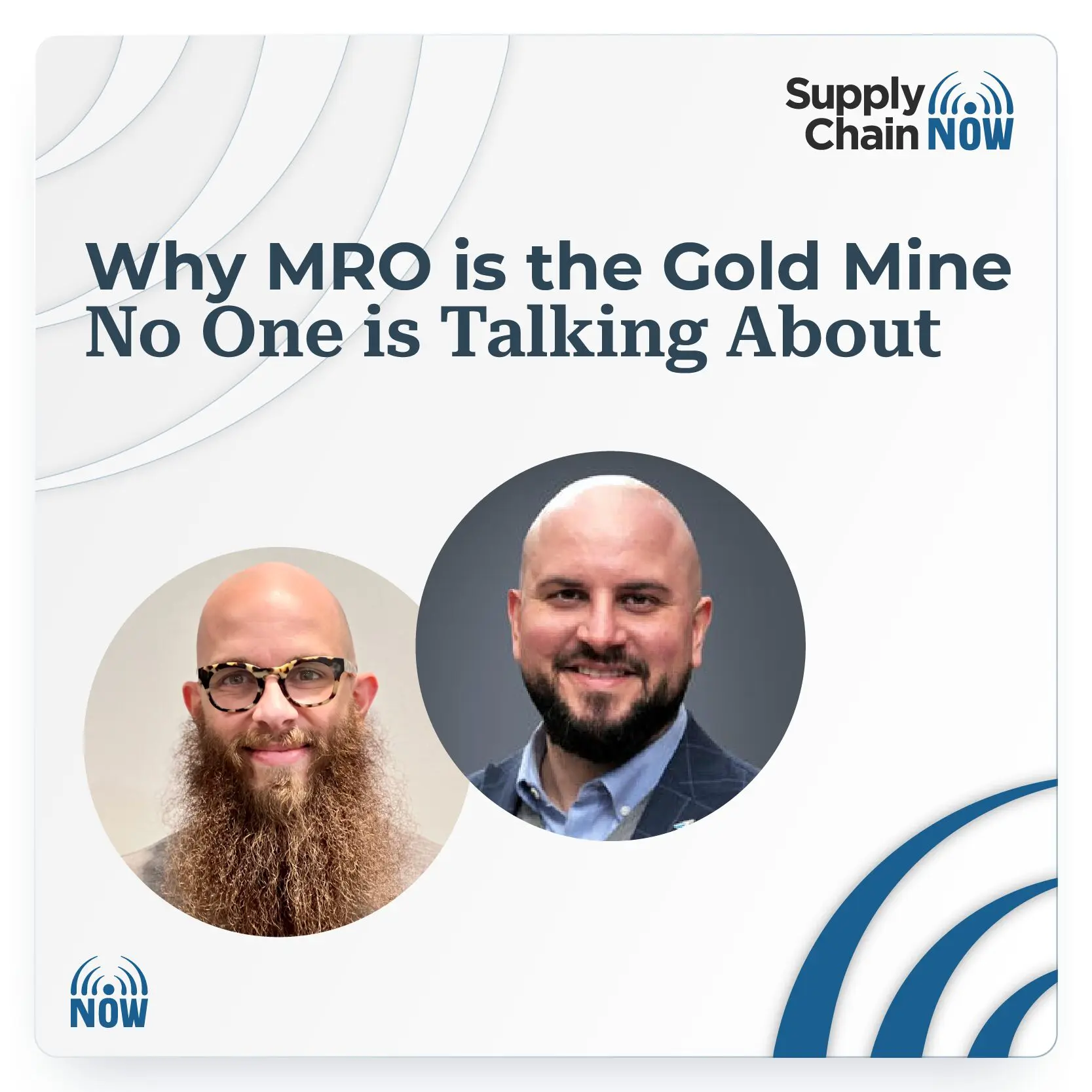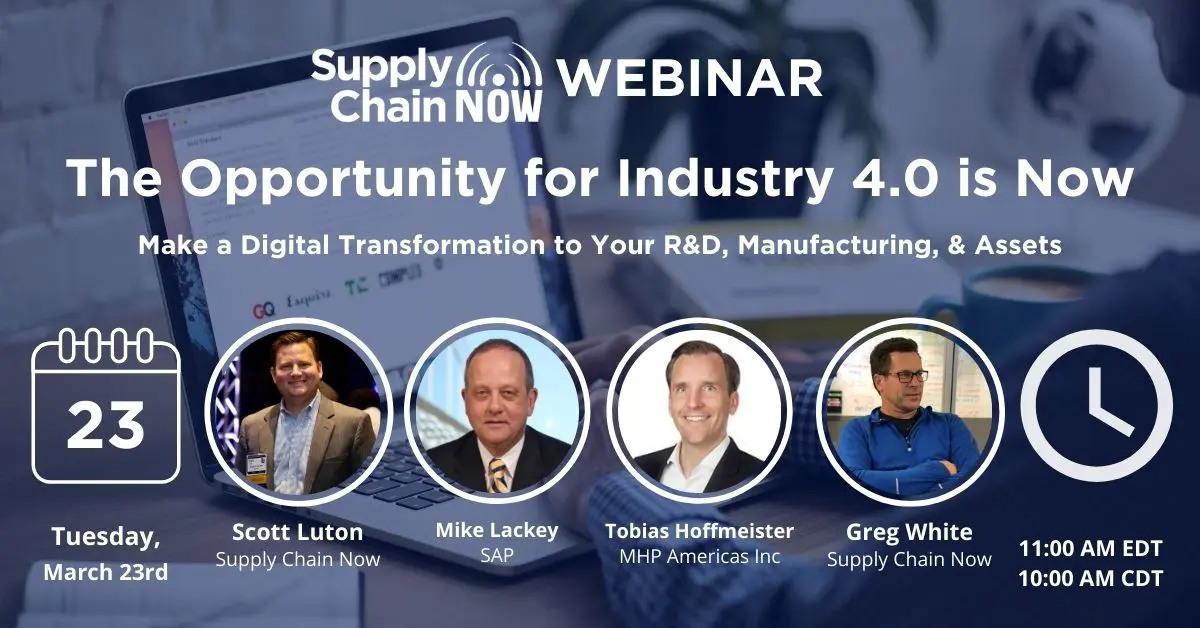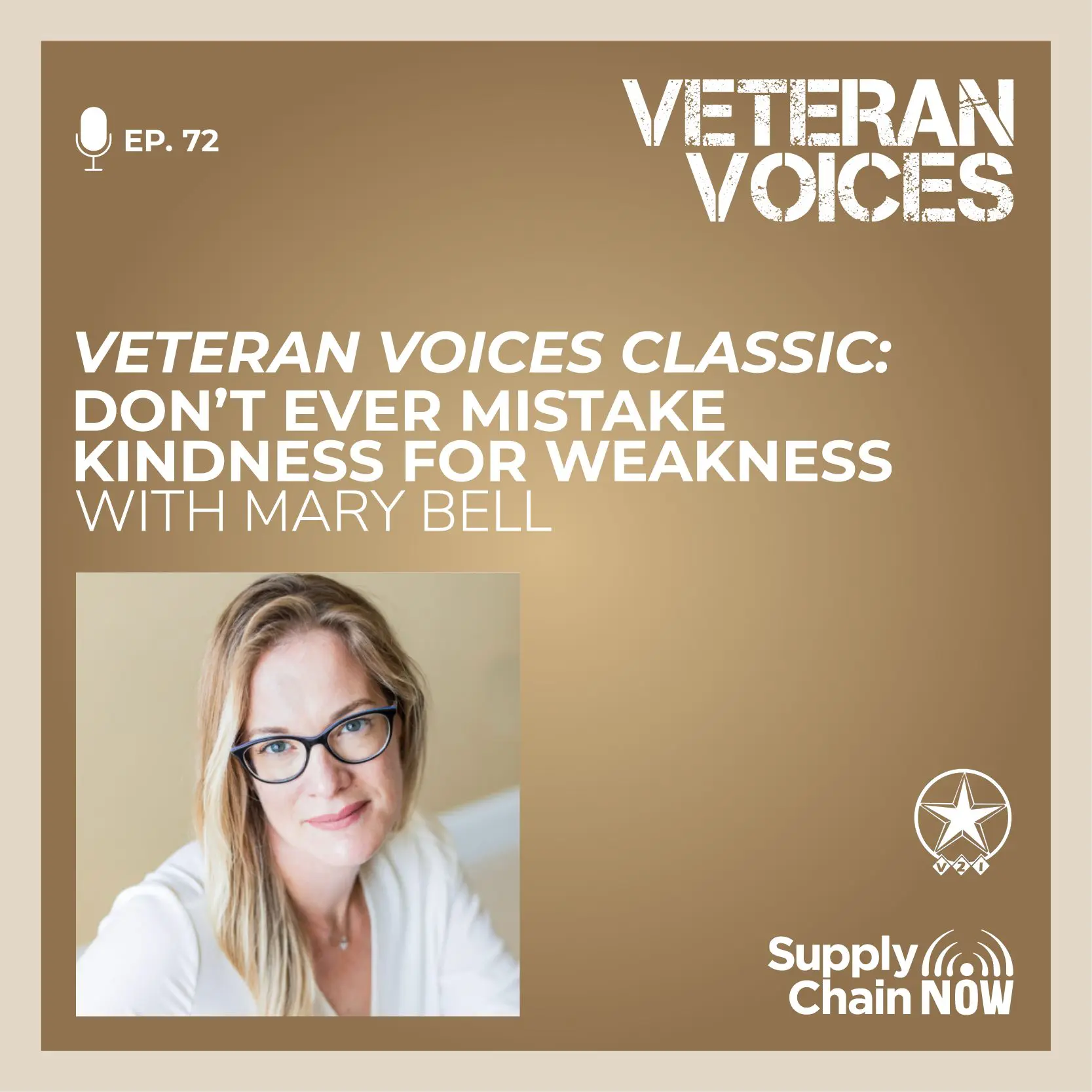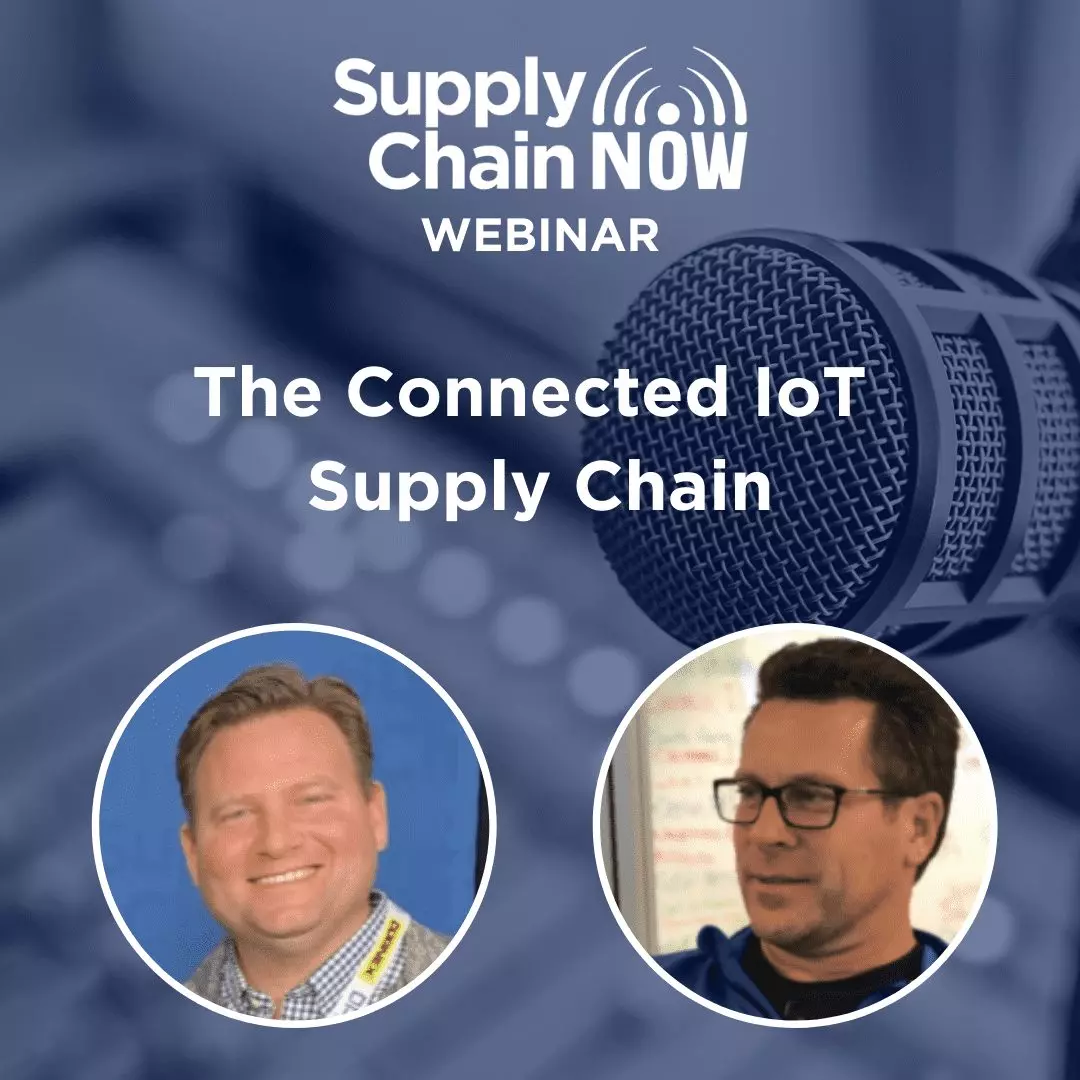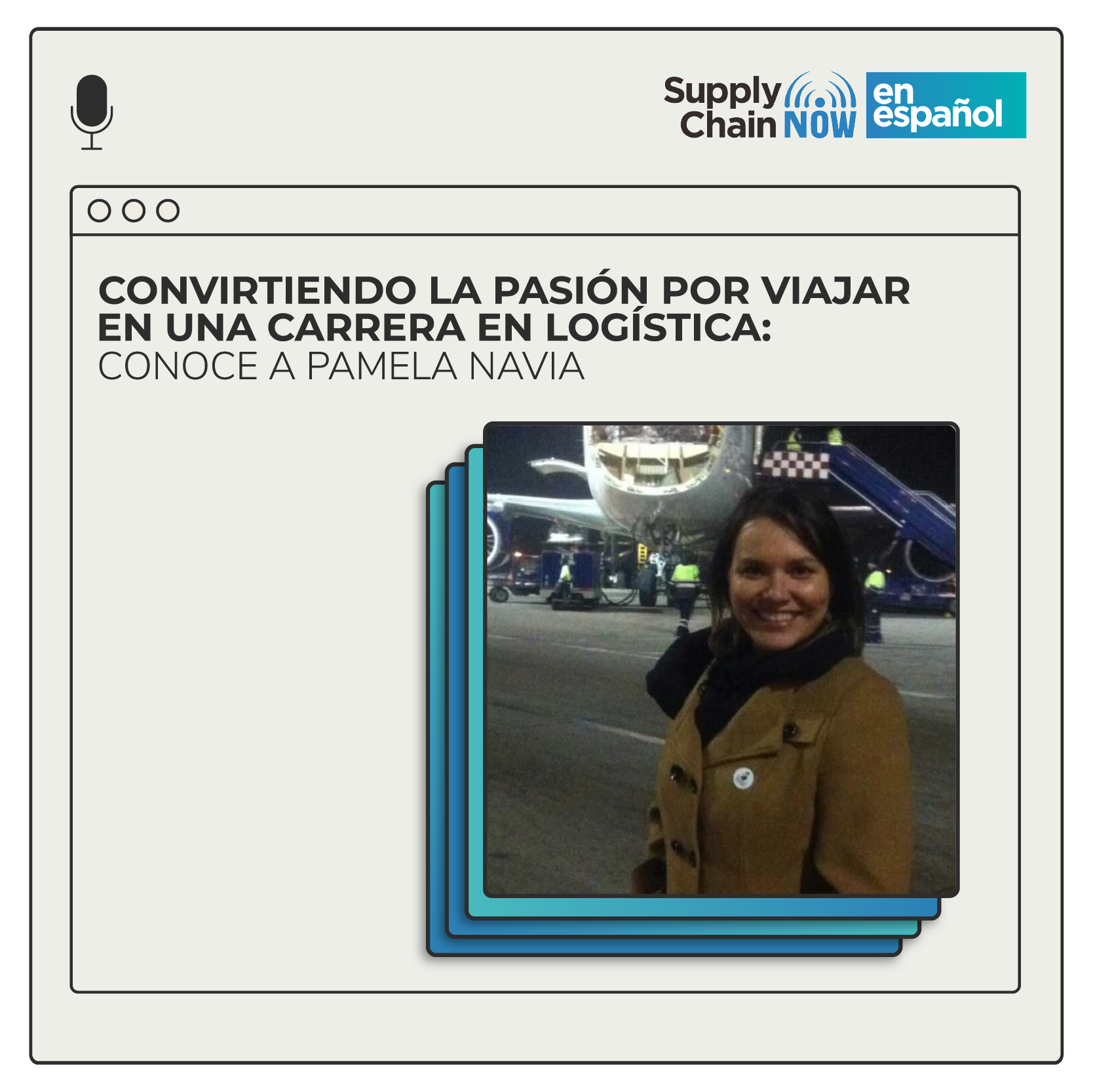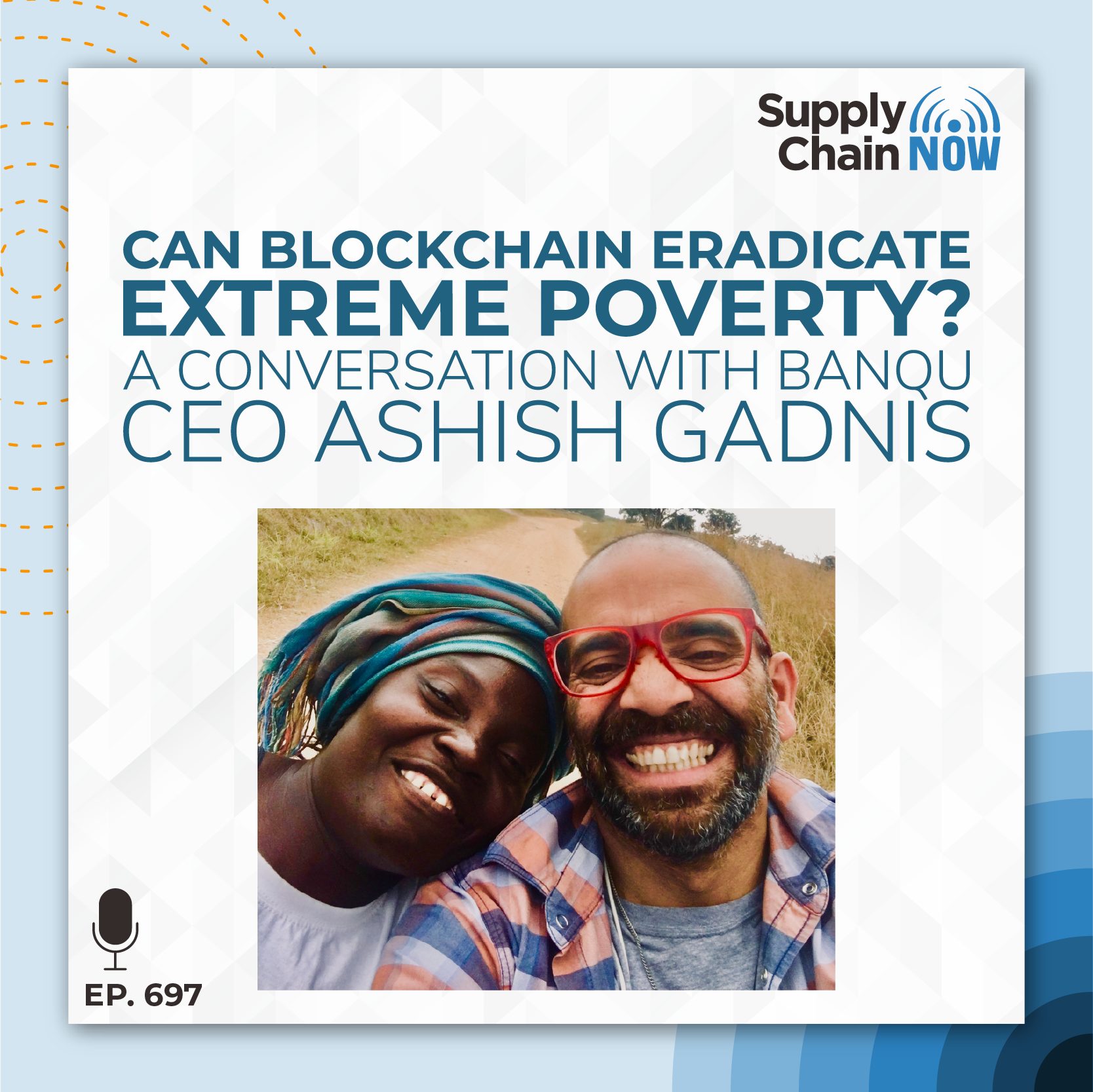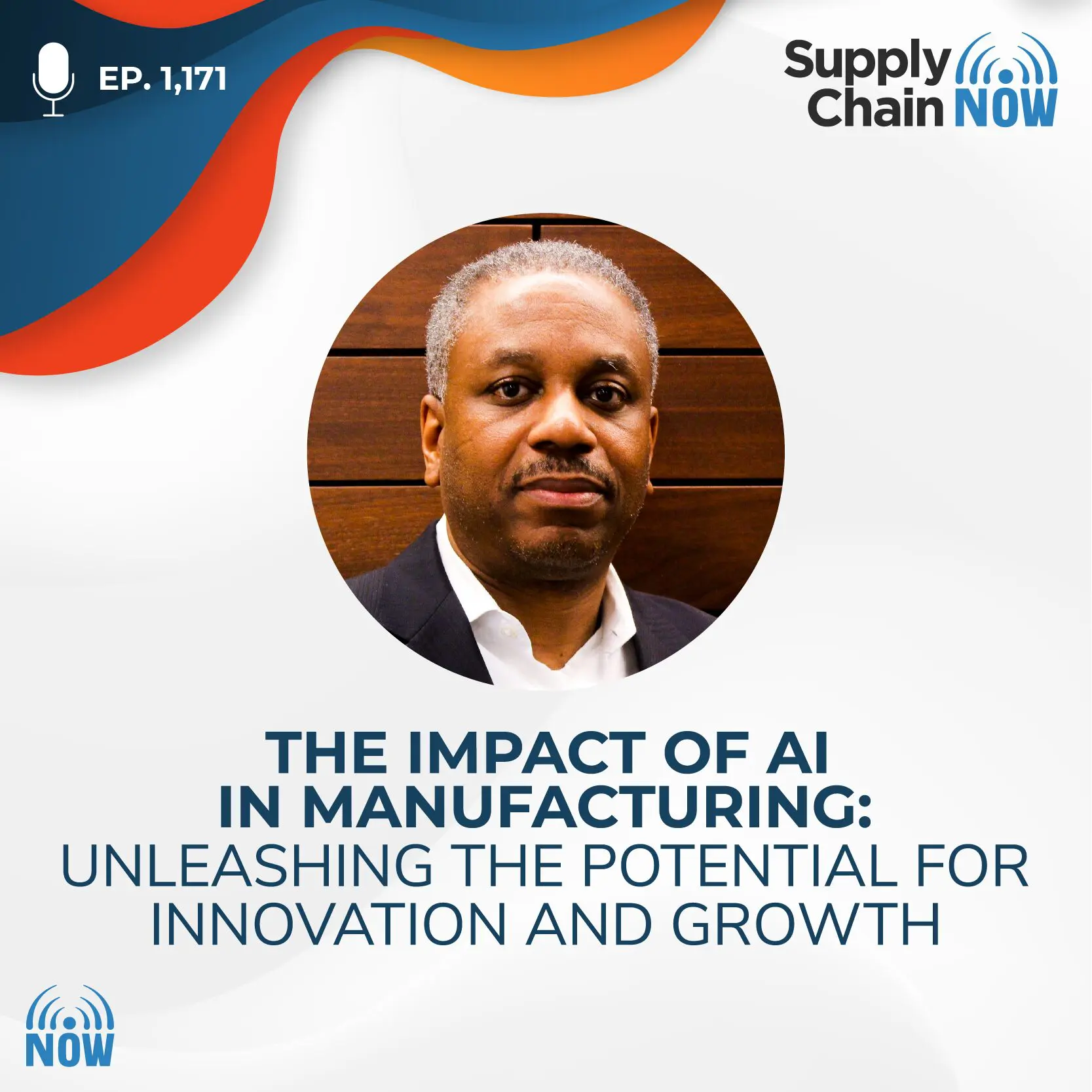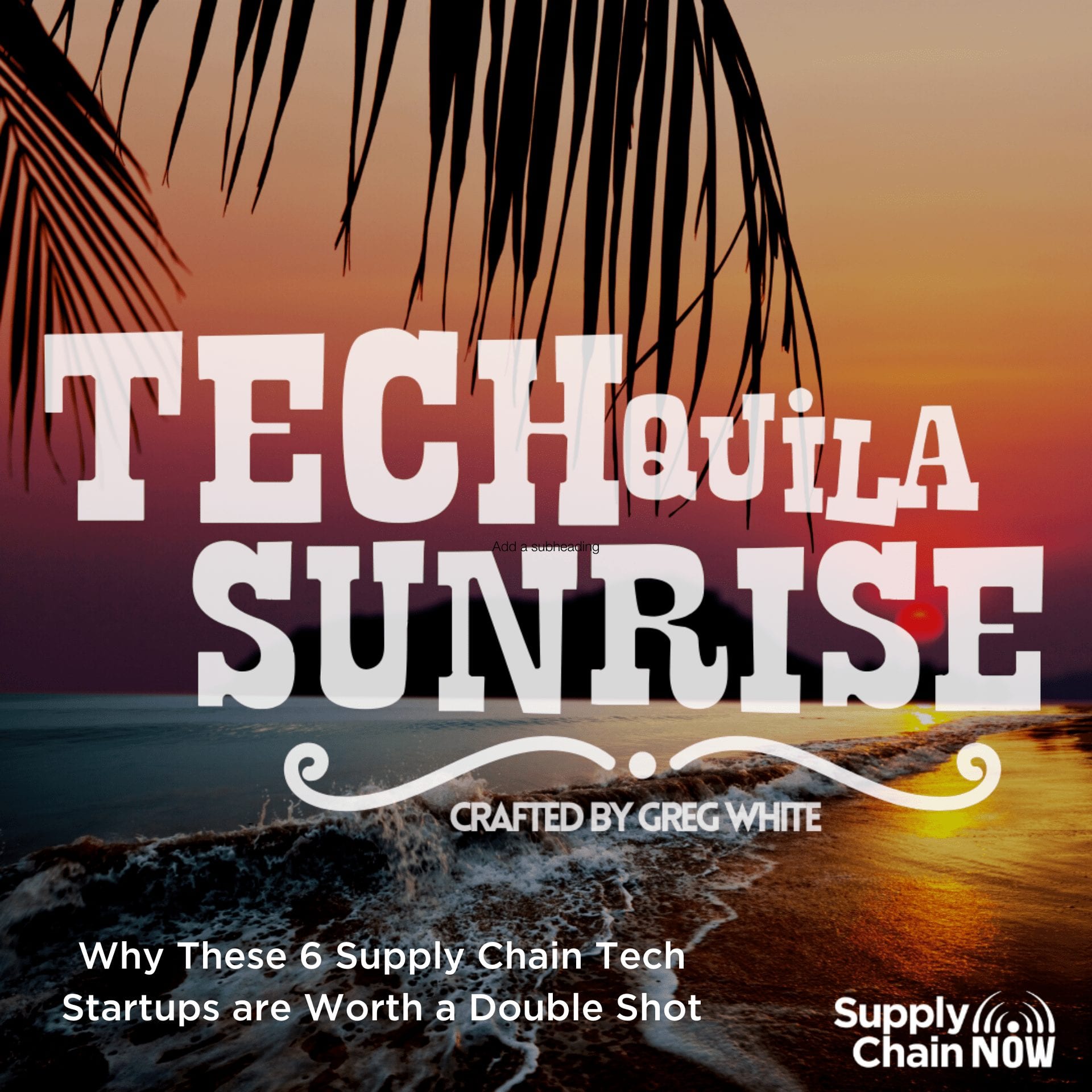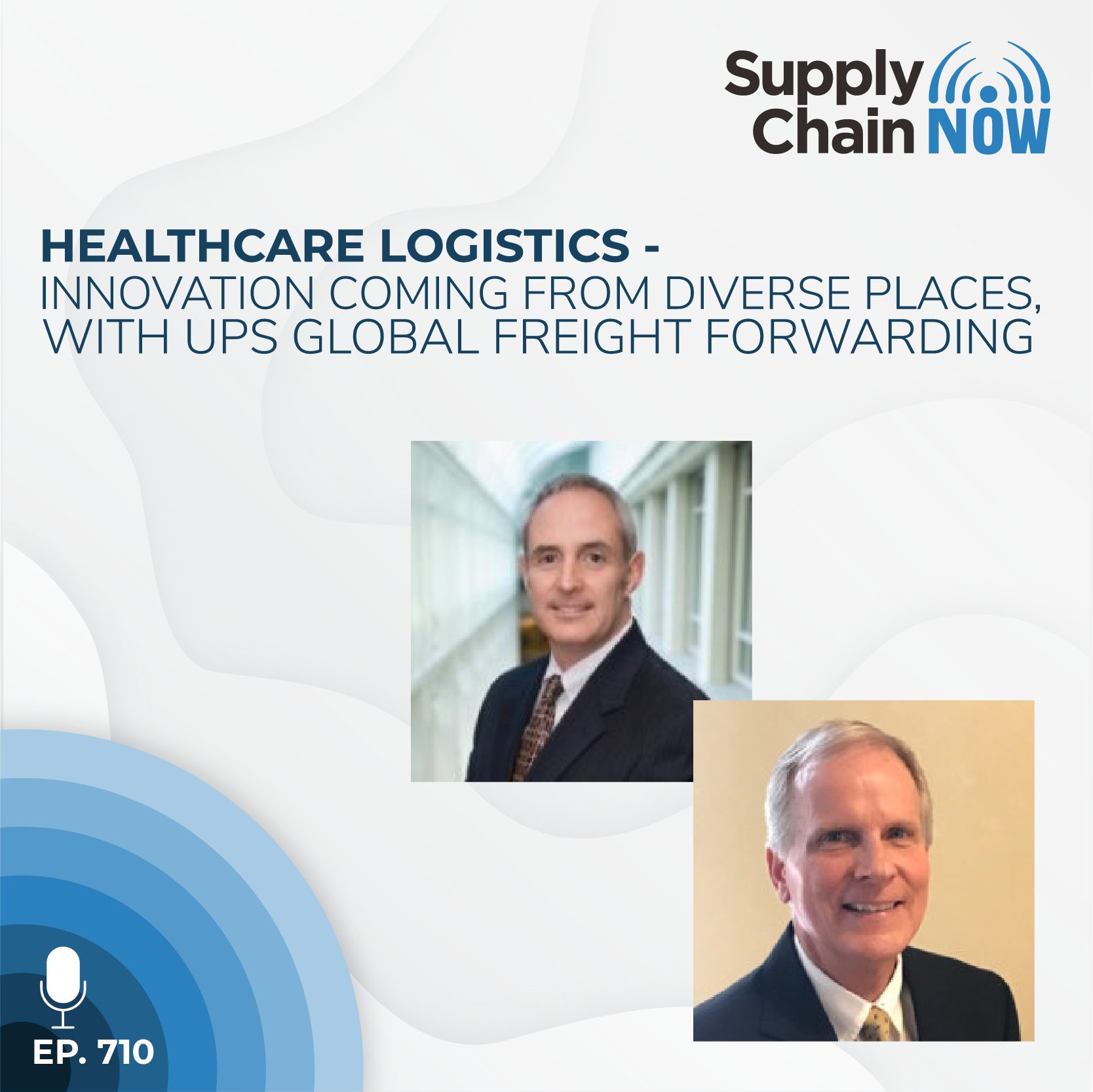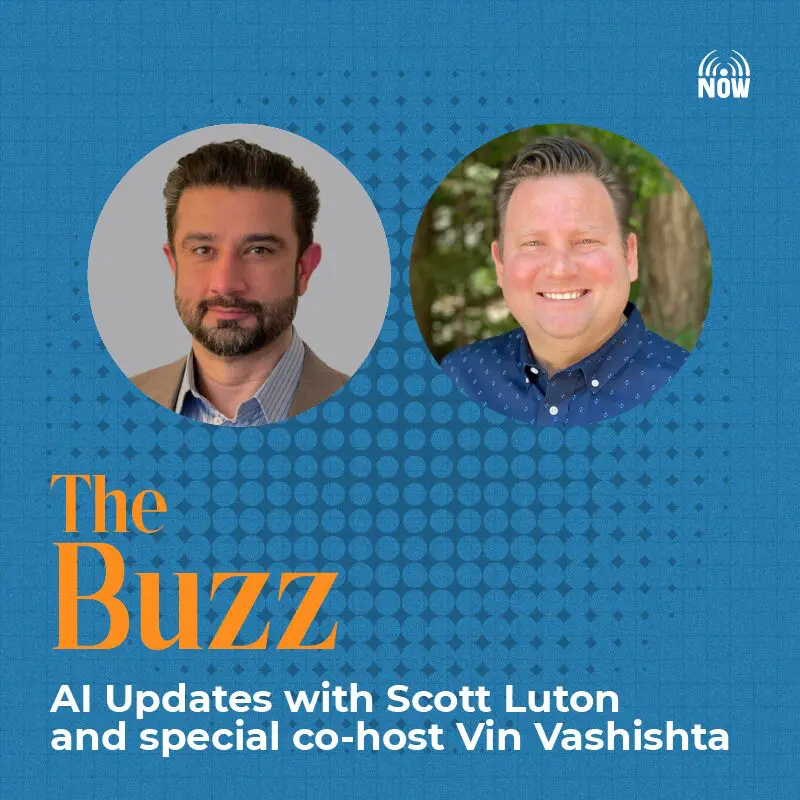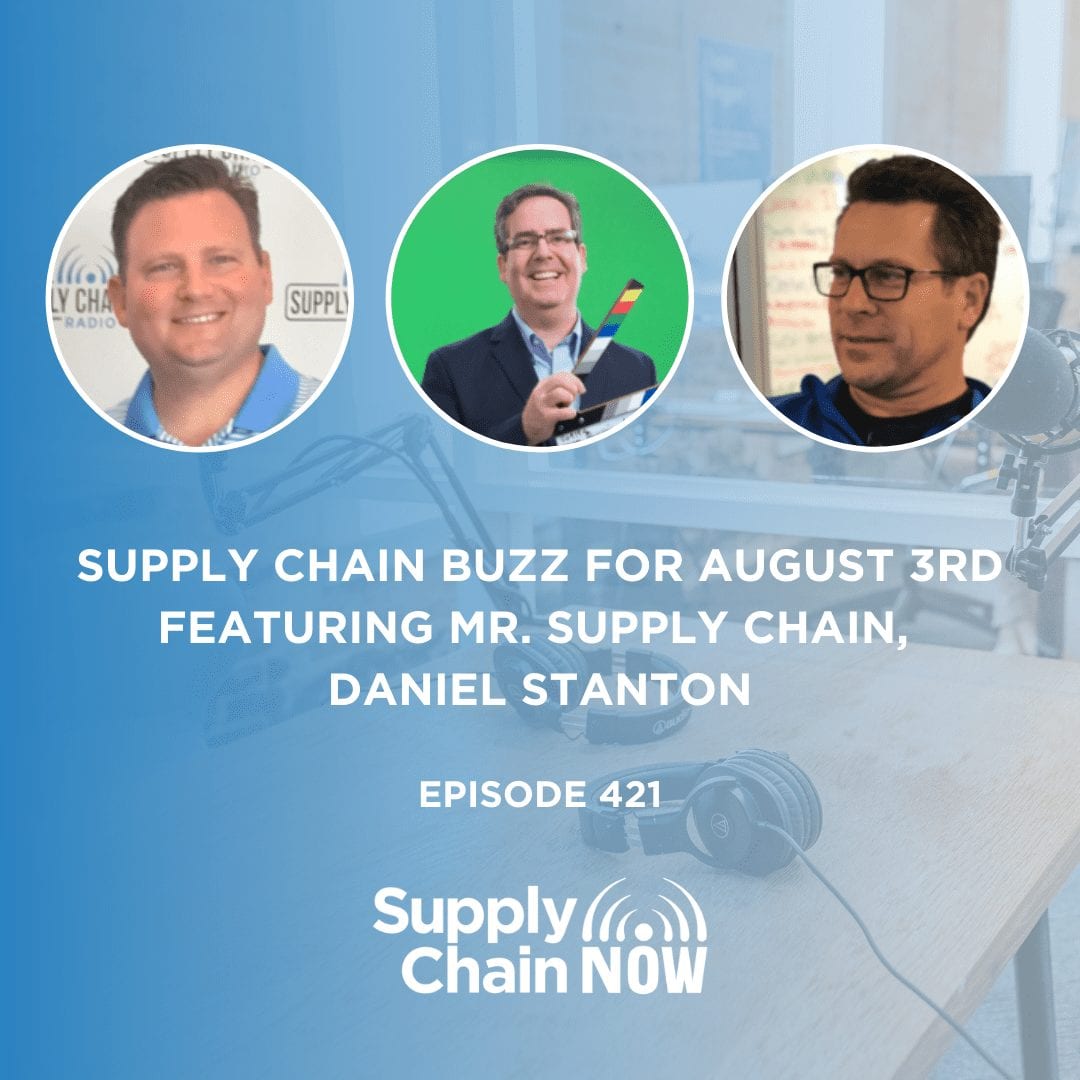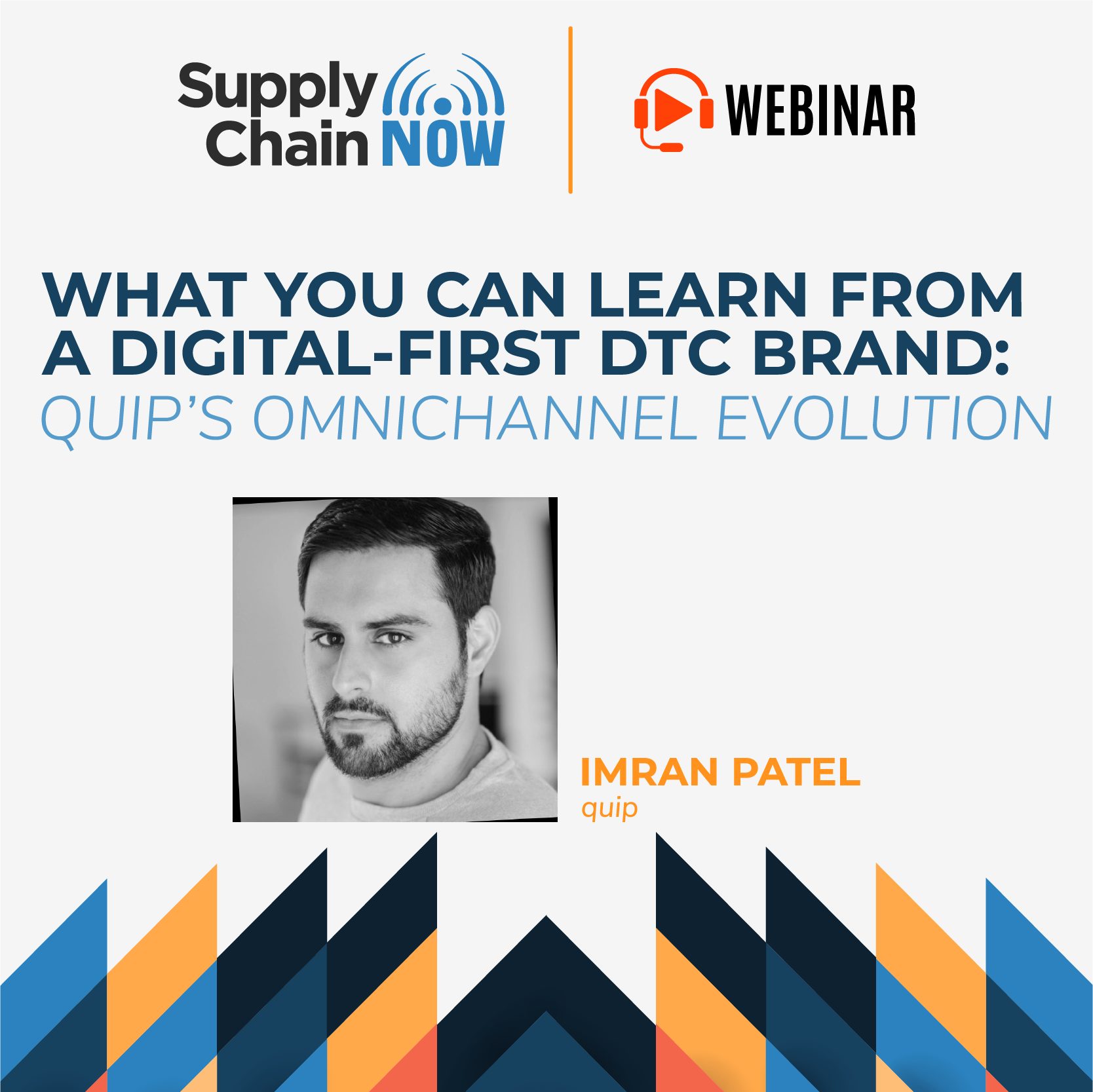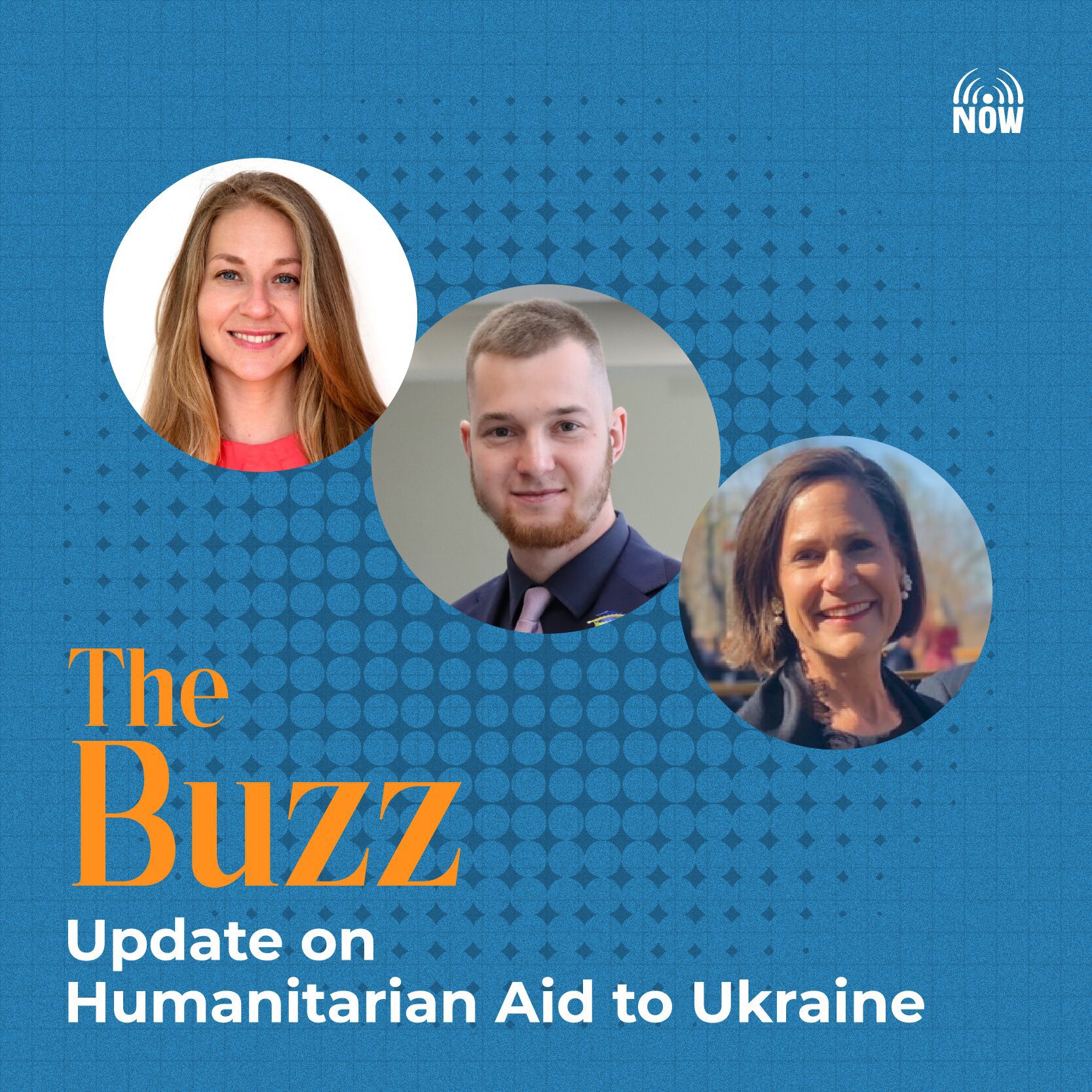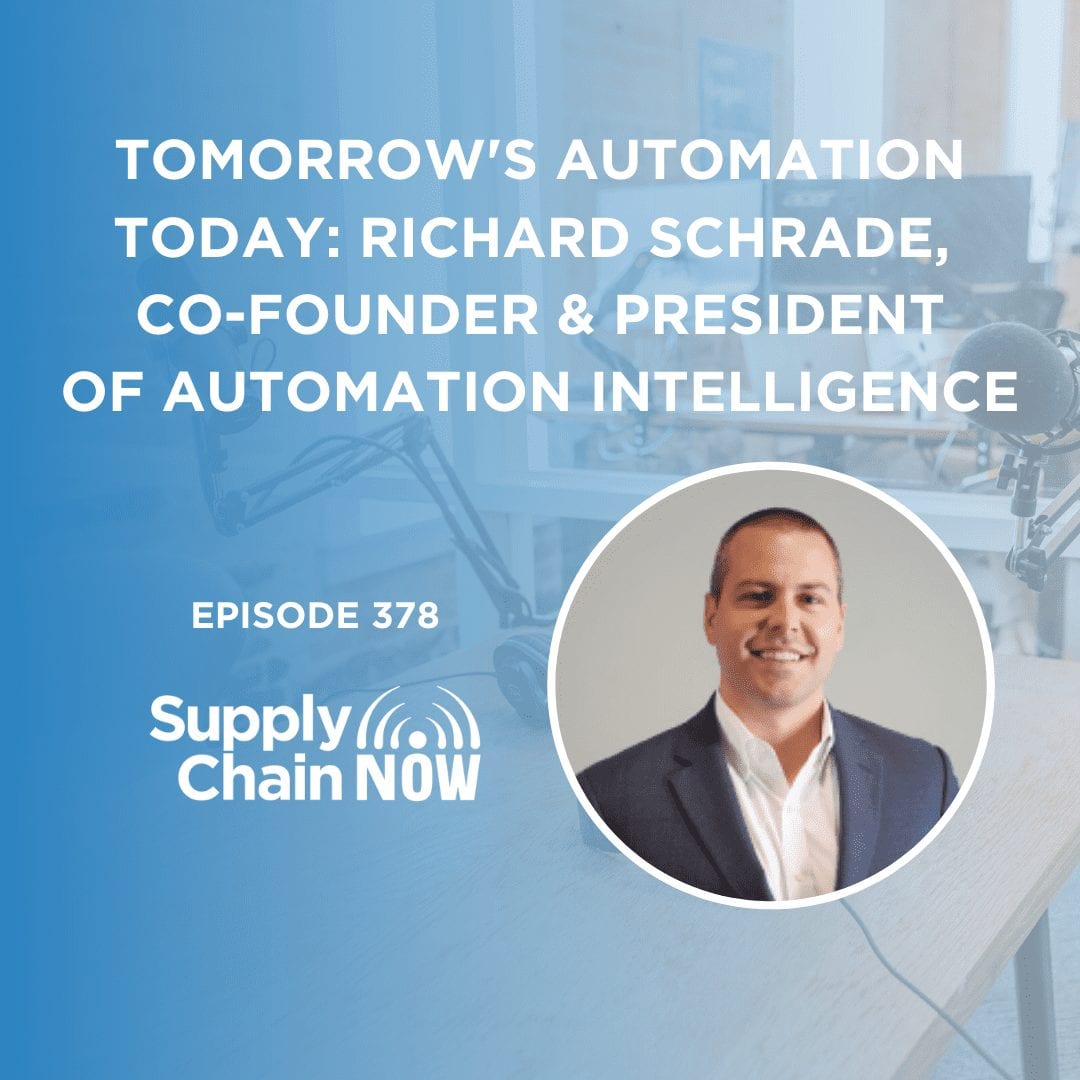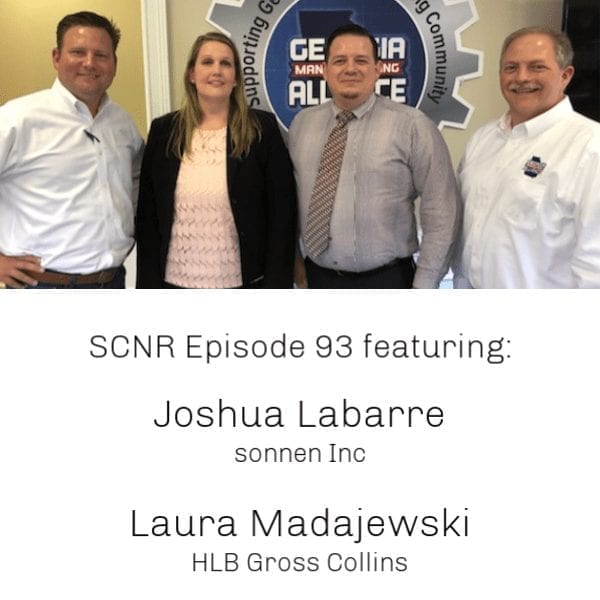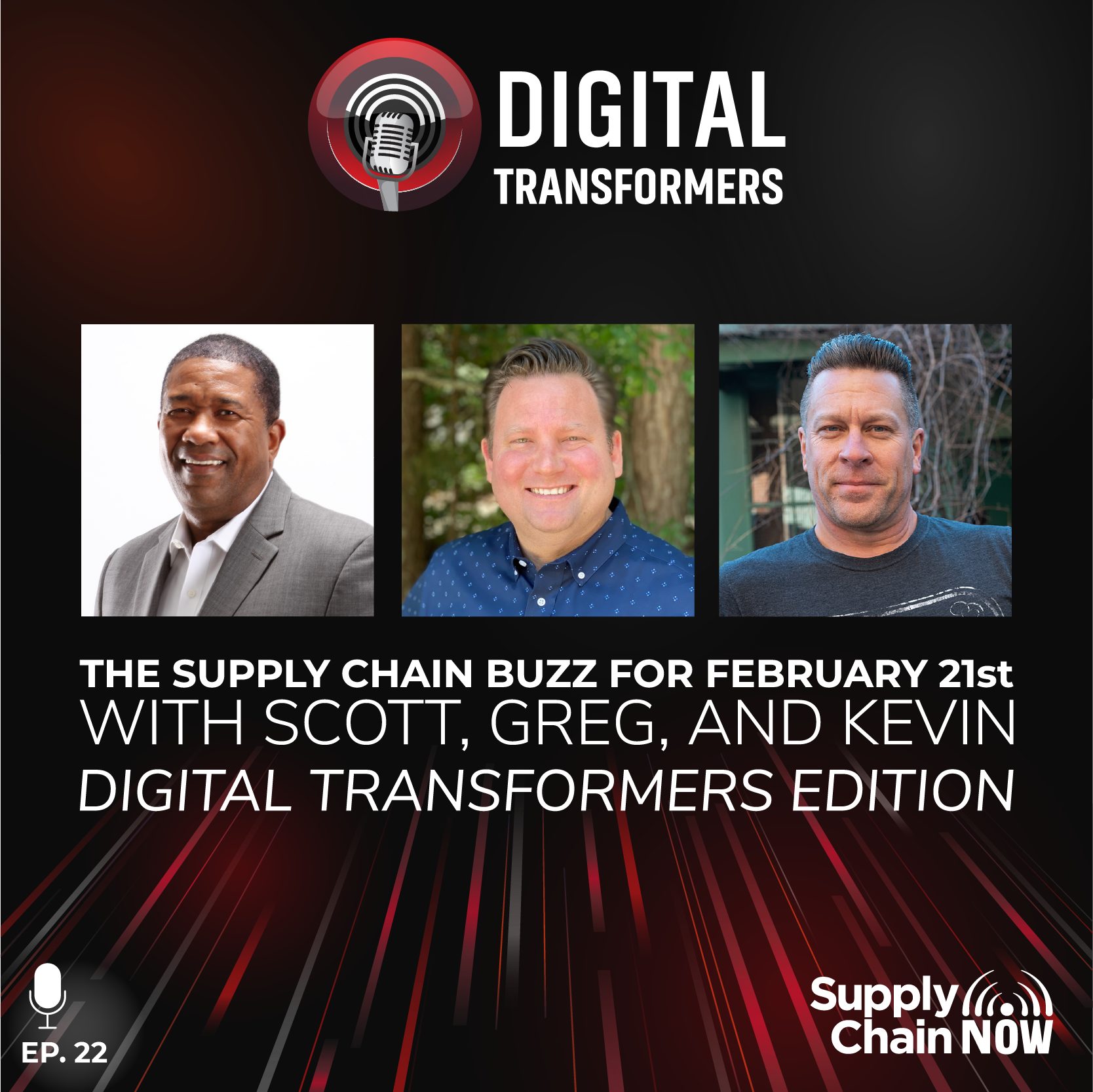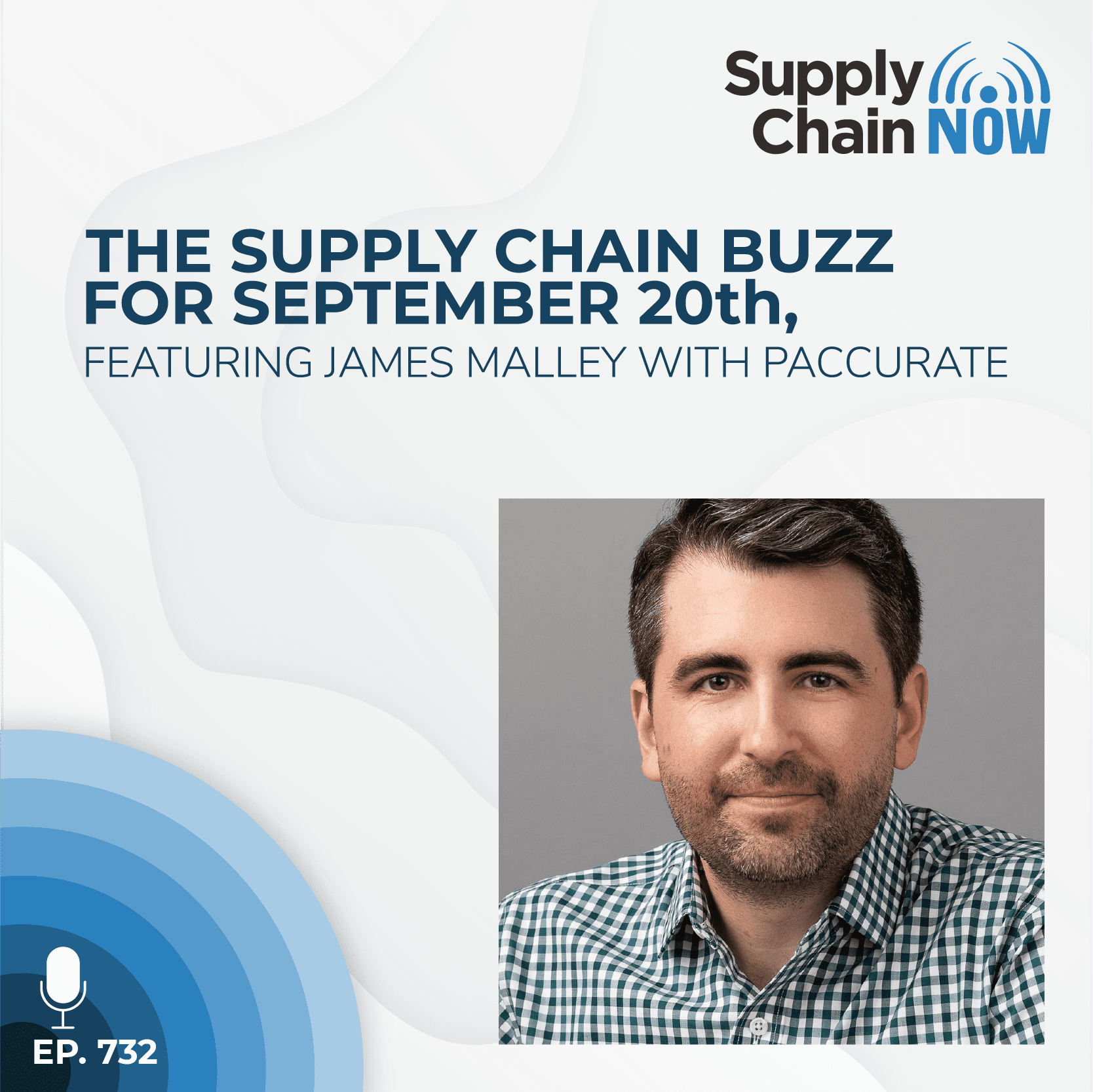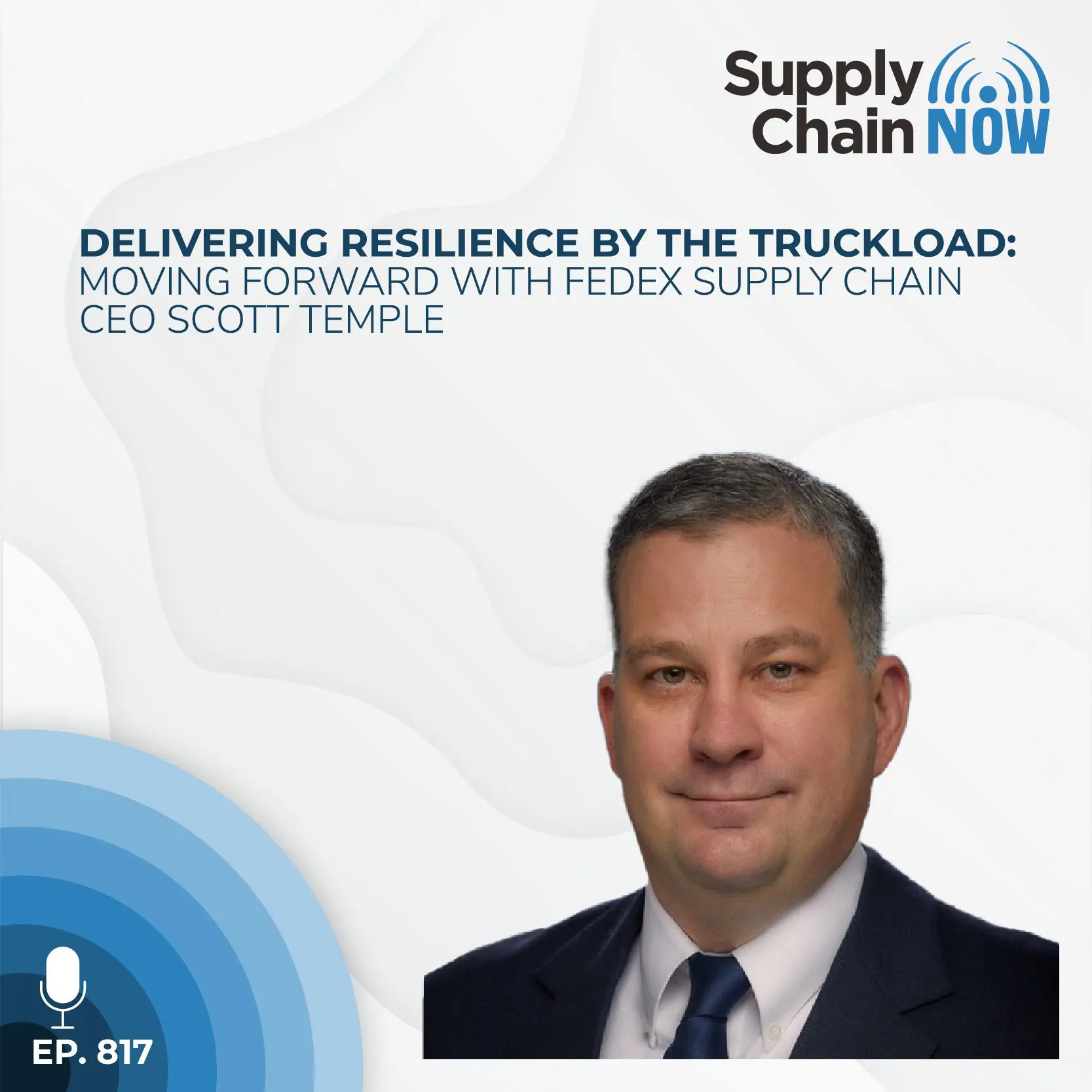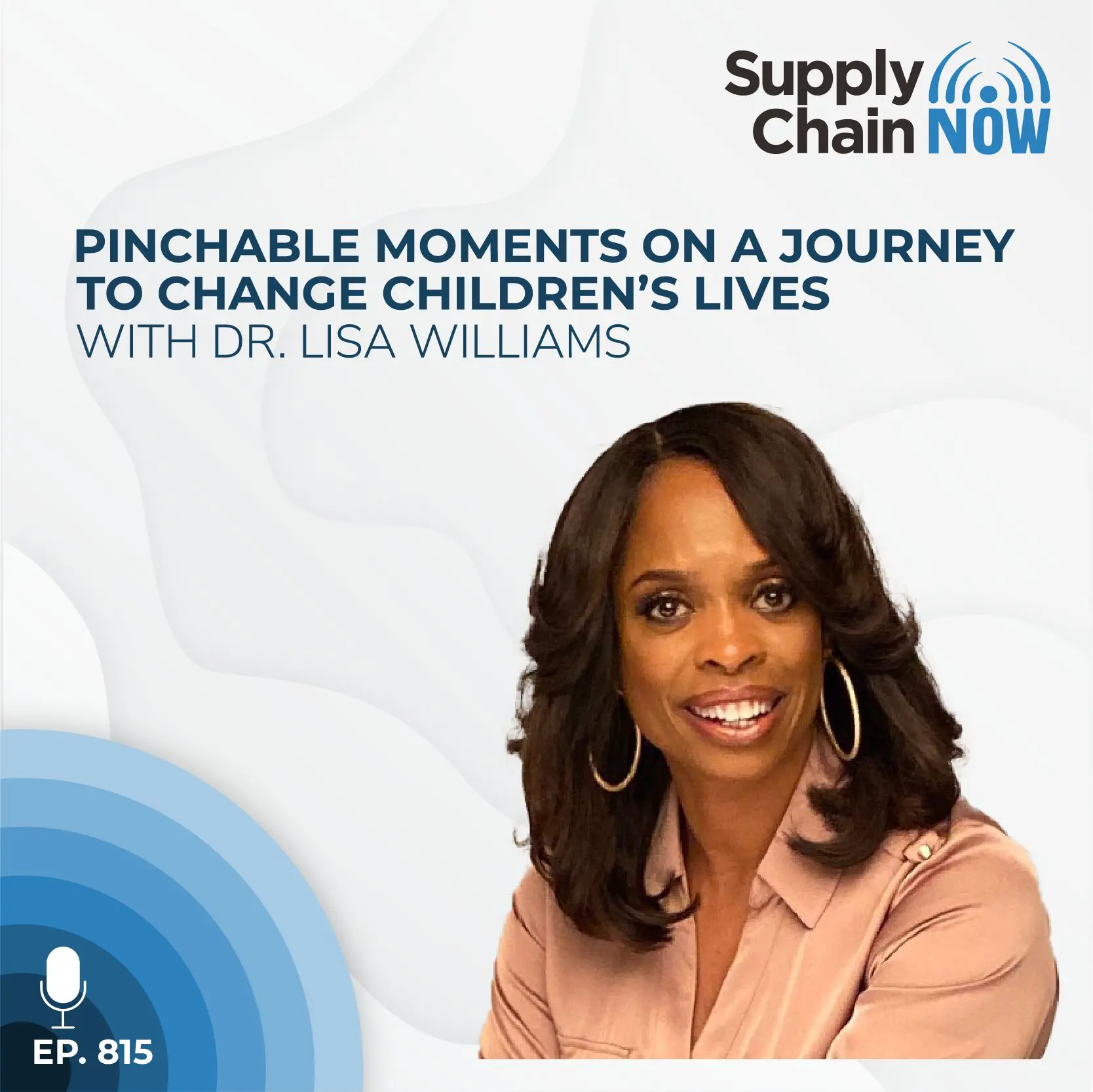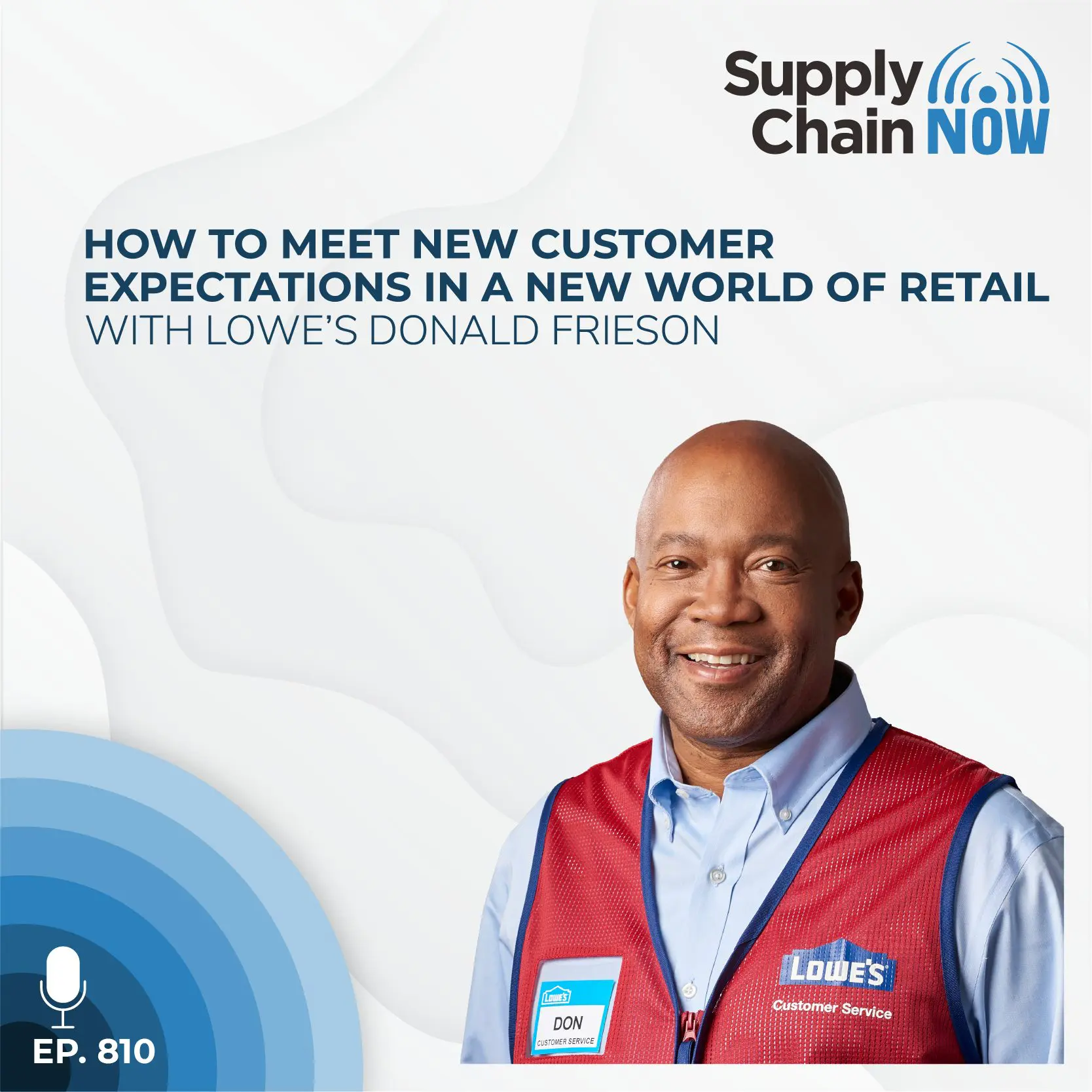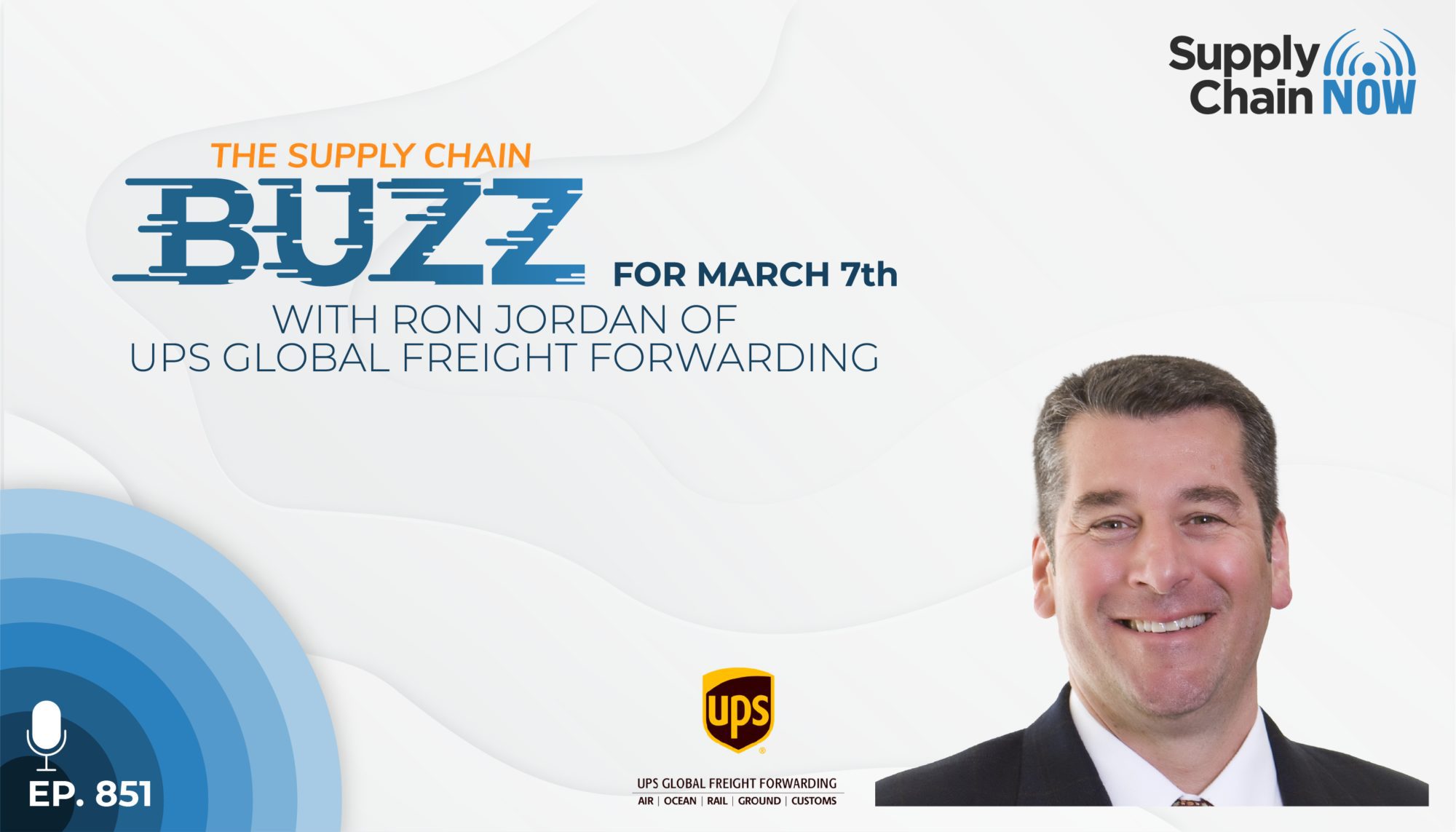
This is the ecosystem of our logistics community. We are all in this together: the rail, the truckers, the steamship lines, the NVOs, the BCOs, the manufacturing plants. We're all in this together. And we've got to address that in order to see ourselves through this.
-Ron Jordan, UPS Global Freight Forwarding
Episode Summary
From cargo losses to conference highlights, this week’s Buzz is chock full of the latest headlines and pressing issues in supply chain. Scott and special cohost Allison Giddens join Ron Jordan, Vice President of Global Freight Forwarding at UPS, to talk about the state of manufacturing, how ongoing conflict in Ukraine will impact the supply chain, the importance of collaboration across the logistics ecosystem, the top five freight mega trends and more.
Episode Transcript
Intro/Outro (00:00:03):
Welcome to Supply Chain Now, the voice of global supply chain. Supply Chain Now focuses on the best in the business for our worldwide audience, the people, the technologies, the best practices, and today’s critical issues, the challenges, and opportunities. Stay tuned to hear from those making global business happen right here on Supply Chain Now.
Scott Luton (00:00:30):
Hey. Hey. Good morning. Scott Luton and Allison Giddens here with you on Supply Chain Now. Welcome to today’s livestream. Allison, how are we doing?
Allison Giddens (00:00:38):
I’m good. Outside of the pollen, I’m good.
Scott Luton (00:00:41):
Oh, tell me about it. Man, my sinuses, no more room for any more pollen. And we’re just now getting started, right?
Allison Giddens (00:00:48):
I know. It hasn’t even started, or it has started but it hasn’t started. It’s not yellow outside yet.
Scott Luton (00:00:54):
Do you know the biggest producers of pollen from what I’ve heard?
Allison Giddens (00:00:58):
Trees?
Scott Luton (00:00:59):
Yes. Pine trees. Did you know that?
Allison Giddens (00:01:02):
Yeah. And only because I researched it because I was pruning.
Scott Luton (00:01:07):
A botanist, we’re going to add that to your long list of things that you’re experts on. But, hey, all of that aside, Allison, today is The Supply Chain Buzz. We come to you every Monday at 12:00 noon Eastern Time, where we share some of the leading stories across global business. And, today, Allison, we’ve got a special guest joining us around 12:25 p.m. Eastern Time, as Ron Jordan with UPS is going to be joining us. We’re going to be talking about a variety of things, including five megatrends that are impacting global supply chain today. So, buckle up and get ready because we want to hear from you as well, everyone in the cheap seats. Allison, I trust that you had a good weekend.
Allison Giddens (00:01:47):
I did. I did. I got lots of things done. The weather was absolutely beautiful. So, yeah, getting it done. Getting it done. But, yeah, I’m looking forward to hearing from Ron, because, not only is he a trip, but he’s got some good gems to share. And I’m sure he’ll give us a hard time about our lack of geography.
Scott Luton (00:02:05):
You know, he joined us for a webinar a few months back along with the great folks at Crocs and a couple other companies. And we got a lot of feedback on Ron, not just his knowledge, but his sense of humor. And I think folks are going to enjoy his appearance here today. So, we’re going to say hello to a few folks in just a minute, but let’s knock out a quick program note really quick. How about that, Allison?
Allison Giddens (00:02:29):
Let’s do it.
Scott Luton (00:02:31):
Let’s talk about the 2022 Supply Chain and Procurement Awards. Nominations are open. Nominations have been coming in. We’ve got a ton of folks that are currently nominated from a UPS company named Roddy, very innovative. I love how they’re making miles more efficient and eliminating empty miles, SourceDay, AERO Technology. And then, something caught my eye, I think last week or so it came in, our Unsung Hero Award. One of the nominees there is Rose Martin from Win-Tech. Allison, tell us about Rose.
Allison Giddens (00:03:06):
It is. One of the nominations is. So, Rose is our Quality Control Manager. She’s been with us for – oh, gosh. I don’t remember how many years at this point. It feels like she’s been here forever, which is a good thing. She’s a rock star. She came to us, initially, responding to an admin position that we had available. And long story short, I had just interviewed somebody that I intended to offer the position to. And I already had Rose lined up as an interview right after this young woman. And so, I thought, I’m still going to do Rose a favor or do us a favor and Rose and hear her out. So, she came in, she sat down, and she talked about her experience in manufacturing up in Upstate New York.
Allison Giddens (00:03:49):
And I thought, “Wait a minute. Wait a second. So, you have the manufacturing experience and you want to be on this side of the wall?” And she was like, “Well, that’s the job position that was open.” And I said, “I will make a position for you.” And we talked to Dennis, who was the owner of the company at the time. And I pleaded the case of, “Look, we really need a quality coordinator to get that department really to where it needed to be.” And within weeks, she had that place turned around, organized. I mean, the kind of thing where you could say to her, “Hey, do you have the piece of paper from 2007 with such and such at the top.” She goes, “Oh, yeah. I know exactly where that is.” [Inaudible] She’s a rock star.
Scott Luton (00:04:30):
I love it.
Allison Giddens (00:04:31):
It’s exciting. She’s definitely an unsung hero for sure.
Scott Luton (00:04:35):
Well, it sounds like she’s made a big impact over the years, and that’s what we want to lift up and celebrate. So, folks, nominations are open through April 1st. You can go to supplychainprocurementawards.com to learn more. We’ve got eight or nine different categories, including the Unsung Hero Award. And the good news is, the nomination fee is about 200 bucks to nominate, all that gets donated to our nonprofit friends, Hope For Justice, which are leading the fight across the globe to eliminate modern slavery and human trafficking. So, all for a great cause. So, learn more at supplychainprocurementawards.com. Now, here, Rose has got a great shot, Allison. So, we’re going to keep our fingers crossed.
Scott Luton (00:05:14):
Okay. Let’s say hello to a few folks and then we’ve got some late breaking news story on you, which we’re going to celebrate in just a minute. But, first, Max Gomez is back. Max is down in Mexico tuned in via LinkedIn. Great to have you back as always, Max. Love your contributions. We’ve got Anjana tuned in via LinkedIn from India. Hello, Anjana. I hope this finds you well. Gene Pledger from NA, not LA, but Northern Alabama. And, Allison, Gene is a big Bama fan, I believe. Is that okay?
Allison Giddens (00:05:51):
No, that’s okay. That’s all right. The SEC, you know, there’s something that we all share. I’m sorry Clemson fan. I’m sorry.
Scott Luton (00:06:00):
Well, there’s like 28 teams now at SEC. You mind as well just –
Allison Giddens (00:06:03):
That’s true. You bring up a very good point.
Scott Luton (00:06:04):
By the way, I don’t know if I’ve seen you since the game. Congrats to your Bulldogs. What an incredible season. And, Gene, I know that comes at a cost to your impressive Bama teams that you’ve had over the years. But, gosh, your trophy case has got to be full.
Allison Giddens (00:06:21):
Just give us one, man. Give us just one.
Scott Luton (00:06:22):
But, Gene, great to have you here. Tom Raftery is with us here today. Tom, hope this finds you well. Love all the things you’re up to, including, I think you’ve got a couple podcasts under your belt now. Tom is extremely intelligent and passionate around climate change and sustainability and, really, practical leadership around how can we make more progress across the globe. So, Tom, great to have you here. Hope you’re doing well. Always loved the hat. So, thanks for popping in. Davin is tuned in. Davin, I think we got connected on Insta over the weekend. I’m still figuring out how to use that. I’m behind the times here, Allison.
Allison Giddens (00:07:03):
Just get one of your kids to help.
Scott Luton (00:07:05):
Seriously. But, Davin, hope this finds you well. Great to have you here. Hayley is tuned in from South Africa. Hayley via LinkedIn. Great to see you here, Hayley. Looking forward to hearing your perspective. And Tom’s up with three podcasts. Tom, goodness gracious, taking over the visual content world. Hey, really enjoy it. And the best content comes from the folks that are very passionate about what they’re creating. So, a lot of good stuff there. Finally, Jeremy is from Wisconsin, “First time live listener.” I love this. “Spotify pre-recorded episodes are a daily routine.” Jeremy, making our day here. Tell us where in Wisconsin. I was just talking, Allison to Jenny – I’m going to get her last name wrong – wonderful supply chain thought leader. She’s based up in Madison, Wisconsin. Ever been to Madison, Allison?
Allison Giddens (00:07:58):
I have. I have. We went up there for a Women in Manufacturing event and, yeah, it’s beautiful up there, especially the time of year we went. It was the fall. It was gorgeous.
Scott Luton (00:08:08):
Really? Okay. We’re considering making a trip up there in September for a great business conference we’re hosting at the University of Wisconsin there in Madison. So, Jenny, if you’re listening, great catch up last week and we will talk more soon. Okay. So, one last call out here. I can’t get to everybody now. But Jose does a great livestream – I think it’s weekly – Logistics and Coffee. Jose, hope this finds you well. I know you were at TPM doing some big stuff. We’re going to talk to Ron. It’s one of the things we’re talking to him today about, some of his key takeaways there. So, great to see you there, Jose. And Jeremy is in Madison. Small world, Jeremy. Great to see you. Okay.
Scott Luton (00:08:48):
So, let’s talk about some interesting recognitions – interesting doesn’t do it – remarkable recognition, Allison, that hit my radar over the weekend. Now, the Manufacturing Institute has these awards called the STEP Awards, where they bestow this recognition to the movers and shakers. Folks that are really doing big things to make manufacturing industry, and perhaps beyond, a better place. Allison, you were a part of the latest class for these STEP Awards. How cool is that?
Allison Giddens (00:09:23):
It was. Really, I was flattered to been nominated and then be a part of the hundred nominees and 30 – what they call – emerging leaders. It’s really cool. They even sent us a PDF of almost, like, a mini-biography of everybody. And I’m halfway through and I’m like, “This is so cool to be among these women.” But, yeah, they recognize women in science, technology, engineering production, all who exemplify leadership at their companies. And it’s really cool to see some big aerospace and automotive companies, supply chain, everything in between. And it was very cool to see someone from the Johnson and Johnson vaccine initiative too. So, it’s like, “Oh. That’s really neat how it all kind of ties together.”
Scott Luton (00:10:09):
Talk about noble mission. They’re certainly big parts of that. Well, congrats, Allison. We’ve been friends a long time. I’ve seen you in action. You know, we like to talk about deeds, not words around here. You epitomize that. And I’m so tickled. Who knows? Maybe we try to make the trip up there with you. But congratulations. And I bet, I know we’ve got some upcoming shows. We’ll have to grab some of those other recognizees – if that’s the right word – and we’ll tee up a conversation.
Allison Giddens (00:10:36):
I appreciate that. That’s a good idea. I’ll try to meet all hundred in April. They bring us all up to D.C. for the event, it’s a-day-and-a-half or so of leadership discussions and breakout groups and stuff. So, I’m really excited because, on that list, I don’t know anyone right now. So, this is really cool that it’s a hundred fresh contacts.
Scott Luton (00:10:59):
That’s awesome. Well, congratulations. Anna shares that as well. Very impressive. And big thanks to Anna, and Amanda, and Chantel, and Catherine kind of behind the scenes helping to make production happen today. Annie is tuned in from Seattle, Speed Trans LLC is a UPS carrier. Hey, Annie, welcome to the conversation. Catalina tuned in from Bogota via LinkedIn. Great to see you. TSquared, he holds down the fort for us on YouTube. He says, “Bring the heat and the nourishment to match the winds and warmth while it lasts.” He’s a little bit poetic today. TSquared, I love it.
Allison Giddens (00:11:33):
He is. Great with words.
Scott Luton (00:11:37):
All right. Well, congrats again. We’ll look forward to all the pictures and video that comes out from that. Before Ron joins us here in about 15 minutes, let’s tackle some of the leading stories across global supply chain and global business today. How’s that sound, Allison?
Allison Giddens (00:11:53):
Let’s do it.
Scott Luton (00:11:54):
All right. So, let me bring up this here. So, via The Maritime Executive, near the Azores, Felicity Ace sank, I think, on March 1st with 4,000 cars aboard that were all with the Volkswagen group. Now, Allison, you might have seen the news, it caught fire about two weeks ago and was being towed to shore. Included in the loss – get this – that’s now resting on the bottom of the Atlantic Ocean over a thousand Porsches and 189 Bentleys. That is an estimated. So, with all those vehicles, they estimated to be about $400 million in losses. How about that, Allison?
Allison Giddens (00:12:36):
Oh, my gosh. You know, the first thing I thought of when I heard this story was – and this is going to sound really bad – how has this only happened this once? I mean, I’m sure in smaller capacities and smaller things we probably don’t hear about. But is it because there were a thousand Porsches and 189 Bentleys that we heard about it? I mean, not that I think barges are catching on fire daily – but I don’t know – that was the first thing that I thought in hindsight, maybe it’s more prevalent.
Scott Luton (00:13:06):
Well, I think 2021, I believe, was a record year. We’ll see if Amanda and the team can maybe Google that in terms of cargo or container losses. And, of course, we had – I can’t remember the name of the container ship that it was – just off Georgia’s Coast, I think, it was full of Kia’s capsized. If you remember that, probably six, eight months ago. But, regardless, I haven’t heard about any injuries, and that’s a good thing. If it’s just automobiles, we’ll all manage. And Tom says some of his Porsches and Bentleys were caught up in that. We’ll see about that, Tom. All right.
Scott Luton (00:13:44):
So, moving from there, I want to ask you a quick question, Allison. Do you happen to know where the Azores are located?
Allison Giddens (00:13:53):
No. No, I don’t. Do I get to phone a friend?
Scott Luton (00:13:57):
Well, you’re in good company. I didn’t know where the Azores were located until I flew in to Lajes Field back when I was in the Air Force 20 years ago. And they’re located – you see this highly technical Google Map that we carved out here – off the coast of Portugal. They’re in the – I’d call it – the Northeastern Atlantic. And, in fact, Lajes Field has been a strategic airfield that U.S. and its allies have used going all the way back to World War II. They used that as a base against Germany and, especially, against the U-Boat threat. So, you never know when a history lesson pops up and a geography lesson, Allison.
Allison Giddens (00:14:43):
Now, if I get that question right on Jeopardy, I’ll call you. So, I visited the Canary Islands, which is not far from there.
Scott Luton (00:14:52):
Very cool.
Allison Giddens (00:14:53):
Back in high school, I went with a Spanish class and it was a lot of fun.
Scott Luton (00:14:57):
Really? We’re going to have to do a show about that. I bet you got some stories that you just can’t share and name names.
Allison Giddens (00:15:04):
Right. Most of them.
Scott Luton (00:15:06):
Right. Hey, Alex. I’m with you. I hope the Felicity Ace had lots and lots of marine insurance. I bet that’s been an interesting industry in recent years. Let’s see here. Tom, that’s right, “Some nice, new, and expensive reefs for the fishies.” Bill, “Outstanding leadership.” Bill, I hope this finds you well down in Savannah. Allison, I think, you know Bill Stankiewicz.
Allison Giddens (00:15:31):
Oh, yeah. I know Bill. Hey, Bill.
Scott Luton (00:15:32):
Doing some big things down there in Savannah, which is outstanding supply chain logistics hub. Annie said, “There’s going to be some salvage divers going after that.” I bet you’re right. And I know nothing about restoration of automobiles, but even if they cannot bring the of the cars up and rework them, all the components, I bet, are well worth the efforts. So, we’ll see.
Allison Giddens (00:15:58):
Yeah. I’m imagining the CD players don’t work anymore.
Scott Luton (00:16:03):
I guess they do have CD players in cars these days, I don’t know. So, let’s move from talking about Porsches and Bentleys, which I’ll probably never own one of those. Let’s talk about workforce because the labor market has been extremely challenging in the recent years. So, get this, Allison. According to the AP, Target is going to be paying employees up to $24 per hour in certain markets like New York. In fact, they’re using a $15 to 24 per hour range and applying that, not only its retail hires – the folks that you see in the stores – but also its hires in the distribution and fulfillment centers. Target CEO, Brian Cornell, said, “The market has changed. We want to continue to have an industry leading position.” I would call that industry leading. Allison, your quick reaction.
Allison Giddens (00:16:58):
My quick reaction as a business owner, I cringe because these kind of seemingly endless pockets of bigger corporations that can afford to do this, it’s tough to compete with as a small business. I mean, if I’m someone on a shop floor who’s in my early stages of learning to be a CNC machinist, for example, if I’m getting paid $22 or $23 an hour and I’m six months into the career, and I see this, there are decisions you have to make for immediate, especially when there’s a bonus involved. Because some of these things have signing bonuses. And if you’re a young adult and you see the carrot being dangled of $1,500 signing bonus and extra $1 an hour, is it career development long term? Is it good for career? Or is it in the short term that can help you get some cash as gas prices increase to $5, $6, and $7 a gallon? It’s a tough balance. And I think there are no winners per se in any of this. But the people that are certainly not winners are the small businesses that have a limited number of resources we can tap into to compete with that.
Scott Luton (00:18:14):
So, the labor market is just going to get tougher and tougher for many. Let’s see here. Anjana makes a good point, “Automation will become an alternate solution in today’s scenario.” Certainly, the labor market challenge is one of the big drivers for how we’re seeing automation further immerse itself across industry. But as we’ve talked about before, Allison, that opens doors up for members of the workforce as well. It doesn’t have to be either or in many cases.
Allison Giddens (00:18:42):
Well, the automation thing is a tough one because, as a small business, automation takes investment. And if a smaller or medium sized business has not yet made those investments because it just hasn’t been a priority for whatever reason, it costs money to buy robots.
Scott Luton (00:18:59):
Yes, it does. Yes, it does. Anjana, great point there. Jose, “Things have changed, indeed.” Absolutely. Change continues. I think the pace just picks up by the day it feels sometimes. Majety – I think I’ve got that right. If I got it wrong, let us know. It’s important to get first names right – “Not everything can be automated.” Excellent point. You know, we talk just about every week about that, you know, the workforce across global business, across global supply chains still make things happen. And we saw that by the truck load here in recent years with the challenges of the pandemic. So, everything cannot be automated for sure.
Scott Luton (00:19:39):
Okay. So, Allison, moving from the workforce, we’re going to be talking specifically about the manufacturing industry. So, let’s bring this back up. Via The Wall Street Journal, manufacturing activity in February showed expansion. Once again, the Institute for Supply Management released its monthly index and report from February last week. It showed increase in production. A similar index from IHS Market showed manufacturing expansion in the U.S. in February as well. So, two big indicators there. But I think what many analysts and economists and supply chain leaders are uncertain about is how the Russian invasion of Ukraine is going to play into broader economy, certainly, supply chain disruption, and more. So, on that note, Allison, let me get your quick response to those manufacturing indices, you know, being a manufacturer and a leader of Atlanta area manufacturing operation, what’s your quick take there?
Allison Giddens (00:20:44):
Quick take in general is, yeah, there’s a lot of fogginess for sure. I think you saw over the news this weekend that Poland was going to be looking at giving Ukraine a few fighter jets. And then, the U.S. was going to try to figure out how to help Poland backfill those. So, in the aerospace manufacturing industry, my brain goes to, “Okay. So, how does that work? And how does that affect current orders within the U.S. Government that are already in line or in queue? Does this get in front of it? Do we light a fire under the urgency of the existing orders? And – oh, by the way – back to the workforce shortage, who’s going to be making these parts?
Allison Giddens (00:21:29):
So, I think that a lot of the constraint here, the bottleneck, is the workforce. And we can talk all day about, you know, fuel charges and how we’re going to start seeing, if we’ve not already seen, increased supply and material pricing. But, ultimately, I think the real constraint here is the bodies is the resources.
Scott Luton (00:21:52):
Excellent point. Excellent point. So, one other thing I want to put out to folks, we don’t have links just yet, but this coming Friday, we’re going to have a very special Ukraine focused livestream. We’ve got Koray Kose from Gartner joining us. They’ve been compiling and conducting research in recent days to figure out what the impact on global supply chains. He’s going to share some of those findings. We’ve got a couple of humanitarian mission leaders, we want to amplify what they’re doing. So, join us this Friday right here at 12:00 noon Eastern Time to learn a lot more.
Scott Luton (00:22:25):
A couple of quick comments and then we’re going to bring in our featured guest here today. Let’s see here. Davin says, “I think some of that increase in terms of the manufacturing expansion would be due to companies trying to bring their production back to local.” There is certainly some reassuring. It’s a great point, Davin. Tom says, “90 percent of industrial grade comes from Ukraine. It’s a vital component in the manufacturing for semiconductors.” Neon, he says. Thank you. I was with you, Tom. I was trying to think of what that material was. Industrial grade neon, who would have think that goes into semiconductors? And as if that industry needed any more disruption.
Allison Giddens (00:23:08):
Right. The same with palladium, I think, comes from Russia – well, at least a significant portion of it. So, the same note.
Scott Luton (00:23:16):
Yes. I think you’re right. Suellen, great to see you here via LinkedIn from Brazil. We look forward to your perspective here today. So, a lot to track. It goes without being said, you know, we all here are wishing that diplomacy and talks and cooler heads will prevail. And we can put an end to the aggression and all the suffering that it’s causing. So, hopefully, we see some breakthroughs there in the days ahead. Okay.
Scott Luton (00:23:48):
So, Allison, we talked about shooting through those news stories quickly. I think we did it.
Allison Giddens (00:23:54):
I think so. I think so. Everybody, there will be a quiz, so, everybody, get out your pen and paper.
Scott Luton (00:23:59):
That is right. Well, hey, folks, stay tuned. We’re about to bring on our special guest. We’re going to be talking about some of his takeaways on what’s going on in Ukraine and the impact. We’re going to be talking about TPM 2022 key takeaways, five mega trends that we’re seeing take shape across the globe, and more. And so, with that said, Allison, let’s bring in Mr. Ron Jordan, Vice-President of Sales with UPS Global Freight Forwarding. Hey, Ron. Good afternoon. How are you doing, sir?
Ron Jordan (00:24:30):
I’m well. Thank you very much. Thanks for having me, Scott.
Scott Luton (00:24:32):
You bet. Well, you know, your ears may have been burning, we were talking about you a little while ago about the webinar you joined us for. And we continue getting feedback around what that panel shared. So, great to have you back.
Ron Jordan (00:24:45):
I’m glad to be back.
Scott Luton (00:24:47):
So, let’s level set a bit first. Some folks may have missed that and some other things you do, other interviews you’ve been on. So, tell us what you and your team does there at UPS.
Ron Jordan (00:24:58):
Yeah. Well, thanks. I’m responsible for global freight forwarding sales, that’s air freight, ocean freight, brokerage, any North American air freight, and customs brokerage. And we’re part of the Supply Chain Solutions unit at UPS. So, everything that’s outside of small package movement is in our group.
Scott Luton (00:25:20):
So, you’re basically telling me that you hadn’t gotten much sleep this last two or three years, huh?
Ron Jordan (00:25:26):
Since March 2020, there has been no sleep, no weekends. Yeah, that’s pretty much been our life.
Scott Luton (00:25:33):
So, let me ask you one more quick follow up question before we get into more serious matters. Did Allison pass the geography quiz? Did you see that?
Ron Jordan (00:25:43):
Well, she guessed. She first said she didn’t know where the Azores were. We had a call earlier – just for the folks out there – she’s never been to Maine. Everything north of Washington, D.C. – to these folks on the phone – is the Northeast. So, as New England, we’re all wrapped up in the same group or category of people. But, Allison, before I forget, congratulations on the STEP Award. Well done. Really nice to be sharing a panel with you.
Allison Giddens (00:26:12):
Thank you. Thanks. I appreciate it. I’m excited about today.
Scott Luton (00:26:15):
Absolutely. So, with that said, it’s important to note, Ron spent ten years in the Atlanta area, so we can talk a little bit of everything today, from supply chain to the ATL, you name it. But, Ron, what we want to talk with you first about, we were just talking about the Ukraine invasion. We’ve been tracking it here by the hour, sometimes by the minute it feels. I know you have too. So, let’s start there. I want to use this article from CNN kind as a backdrop where they’re suggesting that Russia-Ukraine crises has replaced COVID at top of the list in terms of disruption to global supply chain. What’s your take here?
Ron Jordan (00:26:50):
Yeah. Absolutely. First and foremost, our thoughts and prayers are with our folks, UPS employees in the country, as well as everybody that’s in harm’s way. This is not anything that anybody wants to deal with. And I hope that this can be resolved diplomatically. And if not, let’s get this taken care of quickly. But thoughts and prayers are with those people that are there. I heard you guys talking earlier about that.
Ron Jordan (00:27:15):
You know, companies are suspending business in Russia. You heard Tom’s comments about the neon and the palladium in the world. Both Ukraine and Russia are the two big suppliers of those. That’s going to have an impact on the chip industry and just the fuel impact. Because now you’ve got no fly zone over Russian airspace, that’s going to increase the cost. And last week, the fuel prices have forced air cargo rates up, in general, 25 percent on a global basis. So, it’s not just the region in those two countries. It’s having a global impact. And as you mentioned, this is replacing the pandemic now. Geopolitical war and the economic impact of what’s going on there is really going to be the next crisis for the logistics and supply chain industry.
Scott Luton (00:28:20):
Yeah. I hear that. And, also, I want to get your take in just a second, but if there’s any good news, it has been to see how what’s taken place in Ukraine has pulled most of the world with a few glaring notable exceptions together. And then, to see industry take action as it relates to their activities in Russia and beyond. Hopefully, that per pressure will allow diplomacy to take action. So, we’ll see.
Scott Luton (00:28:50):
But, Allison, going back to disruption for global supply chain impact for business, any comments there?
Allison Giddens (00:28:56):
There’s been a lot of parallels, I think, between the Ukrainian crisis and COVID. It is all about uncertainty. It’s about we’re about to enter into something that we haven’t seen in recent times that overlap with everything going on. So, between the resiliency factor – and I know we’ll talk more about that – it’s the uncertainties, I think, that really trip companies up and trip anybody up. The rising prices in fuel and gas are really what I know we have our eye on from a piece of that supply chain. And as I looked at that CNN article, I thought, “If only we had known or if only if we had the protocol to work from home – oh, wait a minute.” So, it’s kind of as crummy as the COVID situation was and as absolutely awful as this is. It’s interesting to see us take some of the things that we’ve learned to do and to be able to apply them to today’s crises.
Scott Luton (00:29:59):
Excellent point there. Excellent point. I’m going to share a couple comments from our skyboxes, but, Ron, do you want to respond to what Allison shared there about taking the things we learned over the last couple years and use those to navigate through what we’re seeing now?
Ron Jordan (00:30:14):
Yeah. And that is one of the global mega trends we’re seeing, resiliency. And that’s to be able to adapt to the situation. And Yossi Sheffi, who was a professor at MIT – it’s in the Northeast, for those of you who are not familiar with that school – talked about you have a fire extinguisher in your house. You’ll probably never going to have to use it, but you’ve made that investment and you’ve done that, so there’s a contingency plan. Because at one point somebody had a fire in the house, so you make that. And it’s relevant to how you adapt and what you’ve learned from the crisis we’ve just experienced – and we’ll talk about ocean and that impact as well. But the adaptability to make changes and make them quickly, that is going to allow you to be successful.
Ron Jordan (00:31:07):
And you’re absolutely right, Allison, the manufacturing environment, this is not just chips. This is going to be everything. It’s going to cross everything, phones, and everything that we consume on a daily basis are going to be impacted now with this crisis.
Scott Luton (00:31:23):
Excellent point. Speaking of Yossi, that you brought up, I saw him appear on CBS this morning and I get his perspective exactly right. But they were asking about our limited options as consumers. And he’s like, “Okay. Who cares if you can’t get that one sneaker in 2,000 different colors? It’ll be okay. We’re going to get through this. It’ll be okay. You can get it in 1,000 colors.” And, really, I enjoyed his frankness and his breath of fresh air to the conversation.
Scott Luton (00:31:54):
Really quick, I want to share a couple quick comments here. John says, “Hey, Allison. You have an open invitation to come visit us in Maine.”
Allison Giddens (00:32:01):
John, you guys are on my short list. I would definitely want to go to Maine.
Scott Luton (00:32:05):
Tom loves Maine. He’s been there a number of times. Davin is rolling out the red carpet for our dear friend, Ron. Tom also talks about how Ukraine and Russia are two of the major suppliers of grain to the world. If the war continues, expect huge food inflation and civil unrest in developing countries heavily dependent on Russian and Ukrainian grain. Excellent point. Davin loves both of y’all’s comments about applying those lessons learned during the pandemic. And Anjana, “Fuel and electricity would again see an increasing path ahead, probably more than it was during the pandemic.” Unfortunately, I think you’re right, Anjana. Okay.
Scott Luton (00:32:46):
So, I want to shift gears, perhaps a bit of a lighter note. So, just last week – let’s see here – TPM 2022 took place, or as Laura Curtis with Bloomberg put it, the California Confab. I love that. Of course, lots of UPSers were there. Ron, I’d love to get your key takeaways as well as, I think, you’ve got an interesting anecdote or two.
Ron Jordan (00:33:12):
Yeah. Yeah. Thanks. I’ve got to be careful with anecdotes that I protect the innocent here. This is the first time in two years that TPM has been live. And it was fantastic to see people out there and have some nice good face-to-face conversations. And the theme at TPM 2022 was, Relationships Matter. And I’ll tell you what, conference names and this is our theme, this is absolutely spot on with their assessment of what this was all about. And in my opinion, TPM, in the 20 years that they’ve been having this conference, has always been about sports analogies – I’ll use them a lot. But it’s how you sign the first draft pick in the NFL, and that’s where you go. And the BCOs, the Beneficial Cargo Owners, go to this conference. They have conversations and negotiate with the major steamship lines. And they agree to contract. In the NFL, your first draft pick sets the price, and you’re going to get X amount of dollars a year. Every draft pick below that, it drops down a little bit.
Ron Jordan (00:34:24):
Similar in a reverse order in the steamship line contract negotiations. This year, it would’ve been the equivalent of, “Yeah. You’re the number one draft pick. We’re going to pay you for the first four games of the year, then we’re going to see how you do. And then, we’re going to come back and we’ll renegotiate.” There’s chaos out there and it’s not about price so much. It’s about allocations. And it’s about repositioning containers that are outside of Asia, back into Asia, and being able to manage that process. But it was a bit of an eye opener and it was, again, really enjoyable, some of the breakout sessions. The sessions themselves at the conference were fantastic. But there is confusion out there and the chaos continues.
Scott Luton (00:35:16):
Agreed. All right. So, I want to pick up on something you touched on there, that uncertainty that Allison mentioned earlier. And what a great analogy, by the way, Ron. I’m going to completely steal that from you, just so you know. Rather than locking up that contract for the full season, which is the traditional way, I’m going to pay your star quarterback for the first four games and kind of see from there. That’s a great analogy. Allison, that uncertainty, what’d you hear there from Ron?
Allison Giddens (00:35:43):
It really makes it difficult for a lot of folks in supply chain to plan accordingly. Because if we see all of these, like, mini-decisions having to be made, rather than one longer term position, when it comes to quoting, at least in my environment, I have government customers asking for us to lock in quotes for 90 days, 120 days a year. What do I know what things are going to look like next month? And so, because of the uncertainties, there’s still pieces, there’s still links, in the supply chain that are being required to put something in stone, and that’s going to be tough.
Scott Luton (00:36:25):
All right. So, before we get to more of your key takeaways and, perhaps, a nameless anecdote or two, Ron, I want to share a quick exchange from the skyboxes here. So, Sheldon says, “Hey, Tom Raftery, not just developing countries grains or raw material inputs from many processed foods, all countries will be affected.” Tom says, “Indeed, Sheldon. As an Irish guy, I’m acutely aware of grain’s role in beer production.” And then, Sheldon responds, “Tom Raftery, as a Jamaican, it’s not lost on me with red stripes.” I love the conversations within the conversations, Sheldon and Tom. I love that. Okay.
Scott Luton (00:37:03):
So, Ron, Relationships Matter, and I love how that really meant something as a theme at TPM. And, really, with you saying that, it makes sense from the conversations I’ve had and some of the things I’ve seen on social as an output from TPM. You could see our dear friend here – I’m having a mind moment here – with Logistics with Coffee, Jose. Jose, he was sharing some images of reconnect with people that he hadn’t been able to sit down and break bread with in a long time. And so, it really illustrates your point, Ron, that relationships do matter. And it’s great to be able to get back in person and have these conversations. What else stood out to you from TPM 2022?
Ron Jordan (00:37:46):
Yeah. This one I will use a name because John Motley, who’s the CEO of LOG-NET, was quoted in Bloomberg. And I want to get this right. I’ve got it right in front of me. But he, generally, gives every year, 20 years, given out an award for his global supply chain platform, the Annual E-Commerce Excellence Award. They announced him in the Tuesday morning session. He came out and stood on stage and said, “Unfortunately, we felt the carrier community lost focus on the customer through the pandemic, we will not be awarding anyone this year.” And walked off the stage. So, John, I get it and you’re quoted in Bloomberg, so anybody can read this. But it was really telling and there was shock. There was silence throughout the room for a minute. And then, a few people started clapping.
Ron Jordan (00:38:43):
But it just tells you how strange we were and how strange relationships have been. Because what do people want? We want some predictability. Allison, to your point, you got to sign a government contract, those go on for an extended period. You’ve got to have your rate. You can’t change it. I understand how those are written. But there’s got to be some flexibility as well. And there’s got to be some adaptability. But if we can’t do the fundamentals, tell me when my goods are on in the container. Tell me when they’re on the vessel. Tell me when they’re off the vessel. Tell me when they’re going to be delivered. Those four milestone events, if we can’t do that, we’re in trouble. And that’s a real challenge. And this is not throwing darts at the steamship lines. This is the ecosystem of our logistics community. We are all in this together, the rail, the trucks, the steamship lines, the NVOs, the BCOs, the manufacturing plants, we’re all in this together. And we’ve got to address that in order to see ourselves through this.
Scott Luton (00:39:47):
Excellent point, Ron. Excellent point. Allison, whether it’s something that Ron shared there – I love that message that he concluded with there because I wholeheartedly agree, competition, we’re still all in it together – what’s your take, Allison?
Allison Giddens (00:40:01):
No, I think you hit the nail on the head, Ron. Because up until recently, I give our customers a weekly update on when they can expect to see their parts. And I have found that because of some unpredictable things that are happening out of our control in a few steps prior to us shipping, I am kind of at a loss. I feel like I’m lying to them because I’m giving them a date that I’m not even really sure about. And so, just recently – I think last week or the week before – I started telling them, “Here’s where your parts are now. Here’s what I think is going to happen. But I can’t give you a firm date until a couple other things come together.” And I’ve found that people have been a little more receptive to that than I anticipated. I just got tired of lying.
Scott Luton (00:40:51):
Well, those educated guesses that you were sharing, Allison. Ron, you’re nodding your head as Allison was sharing that, you could probably relate. Any commentary there?
Ron Jordan (00:41:01):
Yeah. Absolutely. And I think there were more air freight discussions at this year’s TPM than ever. And I’m talking big box retailers. It have traditionally been $100,000 and 200,000 TEU contract signers, having the conversation with us about air freight, chartering aircraft, how can I get this lift. Because supply chains are changing. And by that, I mean you can’t move everything like it’s the same commodity and put it on a vessel and know that 30 days, China to the West Coast, you’re going to get it there. It’s all over the board. So, there are different things being done. And when the big spot big box guys are having conversations about air freight, the rules are out the window. To your point, Allison, if you need time definite, I can put it in the air at X amount of dollars a kilo, unit cost. You’ve got to figure that out. But with the price of 40 foot containers coming into the U.S. West Coast now, you’re almost not that far off. So, it’s balancing the portfolio.
Ron Jordan (00:42:10):
And I think Mary McNelly from Crocs, she was with us, Scott, last time we were together. She’s in almost every article that we’re talking about TPM. She was very present.
Scott Luton (00:42:22):
That’s right. I’ve seen that. The rock and roll star.
Ron Jordan (00:42:23):
She had some good stuff to talk about ,and it’s include your management team in making decisions. Make sure everybody’s on board. BCOs got to bring in NVOs as well as the carriers. You got to look at air freight as well as how you’re moving it and transload it when it gets to the U.S. West Coast, rather than just putting it on a railhead and getting that full container. How do we get away from IPI points, inland points, and get the containers back to the steamship lines so they can get it back into the rotation quicker? All of those things come into play. So, I think that that is really the changes that we’re starting to see, looking at air freight, et cetera.
Ron Jordan (00:43:06):
And I’ll give you one more, Scott. Sorry. The rail from China to Europe was a viable option. It was a lot less congested. We could move things there and then we could either move it across on the trans-Atlantic to the U.S., or consume it in Europe, or we could fly it from Europe. So, people are looking at that depending on leading up to Christmas, toy companies, moving it China to Europe on the rail, and then flying it over to the U.S. for consumption. A little pricey but a lot more predictable than an ocean container going into the U.S. West Coast. Now, with the situation in Russia, that’s going to have another impact, another ripple. That haulage is going to be disrupted. So, just another nugget I wanted to share with the group.
Scott Luton (00:44:04):
I tell you, it’s good to have options, but those options that are available continue to evolve themselves. Let me share a couple quick comments here, then we’re going to get into the mega trends part of the conversation. Hayley makes a great point, “The challenge is also the spot market with shipping.” We’ve seen a lot of increase and challenge there for sure. Lamont Hardy, who is our resident project management guru based in San Diego is tuned in. Lamont, hope this finds you well this morning. Davin kind of going back to communication to the customer, Davin says, “I would rather have true bad or not great news than to be lied to and find myself holding an empty bag for a customer. At least if I know there may be a delay, I can plan accordingly.” Excellent point there. Greg – great to see you back here today – says, “Need to also have a discussion with customers if the date gets moved out because other parts have moved or orders have moved out.” Lots of moving pieces.
Allison Giddens (00:45:02):
Yeah. We’ve noticed that too. Sometimes we’re not being as beaten up with customers as we would have any other time, because all the pieces of the assembly are behind. So, you’re right. Sure thing, Greg.
Scott Luton (00:45:13):
You can’t drive a car with two wheels and no steering wheel, even if you got everything else.
Allison Giddens (00:45:19):
Or if it’s at the bottom of the ocean.
Scott Luton (00:45:21):
Right.
Ron Jordan (00:45:22):
Off the Azores.
Scott Luton (00:45:22):
Yes. That’s right. Which is located just off the coast of Portugal. Elias says, “Transparency always comes a long way with our partners.” Great point. And it kind of is in conjunction with what Davin was saying earlier. If you got bad news, just tell me, even if I don’t like it, then we can plan accordingly, as Davin put it. And, Allison, I don’t believe for a second, you used the word lying, but you’re taking the best information you have and sharing that with your customers. And you’re not getting enough good information, right?
Allison Giddens (00:46:00):
Well, yeah. I think to Davin’s point, I would rather communicate the bad news. And what do they say? Under promise, over deliver would be my preference
Scott Luton (00:46:14):
I’m with you. I’m with you. Okay. So, let’s get into these five mega trends that you and the UPS team have been tracking, not just this week, these mega trends has been at play for quite some time. So, Ron, let’s walk through these at a high level.
Ron Jordan (00:46:31):
Yeah. Sure. Globalization, number one – and we’ve talked about it – the impact of something happening in Russia and Ukraine and how that reverberates. And you use examples of Sandmire and John Jansen, how we had to pivot during COVID to go from making t-shirts, to making PPE, and where he sourced it, and what the impact of that was, and changing harmonized tariff codes, et cetera. So, globalization plays a big key, and we’re seeing a lot more of that.
Ron Jordan (00:47:03):
eCommerce, obviously, especially through the pandemic. More people ordering things online to be delivered to their residence. And we’ll continue to see an uptick on that. Digitalization – I have to slow down on that word, because being a Yankee, I tend to run over that. But, really, it’s not just about the data and platforms that you’re seeing out there with companies. It’s how we use the data through algorithms and analytics, et cetera. So, that’s playing a huge part in what we’re doing.
Ron Jordan (00:47:35):
To your point, Allison – and I forgot who was up there just a minute ago – better to get some good information. When there’s no information, what do you do? So, using this digitalization, expanding on that type of information will be helpful. Resiliency, as I talked about, ability to recover quickly from events and then make decisions and make changes. And then, the last one is sustainability. And three years ago at TPM, that was different fuels, clean air, all those things were discussed in depth. This year not so much. We’re not getting away from it.
Ron Jordan (00:48:21):
And we plan – UPS – by 2050 to be as fuel efficient in a negative side of that. But by that time, we’ve got a fleet of more electric and alternative fuel vehicles than anyone else on the planet. So, we’re headed in the right direction. That was a big discussion a few years ago, not so much now. But that absolutely is going to be a discussion if we want to keep this planet safe going forward. So, those are the five, Scott. And I’m glad we put that at the end because most of them, when we were talking about Ukraine and Russia, when we’re talking about TPM and what’s happening there, they’re all relevant. And that’s our focus going into the rest of 2022.
Scott Luton (00:49:05):
Agreed. Agreed. And I’m going to come to you, Allison. I’d love for you to pick one in just a moment to dial in on. But really quick, Anna – hey, I appreciate that – “Excellent discussion. It’s all about setting expectations.” That’s going to be a big theme of today’s livestream for sure. Annie says, “Every step in the supply chain has got to have the extreme flexibility of a contortionist at this point in time.” Annie, you’re right. You’re absolutely right.
Scott Luton (00:49:30):
So, out of those five, again, globalization, eCommerce, digitalization, sustainability, and resiliency – or what I like to call anti-fragility – Allison, pick one. And which one do you think is having the biggest impact from where you see?
Allison Giddens (00:49:48):
From where I see, I think of the five – and this probably comes as no surprise to anyone that knows me – is about resiliency. Because I believe that everything kind of falls under that. And businesses are going to be built and fall under resiliency. If you look at the way the most successful businesses ran during COVID, and I think that in a few years when we look back on these first few weeks of the Russian-Ukraine crises, we’re going to be able to see which businesses got creative, which ones were able to do things that hadn’t been done before. If you look in the early days of the pandemic, commercial airlines offered cargo flights. You had hotels offering day rates for work from home employees just to get away from their houses. You had restaurants offering parking lot to-go meals just for them to swing by and take. So, you had all these different – you know, I’m not going to use that P-I-V-O-T word because it’s overdone. But you had all these changes and I think that the resiliency factor really comes into play. I think we’re going to be seeing a lot more of that.
Scott Luton (00:50:50):
Excellent point. Excellent point. Nimble becomes an overused word, too. But, really, we got to be able to change direction in a very practical manner based on market conditions, based on customer needs, and expectations, and a lot more. All right.
Scott Luton (00:51:06):
Ron, I’m going to give you the last word. We’re going to talk about this upcoming event. We’ve got a few more minutes here with Ron Jordan with UPS and, my dear friend, Allison Giddens. But I’ll give you the last word on these mega trends, whether you respond to what Allison is talking about. I love those examples. Hey, raise your hand, I didn’t know about the day rate. I didn’t know I could leave for a day and leave the dogs and kids behind for a few precious hours of sanity. I didn’t know that, Allison.
Allison Giddens (00:51:32):
You’re too late. Sorry. Sorry. [Inaudible].
Scott Luton (00:51:33):
Ron, your last word on these five megatrends.
Ron Jordan (00:51:37):
Yeah. Listen, they’re all important and it depends on the day of the week. You said, have you slept? The crisis today, globalization. Tomorrow, resilience. So, I think they all interplay with each other. And I think that if we focus on those, and understand, and work with our partners globally, we’ll be in a good place.
Scott Luton (00:52:03):
Agreed. Work with and communicate with our partners globally, which is a big theme of today’s conversation. One last note, and we’re going to talk about this event y’all got coming up Wednesday. Which, I really appreciate when companies like UPS invest in these events and allow folks to connect. We’re going to touch on that in just a second. But, first, Mary with Crocs, Ron – Mary McNelly, right?
Ron Jordan (00:52:28):
McNelly, yeah.
Scott Luton (00:52:29):
McNelly with Crocs. Did you know Allison and Ron, I’ve had a pair of Crocs, but I am not the coolest, most hip individual in the world. All three of my kids will attest to that. Crocs are big. My two daughters wear Crocs almost every day to school. Crocs are like Air Jordans these days, I guess. So, it was really cool to hear her talk about the supply chain behind Crocs on that session. And, clearly, as you point out, she was a rock and roll star during TPM 2022. I saw a lot of key takeaways from her discussions there.
Scott Luton (00:53:07):
Okay. So, Ron, y’all got a big event coming up on Wednesday. It’s the 2022 Supply Chain Virtual Connect. Let’s bring this up here. 9:00 a.m. to 3:00 p.m. You got a slew of speakers. You got networking. A lot of content, market Intel exchange. What are you looking forward to the most?
Ron Jordan (00:53:29):
Yeah. Besides my session, Scott? You know, that’s what I’m looking to. No. Really, it’s the voice of the customer. We’ve got Bob Murphy, Chief Supply Chain Officer from IBM, Robert Palmer from Emerson. He gave up his drumming career. He’s now in logistics at Emerson. And Marcos Meirelles from Seagate. Three large companies doing different things. The best part of those events, for me, are hearing from the customers as well as the solutions and the networking that is done during the Supply Chain Virtual Connect. I have to write down every time I say it.
Scott Luton (00:54:14):
Well, you know, it’s a mouthful, but only it’s a mouthful because of all the value that it brings to the table. And kidding aside, really, there’s a massive cost and resources used to put on these things. And I tell you, to do all of that and offer it free to the market so folks can connect and connect in a very meaningful fashion. Hats off to the UPS team. Y’all done this. This is the third year. And if there’s ever a time when it’s really needed during pandemic and now with what’s going on in Ukraine, folks industry need this. So, I really appreciate UPS doing it. Folks, it’s free to attend. And I was part of it last year. We had a blast. A lot of really good information. We got the link that we dropped in the chat. We’d love for y’all to check that out.
Scott Luton (00:55:01):
And if we could go ahead, Amanda, and Catherine, and Chantel, if we could drop the link, I think there’s an email newsletter or email insights that comes out from the UPS Supply Chain Solutions Team. We’ll drop that in there as well. Y’all check out the event. You don’t want to miss it.
Scott Luton (00:55:16):
Okay. Really quick, our friends at DFM Data Corp are with us here today. They’re doing some really big things. I think they’re referring to your story about the awards at TPM, Ron. What a moment. Sheldon wants to add a sixth mega trend, revaluing, to your list. That’s a great point, Sheldon. Excellent point. Jose loved Mary McNelly’s insight during TPM as well. Evidently, she was quite the rock and roll star. Yes. I’m not sure who this is – Amanda, and Catherine, Chantel, let me know – Procure4Peace. This is a new initiative where the company behind it, I think, it’s SIV is a company behind it. They’re bringing their procurement community together to address what’s going on in Ukraine, whether it’s humanitarian or different contracts or different leverages that can be pulled together. And Koray Kose is with us here today. I should known that. Koray, your ears were burning. We look forward to seeing you Friday. But checkout, procure4peace.org.
Scott Luton (00:56:25):
Okay. 12:56. We’re right here at it. We’ve had a wide ranging and enjoyable conversation despite the backdrop. Sievo. Thank you, Koray. Sievo is the company behind Procure4Peace. I wish all this was published in Bloomberg, Ron, so I could get all this right like you did a little while ago. Ron, first off, how can folks connect with you?
Ron Jordan (00:56:53):
Yeah. The easiest way, Scott, through LinkedIn. I’m out there. I, certainly, want people to reach out. And if you don’t have that, if you’ve got a local UPS contact, you can certainly get in touch with me through them.
Scott Luton (00:57:07):
Wonderful. It’s just that easy. And, of course, like you mentioned, can connect with Ron on LinkedIn. I think we’ve got his LinkedIn profile in the show notes. Allison, twofold question for you as we start to wrap here. First, certainly, how can folks connect with you? But, also, what was your favorite thing – one thing, if you had to pick just one thing that Ron shared here today, what is your favorite? And you can tackle that in whatever order you would like.
Allison Giddens (00:57:31):
Besides him not giving us enough of a hard time about our geography skills, for that, I’m grateful. No, my key takeaway has been to expect the unexpected. Expect the best. Plan for the worst. Have a backup plan for the backup plan. I think that’s what it boils down to.
Scott Luton (00:57:49):
Excellent point. Excellent point. And as simple as that sounds, that’s the name of the game, the backup to the backup, to the backup, to the backup. That’s the reality we’re all working through. Well, I love talking about this, you know, before Ron joined us, Allison – I can’t remember who made the comment in the skyboxes – we talked about the global workforce that is persevering, all the typical challenges, then the pandemic, and now war. It’s amazing what the people across this industry are due for all of us day in and day out. So, I think we all can agree to that.
Scott Luton (00:58:27):
Ron, always a pleasure. I really appreciate your appearances here. What a great follow up to the webinar. And, please, if you talk with Mary McNelly with Crocs, send her our favorite regards. And, now, I’m cool and hip. I know just how cool Crocs are. And, Allison, always a pleasure to do this with you. Congrats on the STEP Awards. I love what the Dave Krache Foundation is doing. Touch on that really quick.
Allison Giddens (00:58:59):
Dave Krache Foundation, helping kids play sports when their families can’t afford it outside of Metro Atlanta. So, check us out on LinkedIn.
Scott Luton (00:59:06):
Check that out. Gosh, it’s amazing the fees that are associated with athletics these days. But the incredible critical role that athletics plays in all of our journeys. Big thanks to all of y’all out there. Thanks for tuning in. Thanks for all the great comments. I tell you, it’s going to be a wonderful week ahead. I feel that in my bones. We’re going to get things situated. We’re going to find a diplomatic solution.
Scott Luton (00:59:31):
But, folks, tune in on Friday at 12:00 noon as we dive deeper into what that means for global business. Big thanks to Ron Jordan and our friends at UPS. Big thanks to Allison Giddens and all the great work she does at Win-Tech and Dave Krache Foundation. Folks, if you do anything, Scott Luton challenging you to do good, give forward, and be the change that’s needed. And on that note, we’ll see you next time right back here on Supply Chain Now. Thanks everybody.
Intro/Outro (00:59:55):
Thanks for being a part of our Supply Chain Now community. Check out all of our programming at supplychainnow.com, and make sure you subscribe to Supply Chain Now anywhere you listen to podcasts. And follow us on Facebook, LinkedIn, Twitter, and Instagram. See you next time on Supply Chain Now.
Featured Guests
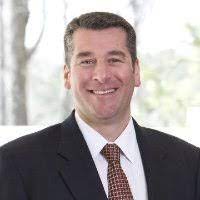
Ron Jordan is the Vice President of Sales at UPS Global Freight Forwarding. Ron has over 30 year’s experience in the international transportation and logistics industry starting with Fritz Companies in 1988. From 1996 through 2003, Ron held various management and business development positions in Europe, residing in London, England and Antwerp, Belgium. He relocated to Hong Kong in 2003 to expand UPS’s growing supply chain business in Asia. In 2010, Ron moved to the UPS Corporate Headquarters in Atlanta, Georgia to develop business relationships with Government and Postal organizations in the international arena. Currently he is responsible for the Global Freight Forwarding business development across the globe. Ron holds a Finance & Accounting degree from Northeastern University in Boston, Massachusetts Connect with Ron on LinkedIn.
